 Sign in
Sign in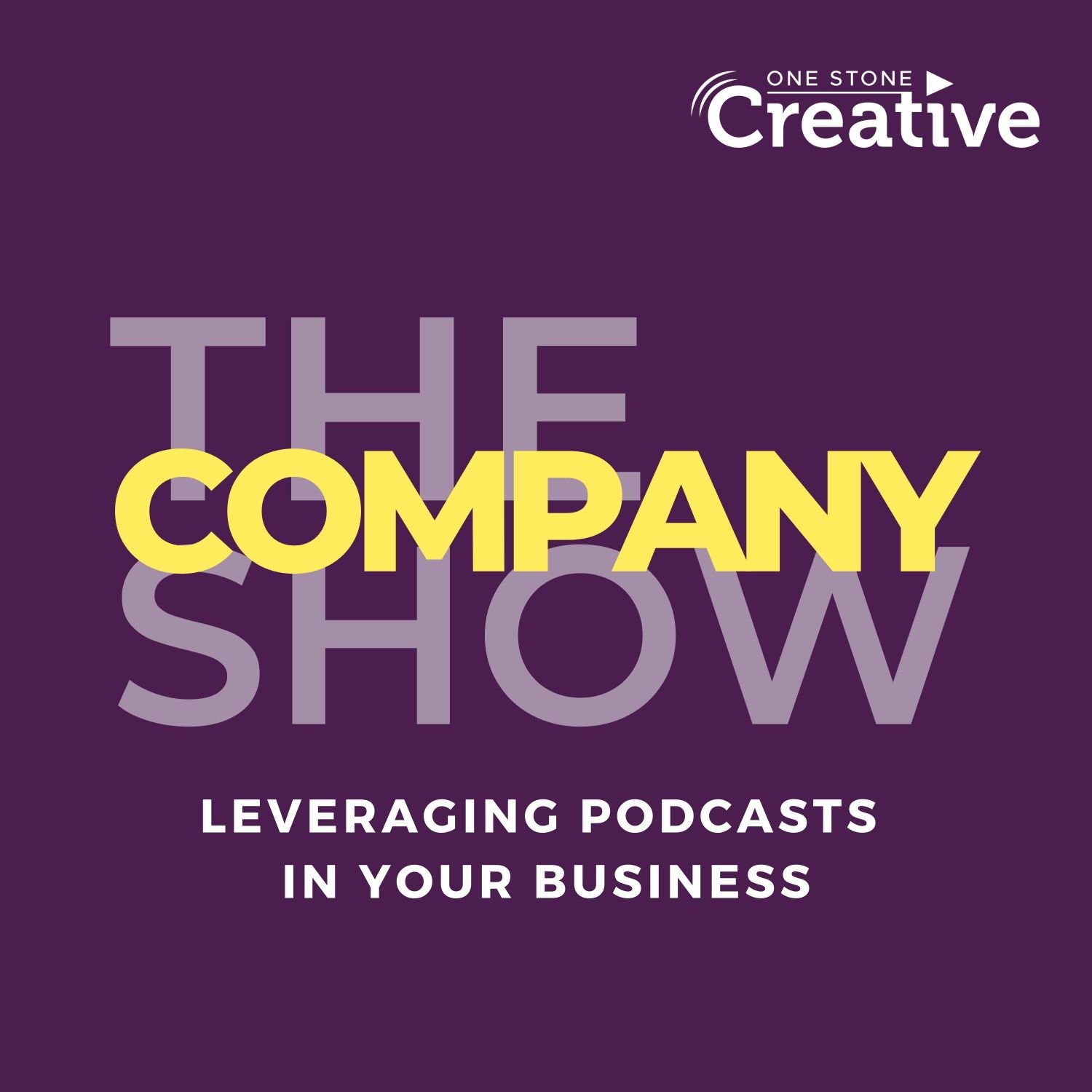
Education
Business
Megan Dougherty
The Company Show is a podcast about running a podcast for your business or company. Podcasting FOR your business or company is different than podcasting as a passion project, or even with your podcast AS a business. You need to meet real organizational goals with a minimum of time and energy, because the podcast is just one part of all that you do. Whether you’re a solopreneur who is running a whole business, or the marketing manager overseeing multiple cross-channel campaigns company podcasts have specific requirements, restrictions and opportunities that hobby, passion and solo-project podcasts just don’t have.
But if you can work out a good system, you can shorten sales cycles, pre-warm leads, meet new partners, increase your brand awareness and authority, and generate weekly (or more!) fresh, dynamic content, all in the course of producing your show. This podcast will help you do that, with answers to every question you’ve got about podcasting, and interviews with different subject matter experts in the content marketing and multi-media industries.
Megan Dougherty is a digital marketer with over a decade of experience consulting and supporting business owners, who co-founded One Stone Creative in 2017 as a podcast production agency for business owners. One Stone Creative helps plan, produce and promote podcast episodes with a high-touch, consultative approach. Every business is different, and so is every business podcast. Over 5 years, and thousands of podcast episodes, we’ve identified the “blueprints” that make a company podcast successful, and are thrilled to be sharing that information with you.
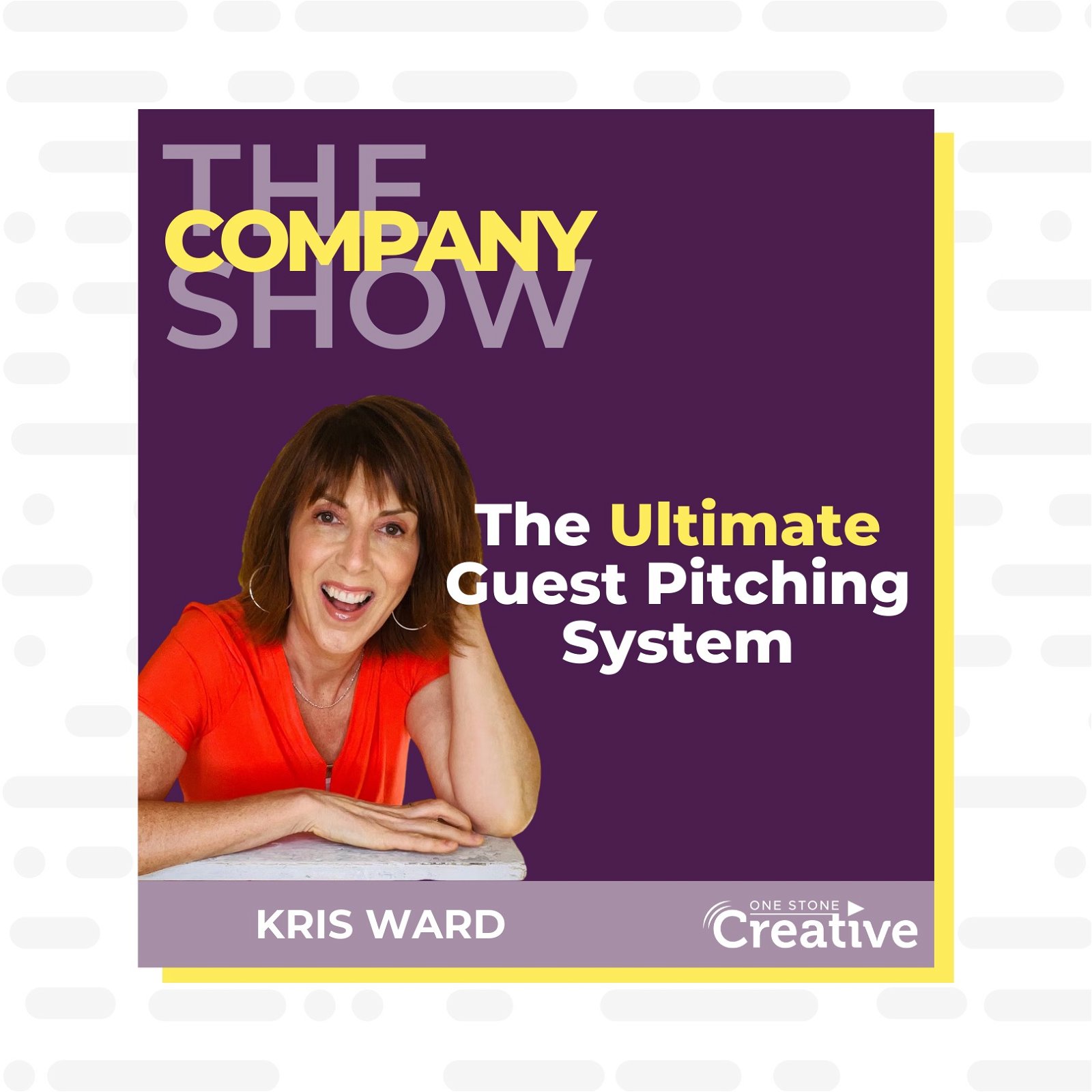
The Ultimate Guest Pitching System with Kris Ward
If you’re struggling with getting podcast hosts to accept you as a guest, this is something that you wouldn’t want to miss!On this episode of The Company Show, we’re joined by Kris Ward—a master in guest pitching (among other things). How is she a master, you ask?She developed a guest pitching strategy with an 80% acceptance rate.Kris Ward is a systems person to her bones and has built a company around helping people build the teams and processes they need to make all areas of their business, including podcasting and podcast pitching, smoother and less time-consuming. She is the author of Win the Hour, Win the Day, and host of a podcast by the same name.If you want to learn and use her strategies for yourself, listen to our conversation, or continue reading the blog post!Tune in to the full episode to learn about:How to streamline and batch your podcast pitchingWorkflow tactics for effective relationship buildingThe right way to grow your network through podcastingPitching and relationship-building mistakes that podcasters makeDon’t forget to join us for our free monthly strategy calls on the third Thursday of every month!Podcast Guest Pitching: An OverviewIt’s no secret that one of the best ways to get listeners to your podcast is to be a guest on other people’s shows. There are a couple of reasons for this:If you’re a guest on someone’s podcast, they’ve already validated that what you have to say will be of interest to their audience.It’s much easier to get a podcast listener to add a new show to their roster than to explain to someone how podcasts work and how to listen to them.But pitching can be time-consuming and sometimes, fraught with rejection, awkwardness, and asks within the process that seem downright unreasonable.Good systems and processes make everything in your business easier - podcasting is no exception, and neither is getting more traction and visibility by appearing on more shows.If you’ve been podcasting for more than a minute, you’ve probably received plenty of pitches. I’d wager most of them have kind of sucked.While there are excellent, high-quality podcast booking agencies (Like Angie Trueblood’s company, The Podwize Group, many PR and other promotional firms offer guest pitching services that amount to no more than a copy-and-paste message emailed to literally every podcast with the right category on Apple or Spotify. They suck, and they’re annoying, and the conversion rates can’t be that good.With that said, here is how you can streamline and batch your podcast pitching process.Kris Ward’s Highly Replicable Guest Pitching StrategyYou or someone on your team researches complementary shows, either by Googling or by following the trail of other podcasts your own guests have been on.You listen to the shows that are of the most interest - at least a couple of episodes, and determine what topic would be a great fit for each one.Write an honest review on Apple or another platform about why you like the show.Record a short video using Loom or your phone, depending on your setup, with the podcaster's name in the frame, and their show on a computer in the background. In the video be sincere about what you liked, why you think you’d be a good fit, and what you’d like to talk about.Send the video to the podcaster via LinkedIn or email.The Advantages of Kris Ward’s Unique Video PitchWhen I received Kris Ward’s video pitch, it immediately struck me as sincere. She had genuinely listened to at least an episode, which is a huge one, since a lot of people skip this step.Kris’s videos are purposeful, well-crafted, and highly curated.Here’s how Kris does the videos:The first thing she does is hold up the host’s name on a tablet. She then goes: So you see, this is not a generic pitch. Here's your name. Obviously, I put effort into this.She also has a computer behind showing their podcast. It implies she was in the middle of listening to it and turned around and did a pitch. The guest is going to be stimulated by the fact that there's your name and there's your picture.Then when the host opens the video, she opens up with something like: What I'm about to say, I think, has a lot of weight to it because I would describe myself as a podcast junkie. And when I tripped across your show… and then she starts listing the things she like about the host’s show.“If you can't find something to like about their show, then don't pitch them. But I believe you can always find something.”She then goes: Listen, I think you and I could have a really meaty conversation that would be of great value to your audience. She then mentions her book, the backstory, and how it would really lean into the host’s bigger messaging.An example is when she’s pitching somebody about a marketing show. The host might think systems and processes and building a team and getting 25 hours back a week aren't about branding or marketing. But Kris tells the host that she can help their people get time back so they can do the marketing that you want to talk to them about on the other shows.In short, Kris leans into the host’s bigger message instead of saying all the things that she could talk about.Kris’s Networking Spreadsheet That You Can ReplicateKris Ward has a spreadsheet called Kris's Network. After the show, whether she’s hosted it or she’s been on it, the person will be added to the network.Now, here are some things that are really important. Kris will put their name, and she’ll put an interesting or fun fact about the person. Her team will then take a picture of the guest/host and put that on the spreadsheet. Because we often forget names, but we remember faces.(This was prompted when Kris had two marketers on her show. Both had red hair, both their names started with M and she got them mixed up.)This spreadsheet has been a game changer for Kris Ward as it allowed her to maintain relationships in a more personal way because of the personalized notes that she has.One way she utilizes the spreadsheet is by going through the whole list and sending the guests/hosts a personalized message about something she remembered about them, or a message of hope or luck for an endeavor that they talked about.4 Mistakes Podcasters Make with Guest Pitching and Relationships1. Spammy referral practicesThere's this whole thing where people refer you to a podcast, and then they ask you for four or five referrals before you even meet them, and then you start getting blitzed. It's insane, it's abusive, it's spammy. Definitely avoid this.Referrals should be done in a very strategic and gentle way. Your awesome guest or host knows other awesome people but you shouldn’t force the connection. But if you do get it, that also strengthens your relationship with them.2. Rotating your relationshipsAfter a new episode, we can become best friends with the host or guest for a week or two. But then another guest comes and we lose touch with the previous person because there was no reason to connect.This is not the way to maintain relationships. You could be losing relationships just by being too busy or occupied. One way to battle this is by using a networking spreadsheet just like Kris’s.3. Being genericPeople put a pitch out and it's so generic because they're trying to cover everything and they're listing all their accomplishments and all the things that they could talk about, which may not fit the show at all.Your personality should always shine and you're not getting any of that from the written page from somebody else. No one wants to read long paragraphs filled with links. A solution to this is Kris’s video pitch method.4. Saying too muchDon’t focus on how great you are and show all your accomplishments. Show the podcast host how your or your knowledge fit into their agenda. The less you say, the more powerful it is.The Philosophy Behind Kris Ward’s SystemsKris believes that your business should support your life, not consume it—and it should be fun. Otherwise, you could have stayed at the job that had better hours or a higher hourly rate because you're not working as many hours you had no overhead.She also talks about the 60-40 rule. We should be in 60% creative mode and 40% admin mode. And we always want to be compressing the work so we can move on to the next creation.That's what an entrepreneur is all about—getting to the next idea and getting that idea into execution. Somebody doing better in business than you is just getting their idea to execution faster. They're not smarter than you, but they're not held up.Kris Ward’s Takes on Podcasting for BusinessWhy podcast?For me, my podcast is a funnel to grow my network, which grows my net worth and to be maintaining relationships and growing my community even if I got no business out of it, which has not been the case.But even if I didn't, now I am connecting with more and more people who have had a significant interaction with me. And as long as I maintain those relationships, it really is unbelievably powerful.The other benefits of podcastingI get free coaching from fascinating people on subjects that maybe I wouldn't even have known, never mind to ask. Like, sometimes I'll learn stuff that I didn't even know I didn't know, and I'm getting it for free. And I'm building a relationship with these people. So my network has grown considerably.What podcast should support your business?I wasn't going to make a podcast that would be about productivity or efficiencies or systems because the people who need that are not going to listen to that. Somebody who's in shape does not listen to fitness hacks and podcasts, and they're in shape.So then we decided to make my podcast anything from sales to social media, that it was really just going to be me talking business. And frankly, what it's turned out to be is the biggest gift to my business ever because we set it up a couple of different ways.ConclusionThe processes don’t stop at the pitch! If your main goal with your podcast is relationship building (as many are), then the pitch is only the first step of many when it comes to creating a strong foundation.As we talk about within the Business Podcast Blueprints, a relationship-building podcast is primarily a vehicle to grow your professional network. Check out our previous episode Metrics that Matter for Company Podcasts, and my conversation with Jason Cercone, all about optimizing your workflows and relationships!There is the invitation itself - and Kris’s strategy is a winner here, then the call, to which you should arrive on time, prepared and ready to promote if it’s relevant to your own audience, and the follow-up.Following up is a place where we often fall down, which Kris points out - relationships take time and effort to become strong, and you should have a system to help keep you on track with them. Kris describes her networking spreadsheet, and Jenny Blake, author of Free Time and Pivot has a wonderful “Keep In Touch” Notion method.After Kris and I recorded our conversation, she surprised and impressed me again with an immediate LinkedIn post announcing the call and that it would be coming out in the future. As a podcast host, the entire process was easy, pleasant, and resulted in the excellent information you’ve listened to today.A++, 10/10 would recommend.Key Quotes“Somebody doing better in business than you is just getting their idea to execution faster. They're not smarter than you, but they're not held up.” - Kris WardResourcesOne Stone Creative | LinkedIn | Twitter | Facebook | InstagramMake sure to check out our free Monthly Strategy Calls!Podcasting for Business Conference 2023Learn about what other business podcasters are doingState of Business Podcasting Report 2022Kris Ward | Website | Podcast | Instagram | LinkedIn | TikTokTake the 30-second Power Entrepreneur Quiz Here!Free Audiobook: Win The Hour, Win The DayKris Ward’s LinkedIn Announcement Strategy!Related:Metrics that Matter for Company PodcastsOptimizing Your Workflows and Relationships with Jason CerconeHow to Pitch Yourself as a Guest with Angie TruebloodBusiness Podcast Blueprint: Choosing the Right Podcast FormatHow to Create Your Own CRM with Alex Sherwood & Jenny BlakeAbout Kris WardAuthor - Podcaster - Coach - Speaker - Team Building And Systems StrategistKris Ward is creating a movement where your business supports your life instead of consuming it. Kris is the founder of the Win The Hour, Win the Day philosophy.After the loss of her husband, Kris returned full-time to her work as a marketing strategist. She was relieved that her business had not only survived her absence but was growing. Now, Kris has completely changed the landscape for entrepreneurs by sharing the successful practices that allowed her absence.Kris has shared the stage with Jack Canfield - Chicken Soup For The Soul, Kevin Harrington original Shark from Shark Tank, James Malinchak -ABC’s Secret Millionaire, Sharon Lechter - Rich Dad Poor Dad Co-Author, and Joe Theismann - NFL All-Star and commentator to name a few. Kris has also been featured on award-winning podcasts, radio, and TV shows.Kris is an acclaimed podcaster. You can hear Kris on her own podcast - Win The Hour Win The Day, where she has engaging conversations with dynamic guests covering a variety of business topics so you can get to your next win now!PFBCon 2023Early bird tickets are still available! Get access to the three-day Podcasting for Business Conference this November for only $147 (regular price: $247).Visit this link to register: https://pfbcon.com/register/The promo ends on September 15th.
26:0031/08/2023
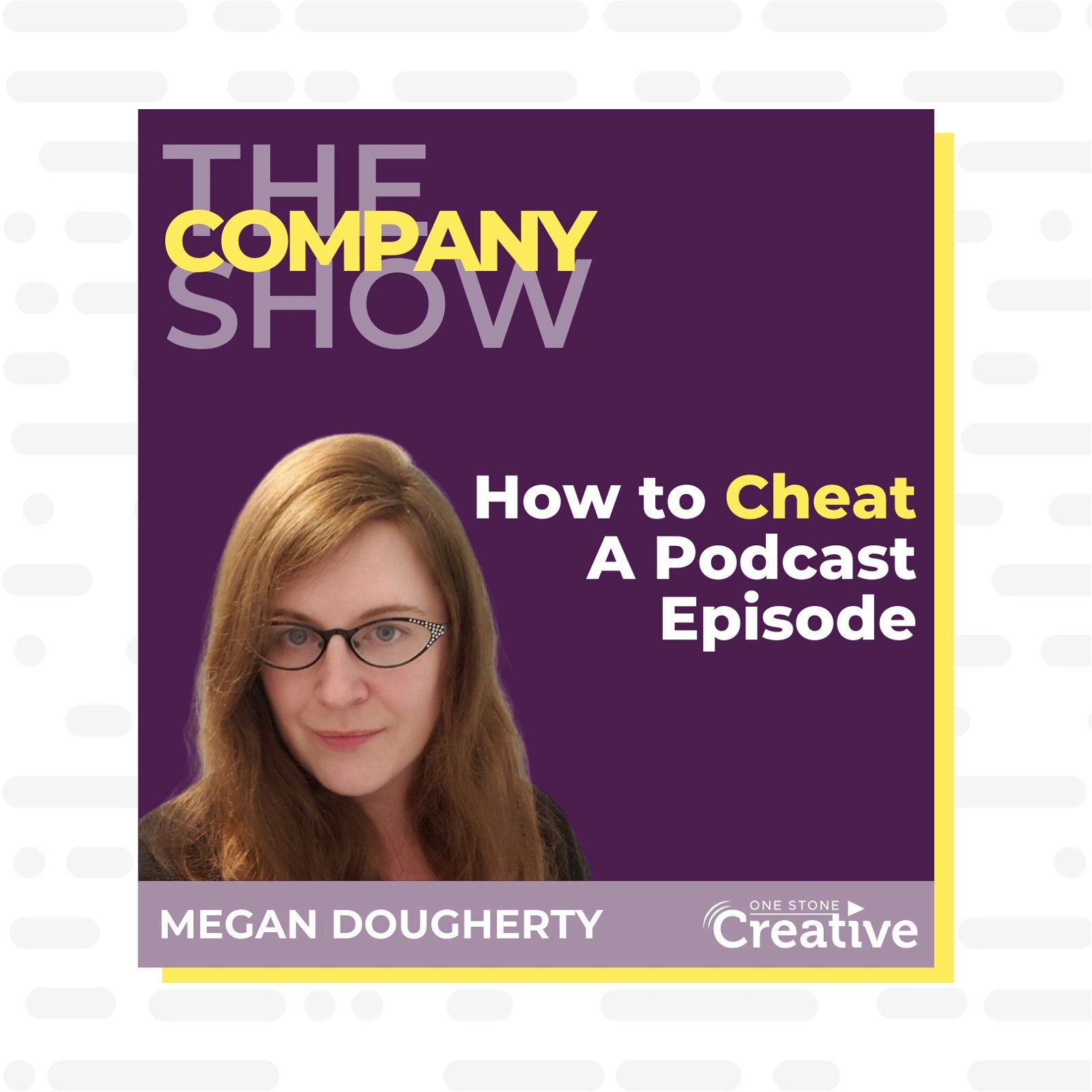
How to Cheat a Podcast Episode
There will be days that you have an episode due to meet your production deadlines, but no guest lined up and no real idea of what to talk about. This is an unenviable position to be in, but we’re all there from time to time.In a perfect world, you’ll have plenty of runway for episodes going into the future by a couple of weeks, or evergreen shows ready to be inserted at the drop of a hat. But we don’t always have them, despite the best of intentions; and it happens to everyone.Join me on The Company Show as we explore the different strategies you can use to make sure that you always have an episode ready to go. (Add this to your cheat sheets!)Listen to the episode or continue reading the blog post.Tune in to learn about:How to prepare for unexpected production woesFour strategies to help you generate an episode topicDon’t forget to join us for our free monthly strategy calls on the third Thursday of every month.How to maintain consistent episode uploadsSo what do you do when a deadline needs to be met and you’re staring at the proverbial blank page with your microphone starting accusingly at you from the boom arm? First, if you are currently a podcast producer who will lecture clients at length about the importance of runway and backup episodes you give yourself a bit of a stern talking to.Here’s how that conversation might sound:There are always going to be things that go catawampus. Guests can cancel last minute, you can lose power in a storm, and work emergencies can crop up. The list goes on and on, and eventually one or more of these things will happen, possibly all at the same time.But if it is at all possible, you need to maintain your release schedule. As Tom Fox from the Compliance Podcast Network says:Your podcast is a promise to your audience, when you say you’re going to release, you must do so.The best way to be prepared for the unexpected is to prepare for the unexpected! You do this by creating a recording runway, where you’re recording episodes now that are going to be released a few weeks in the future and that gives your whole workflow wiggle room.The next best thing to do - and ideally this is in addition to recording with a runway - is to have a couple of evergreen episodes you’ve recorded in advance that can be slotted into the calendar if you ever need a last-minute episode. You want to make sure they really are evergreen and don’t make reference to things that are happening in your business or the news that will be out of date if you end up using the episode 6 months from now.Finally, you want to have a list of episode ideas, or really good friends that can be tapped if you ever find yourself on recording day without anything to say. You should keep a running list of episode possibilities in your episode guide that you can deploy as needed.All sounds very simple and sensible, doesn’t it? It sure does, and it is—but it’s not always going to happen. Like it did to me on the date of recording of this podcast episode. I told you it happens to everyone.4 ways to generate podcast episode topicsSince the show must go on, here are ways to get out an episode even if you’re not sure exactly what to talk about.1. Ask someone for an ideaIf you have coworkers or a cohost, they’re your first and best bet. When I was thinking glumly about the big “record The Company Show episode” on my list of to-dos for the day, I was feeling utterly uninspired, and more than a little irritated with myself. So I sent a Slack message to my friend and business partner, the inimitable Audra Casino explaining my plight.She hit back immediately with:Do an episode on how to cheat an episode when you don’t have any ideas.Your colleagues and partners will have the subject matter expertise to have topic ideas kicking around and can let you know what THEY would like to hear on the show. This can be a great way to jump-start your motivation.If you don’t have someone on your team or in your network you can ask on zero notice, then you can ask Chat GPT! You might want to prompt it with something like: ”Can you suggest 15 episode ideas for a podcast about widget manufacturing?” or “What are 10 questions business owners might ask before starting a podcast.”The AI can be a great assistant and get rid of that blank page paralysis that causes so much difficulty in creating content.2. Revisit an old episodeIf you’ve been podcasting for a while, you’ve probably recorded a few that could use an update. I did this a few weeks ago with our episode Leveraging a Podcast in Your Business, which was an update to one of the very first episodes we’d ever released on the show.I’d say it’s good practice to spend a little time with your episode archive every year to see what you’d like to update, expand on, or correct, if things have changed. A gap in the editorial calendar is a great time to do it.3. Seek Inspiration from other podcasters in your spaceYou’re probably not the only company podcasting about what you’re podcasting about, so if you’re scrambling for an idea see what your fellows are talking about.You don’t want to replicate their content by any means, but you might find topics you have your own opinion on, ideas you want to respond to, or just get inspired by the good work other people in your industry are doing. And it never hurts to give credit in these instances.4. Search your inbox or your social media channelsLook for questions that people in your industry are asking about your industry. If you’ve got a sales or customer support team, they can be great to tap into for this too.If someone cares about an issue enough to make a post about it, they probably aren’t the only one, and it could become part of your own question-and-answer library that you can have on hand when it comes up again in the future.Between these four ideas, you should be able to get an episode out the door in short order. And once you do, do what I’m about to do, and record an additional episode that you can pop into the bank and pull out next time the inevitable happens.Key Quotes"You’re probably not the only company podcasting about what you’re podcasting about, so if you’re scrambling for an idea see what your fellows are talking about.” - Megan DoughertyResourcesOne Stone Creative | LinkedIn | Twitter | Facebook | InstagramMake sure to check out our free Monthly Strategy Calls!About Megan DoughertyMegan Dougherty is the Co-Founder of One Stone Creative. She has been a digital marketer for over a decade, with a strong focus on digital course creation, content marketing, and multimedia content production. As the co-founder, she takes pride in high-quality, on-time work and helping people get their messages to the people who need to hear them.She likes spreadsheets, deadlines, and creating online experiences that are good for both the creators and the end-users. She hates jumping out of airplanes, mushrooms, and hyperbolic language in messaging. When not helping to produce podcasts, courses, and videos, she bakes pies and watches Star Trek. (Janeway forever.)Find her on LinkedIn!Related Episodes and Media:Is My Podcast Topic Too Saturated?Will AI Replace Writers? with Karl SonaPFBCon 2023We’re starting to get ready for this year’s Podcasting for Business Conference, and we’re currently looking for speakers! Go to PFBCon.com and click on “Become a Speaker” to share your idea! It’s happening this November, all online.
05:3017/08/2023
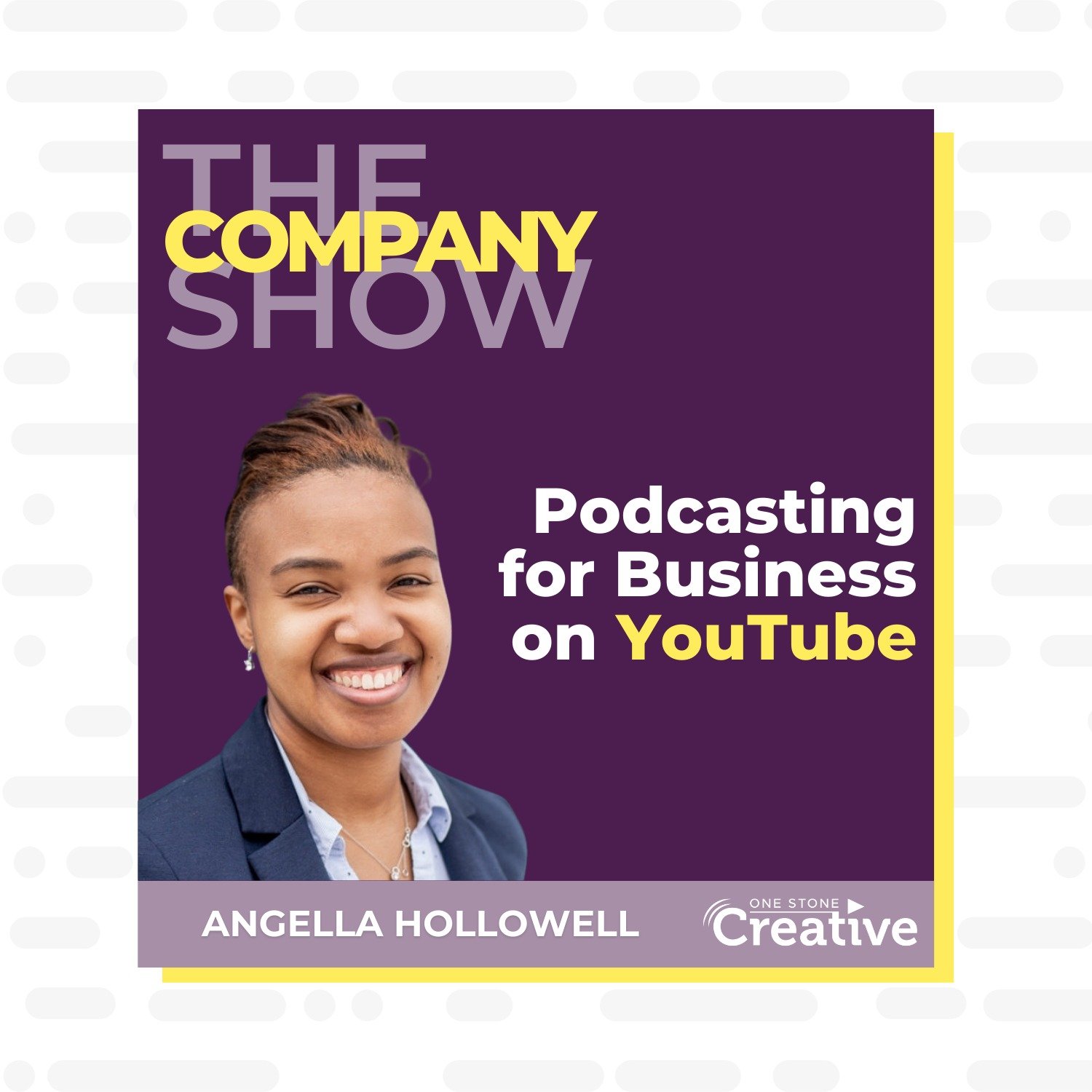
Podcasting for Business on YouTube
Something that we know from the State of Business Podcasting Report is that the vast majority of business podcasts post their episodes to YouTube, and most do live-action videos. One of the reasons?YouTube has a powerful and effective discovery algorithm - something that no audio-based platform has been able to replicate.Podcasts can now be found, in most countries, as a part of YouTube Music, and they are currently testing the ability to upload podcasts via RSS feed. Now that YouTube is starting to add real podcast muscle to its platform, as a company podcaster, you would be remiss not to use it.Happily, there are many video experts who are extremely generous with their knowledge and insight. One of them, Angela Hollowell, is the creator of Honey and Hustle, a video-first podcast and founder of Rootful Media, a digital media production company focused on photography, video production, and digital content creation for purpose-driven visual storytelling.In this episode, Angela gives a closer look into the preparation and workflow differences between an audio and video podcast. She also shares systems that you can apply to your own workflow and the different apps that you can use to streamline the process.Aside from the potential increase in profits, video podcasting has other unique benefits that it can give you and your business. If you’re interested in that, definitely don’t miss this episode.Listen to our conversation below, or continue reading the blog post!Tune in to the full episode to learn about:Reasons why you might want to do a video podcastThe differences in the preparation, production, and the recording processSystems and technology that you can use to streamline the processThe ways your video podcast can support your businessHow your podcast can impact new shows or business ideasThe hidden benefits and opportunities of video podcastingDon’t forget to join us for our free monthly strategy calls on the third Thursday of every month!YouTube vs audio podcasts: A peak into the differencesDoing a video podcast might mean more work and resources spent, but the potential benefits can make it a worthwhile endeavor. Not to say that audio is inferior, as always, it depends on your goals and current capacity.Want to see if a YouTube podcast is for you? Continue reading!YouTube podcasts are easier to findYouTube has a powerful and effective discovery algorithm. This is something that no audio-based platform has been able to replicate or even really come close to yet. This, combined with its engaging nature, larger audience, and effective search engine makes Google’s video platform a podcasting powerhouse.Optimal organizationAnother thing to keep in mind is the power of YouTube channels for organizing your content and creating a convenient experience for your viewers.Their playlists are the mechanism. This is done on YouTube, and they are basically categories of content that creators can make on their channel. For example, organizing all of their episodes or all of their reviews, or all highlights into a single playlist. That can make it easy for people to navigate and consume a whole bunch of your content, one right after the other.The visual aspect makes it more compellingWith YouTube podcasts, you get to know a person beyond their voice. You see their mannerisms, the way they present themselves, and how comfortable they are. You get to see what their face looks like when they're thinking, amused, or when they're being clever.This is not to say the audio doesn't matter. It definitely does. If you're solely a person that likes to gain information, absolutely, audio podcasts are the way to go. But for people who like to gain information, but also like to gain inspiration and a deeper sense of engagement, video podcasts win.Which is easier?People would think audio would be easier, but when Angela started podcasting, she was still a filmmaker and was already doing video professionally for clients. And so for her, doing a video podcast was just a natural extension of the work that I was already doing.If you’re already in a visual field or comfortable with being on camera, always consider a video podcast!Do guests find video podcasts harder?According to Angela, not really. She’s pretty straight up in saying that it is a video podcast. When recording in person, she gives out tips like:“I'll be giving you a lav mic. It's going to clip onto your clothes. So try not to wear anything that makes too much noise. So like really long dangly earrings, dangly necklaces.”Try to prep people, have systems in place, and always send them reminders. It’s also your duty to help your guest make sure that they show up at their best on camera.The systems and apps that you can useThere are certain tasks in your business that you do repeatedly all the time. And if you're doing it repeatedly, there's a chance that you can automate those steps so that instead of you spending time writing the same email 20,000 times, you can be doing something else. Something else that makes you money.SavvyCal - for automated scHere are some of the tools that Angela uses:hedulingZapier - make your apps talk to each other and create a robust automated systemAirtable - for episode guidesTypefully - social media schedulingBONUS: Angela’s tips for a great video interviewHow to give guests a unique experienceYou don't want guests to feel like they're regurgitating answers from previous interviews with other people. You want them to feel like this is something that is unique to them and that is unique to their story.The best videos happen in pre-production. 90% of a good interview happens in the planning phase. So definitely allot time for good preparation and good research. Find out which questions have been asked before and .look for different angles The other half is knowing when and how to be vulnerable and how to share stories of your own that leave space for people to feel comfortable in whatever capacity, sharing stories that are similar.How to make a guest comfortableFor Angela, she always asks people a fact-based question first.How did the business get started?Why this business? Why this lane?Why do you do this specifically?When you start off asking someone you don't know that well, something that's a little more emotionally based might not get them to open up as much. They're probably not going to be as comfortable, and it's going to set the tone for the rest of the interview.The benefits beyond profitAngela noticed that linking her podcast to her email signature would make people reach out to her. They have seen an episode with someone they love, trust, or worked with in the past, which prompts them to engage.Just by the power of positive association, she was getting this unofficial co-sign for people who are reaching out to her for work and inquiries, which helped the video and photography production side of her business.Key Quotes“You're going to have a different guest every episode, but you are the only constant. So the people that are listening to this also kind of want to feel like they know you as well, and they know certain parts of your story.” - Angela Hollowell“A lot of friction comes from miscommunication or just a lack of communication. That comes from not treating podcasting like a business and not understanding that your guest experience if you are doing an interview-based podcast, is just as important as a listener experience.” - Angela HollowellResourcesOne Stone Creative | LinkedIn | Twitter | Facebook | InstagramMake sure to check out our free Monthly Strategy Calls!About Angela HollowellAngela is the founder of Rootful Media, a digital media production company focused on photography, video production, and digital content creation for purpose-driven visual storytelling. Rootful Media is driven to create and share stories with diversity, inclusion, compassion, and sustainability at their core. Angela is also the host of the video podcasts Honey & Hustle and Creative Architects by Castos. Through storytelling interviews, she talks with founders and creators about their personal journeys as entrepreneurs and experiences in the creator economy.Through documentary photography and filmmaking, she works to create a digital space highlighting the unique lifestyle, challenges, and moments in the American South and beyond. From the food we eat to the land we live on, our culture is heavily intertwined with our history and our humanity. As a storyteller and human rights advocate, Angela weaves together the narratives of individuals, nonprofits, and organizations from script to screen to amplify the voices of people in our communities.Twitter | LinkedIn | YouTubeRelated Episodes and Media:Video Podcasts: Reflections and DecisionsThe Video Advantage for SEO with Atiba De SouzaShould Company Podcasts be Company Vlogs? An Audio vs. Video ShowdownPFBCon 2023We’re starting to get ready for this year’s Podcasting for Business Conference, and we’re currently looking for speakers! Go to PFBCon.com and click on “Become a Speaker” to share your idea! It’s happening this November, all online.
31:1003/08/2023
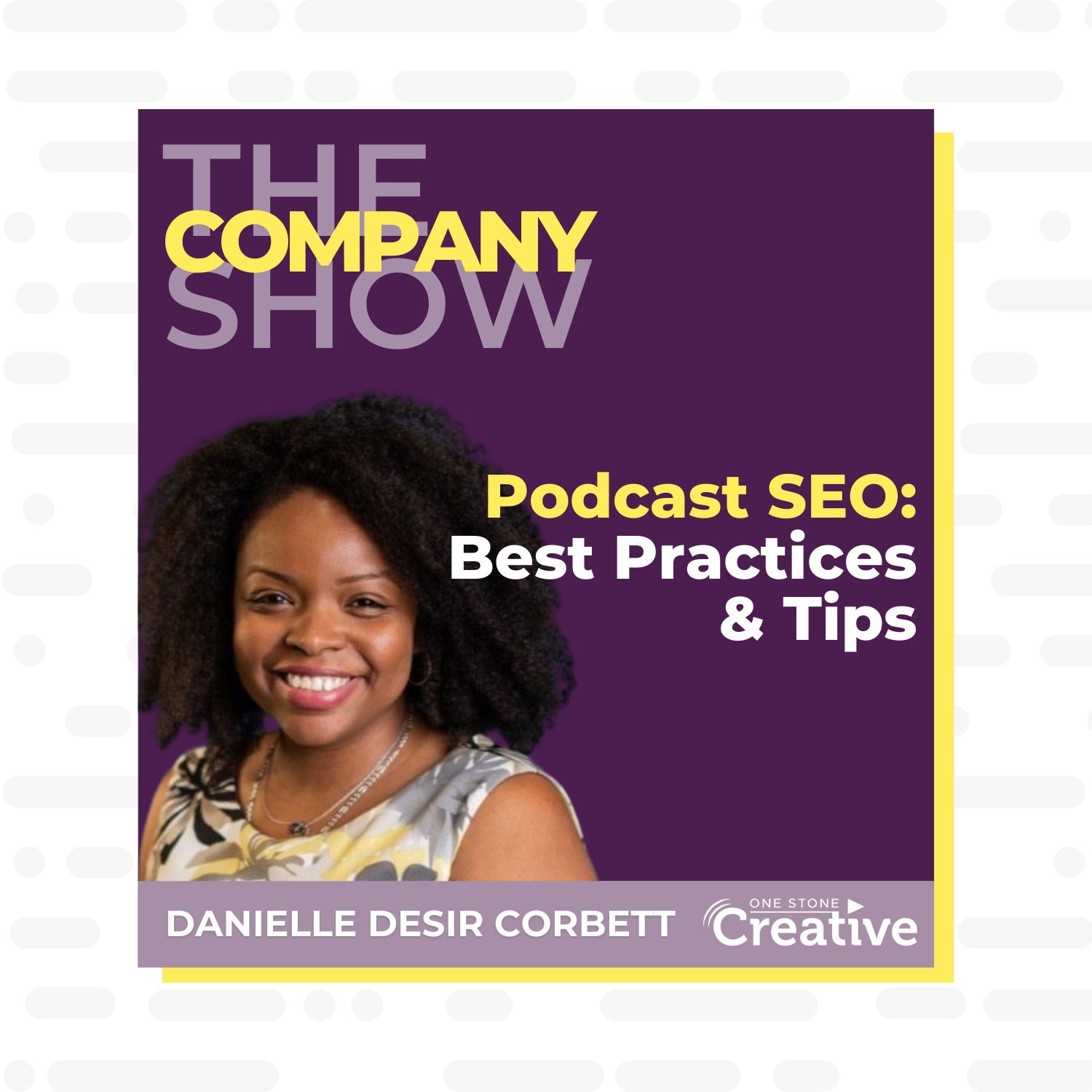
Podcast SEO: Best Practices & Tips from Danielle Desir Corbett
A really solid Search Engine Optimization strategy for podcast show notes can easily be pushed to the back burner within a marketing strategy. Sometimes they’re an afterthought, sometimes they’re on the perpetual to-do list, and sometimes they’re not really considered at all.Personally, I’ll confess that my intentions around show notes optimization often exceeds the bandwidth we can devote to the project. But after today’s conversation on The Company Show, I am prepared to mend my ways.Today’s guest, Danielle Desir Corbett is someone who does show notes really, really well. A podcaster, podcast marketing coach, and SEO Expert, she delivered one of the most popular presentations at last year’s Podcasting for Business Conference—optimizing your podcast show notes for maximum discoverability.In this episode, Danielle talks about her strategies for optimization and the benefits that she and her clients have seen by making it a priority on websites. She shares how to balance creativity and technical accuracy, how to conduct and deploy your keyword research, and why it’s absolutely critical to have each episode on its own page within your website.As always happens after a conversation with Danielle, I’m wild to get into my content archive and update it, and improve our workflows going forward—and I think you will be too.Listen to our conversation below, or continue reading the blog post!Tune in to the full episode to learn about:Why SEO is so important for podcastersWhy so many people don't pay enough attention to search rankingsHow prioritizing SEO can impact your podcastShould you start with a topic or with a keyword when planning a new episode?An SEO workflow that you can use to optimize your episodesLow-hanging fruits of SEO show notes optimizationSEO metrics that you should trackDon’t forget to join us for our free monthly strategy calls on the third Thursday of every month!8 EASY Ways to Boost Your Rankings TODAYHere are the best practices and tips from Danielle—now and add the most value to your show notes while spending the least amount of time and effort!Audit and change titlesEnsure your titles are clear, compelling, and contain relevant keywords. If any of these elements are missing, consider revising them. Optimizing your episode titles is an effective way to boost downloads. Danielle recommends doing this annually by reviewing your archives and assessing whether each title still meets the mark.Use your questions as bullet pointsWhen creating an episode, utilize keyword research and question analysis to develop your content. Copy and paste the questions you've identified into bullet points under the "In this episode, we discuss" section. These bullet points will serve as headers and paragraphs in your show notes, outlining the tips and topics covered. Proper preparation is crucial as it provides you with ready-made content for your show notes, making it easy to plug and play.Insert links to YouTube VideosTo enhance your search visibility, consider creating a video for each episode of your podcast and include the YouTube link in your show notes. Google prioritizes pages with videos, particularly those from YouTube. Adding a YouTube video, which can be automatically generated by your podcast hosting platform, to every show notes page is an effective way to improve search friendliness and increase your online presence.Embed the podcast player lower on the pageEmbed the podcast player in the second or third paragraph of your show notes. Search engines like Google prioritize understanding the page's content through the title and initial paragraph. If the first paragraph is filled with HTML code or unrelated text, you’re already losing the mark.Start by optimizing your top-performing episodesIf you're ready to dive into SEO, you have two options: update your entire archive or focus on optimizing your top-performing episodes. It's not necessary to tackle everything at once, as it can be overwhelming.Take notes on what you've learned today, identify your top five or ten episodes, optimize them, and then proceed with this strategy. Don't feel pressured to do it all at once. It's more approachable and understandable to take a gradual approach, especially for people who prefer not to complete everything at once.Always link to other pagesA must-have for your website is a blog post or show notes page that includes links to all the episode-related content. As business owners, we aim to drive traffic to our website and cater to both Google searchers and our listeners seeking extra material. Therefore, it is essential to have the keyword in the title of the blog post, as well as sprinkled throughout the show notes, particularly in the first paragraph.Danielle’s SEO WorkflowHer personal strategy involves embracing creativity and focusing on topics that resonate with her audience, then refining the SEO strategy afterward.Here are the steps that you can emulate for your show!Start by choosing a topic or finding interesting individuals with valuable stories to share.Once you have a topic, create bullet points of questions or talking points.While doing step #2, conduct soft keyword research, mainly focusing on incorporating relevant keywords into the episode.After recording the episode, write the show notes and blog posts, and conduct more thorough keyword research to optimize the content.While some bloggers prioritize keyword research first, Danielle believes that podcast listeners appreciate nuanced content that goes beyond simple how-tos. It can include different perspectives, explorations, and even lightheartedness.Don’t (always) copy the larger shows!In the annual State of Business Podcasting Report, we consistently discover that many of the top 100 business shows have minimal show notes, often just a sentence or two, or even no associated website. Considering the value that comes from investing time and effort into both written and audio content, it's surprising to see this trend.According to Danielle, one possible reason behind this trend is that larger shows with a substantial following can afford to overlook detailed show notes. Meanwhile, smaller shows don't have that luxury.Google receives millions of daily searches, making it a valuable source of traffic for our ecosystem. For small business owners with limited resources, there are methods available for long-term discovery and visibility.Show notes have the advantage of being a one-time effort, although it can be time-consuming. Nonetheless, even show notes from years ago can continue driving daily traffic and affiliate sales. This long-lasting impact is undeniably powerful.Key Quotes“For the rest of us, it's really important for us to pull on levers that allow us to market our podcast for the long term so that people can find us and that we can achieve all the goals that we have related to our show.” - Danielle Desir CorbettResourcesOne Stone Creative | LinkedIn | Twitter | Facebook | InstagramMake sure to check out our free Monthly Strategy Calls!About Danielle Desir CorbettPodcasting since 2018, Danielle Desir Corbett is a podcast marketing coach and host of the top-rated 4x grant-funded affordable luxury travel and personal finance podcast and blog, The Thought Card. She has been a guest on nearly 200 podcasts and is a sought-after speaker at popular podcasting conferences such as Podcast Movement, She Podcasts LIVE, Podfest, and more.As the founder of WOC Podcasters (Women of Color), Danielle is passionate about connecting Women of Color podcasting creatives and professionals to resources and opportunities that will empower their podcasting journey.Podcast Coaching with Danielle Desir Corbett | Instagram | TwitterRelated Episodes and Media:The Video Advantage for SEO with Atiba De SouzaWrite Better Podcast Episode Titles WorkshopPFBCon 2023We’re starting to get ready for this year’s Podcasting for Business Conference, and we’re currently looking for speakers! Go to PFBCon.com and click on “Become a Speaker” to share your idea! It’s happening this November, all online.
28:2720/07/2023
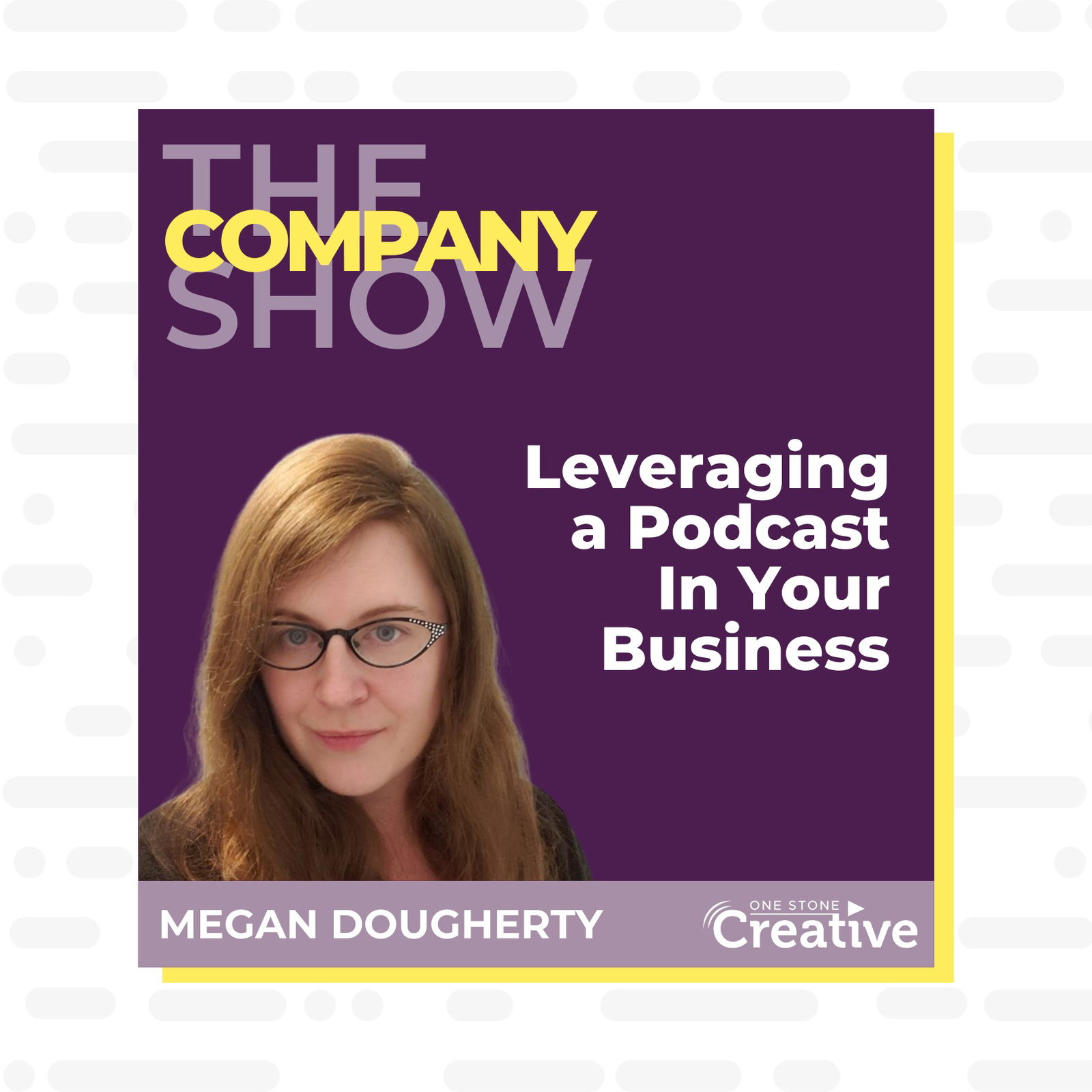
Leveraging a Podcast In Your Business
In 2021, we developed the Business Podcast Blueprints: four high-level podcast archetypes that inform the different strategic decisions that need to be made about a new show.Thought LeadershipAudience EngagementRelationship BuildingContentIn this episode, we’ll revisit the different blueprints and the ways you can leverage those types of podcasts in your company. We’re going deep into what metrics you can measure, how you can track them, and how you should optimize your show to reach your specific business goals.Whether you’re starting a new show or you already have one, these blueprints will help your podcast become focused, highly trackable, and primed for success.Tune in to learn about:The four Business Podcast Blueprints: The Benefits and the MetricsHow to optimize your podcast content for specific objectivesTracking and measuring your podcast metricsDefining the key success metrics for your podcastsThank you for joining us on this episode of The Company Show. Stay tuned for the next one!Don’t forget to join us for our free monthly strategy calls on the third Thursday of every month.Key Quotes"It's important to think about your key success metrics now, so you can start refining your podcast content and promotional work to prioritize them.”"Every episode can be a blog post with rich, optimized content on it—that’s giving you content on two channels for practically the price of one."ResourcesOne Stone Creative | LinkedIn | Twitter | Facebook | InstagramMake sure to check out our free Monthly Strategy Calls!Related Episodes:Why Even Podcast?Business Podcast StrategyMetrics that Matter for Company PodcastsHow to Choose Your Podcast Content (And Format, Assets, and Marketing)
14:2106/07/2023
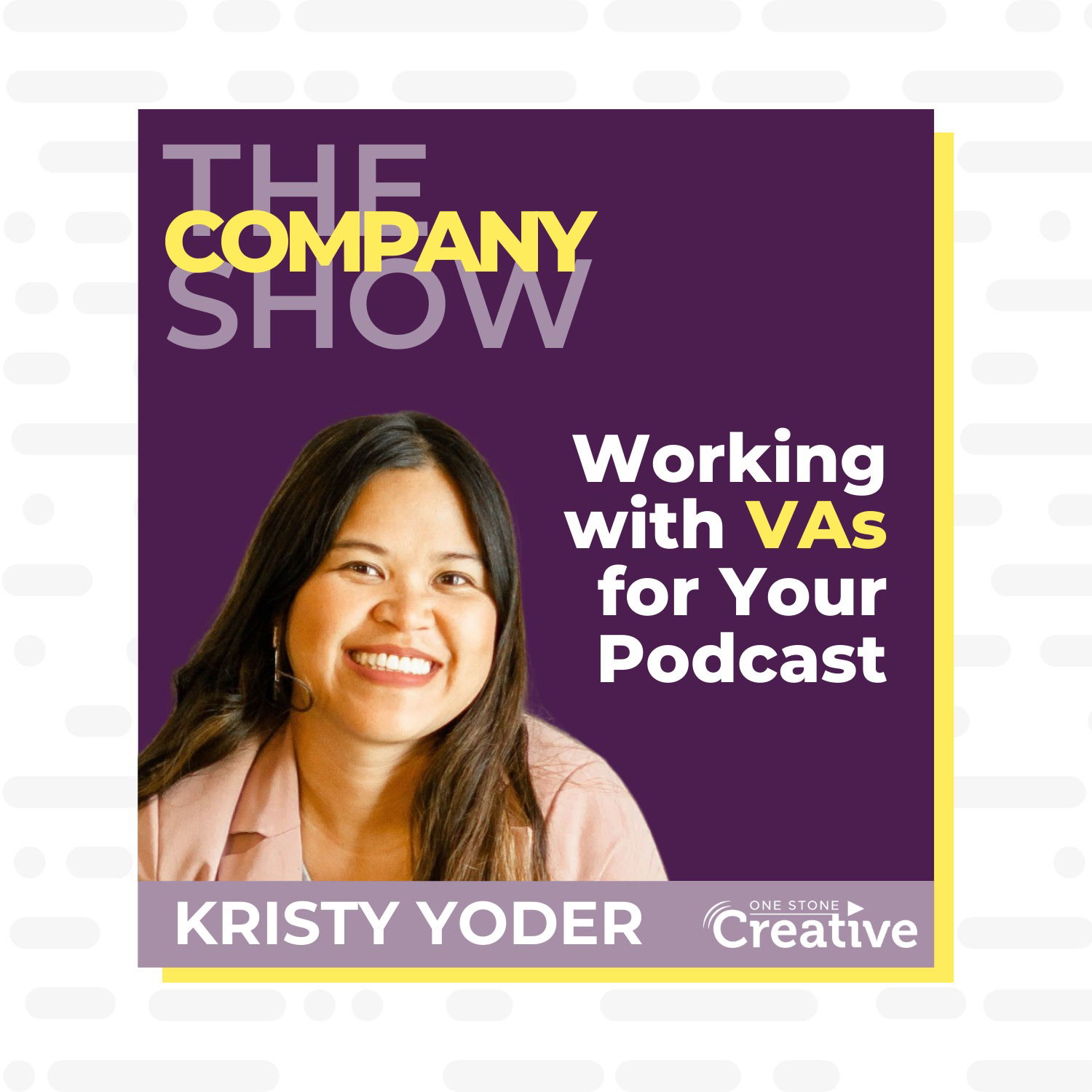
Working with VAs for Your Podcast
Podcasting for business involves a lot of tasks, information, and assets—requiring coordination with guests and team members. While it may be tempting to do everything on your own, it's not efficient or practical.And when you find that existing team members can't handle certain tasks, outsourcing to third-party service providers, such as virtual assistants (VAs) or production houses, should be at the top of your list of things to consider.To help you navigate the exciting world of outsourcing, Kristy Yoder, the founder, and CEO of Smart VAs and host of the Master Delegator Podcast, joins us for an episode! Get ready for an in-depth exploration of task delegation and learn when you should start delegating podcast elements, what you should probably hand over, and how to ensure you’re doing it as efficiently as possible.Consider this episode your definitive guide!Tune in to learn about:How to optimize and automate your internal podcast production processesEffective podcast planning and task delegation strategiesHow to outsource tasks for podcast creation and things to considerThe different hiring options for podcast productionHow to maximize productivity through delegationThe value of delegating email tasks for podcastersThank you for joining us on this episode of The Company Show. Stay tuned for the next one!Don’t forget to join us for our free monthly strategy calls on the third Thursday of every month.Key Quotes“If you want to save money and lower your overhead costs, I recommend that you hire a virtual assistant and try it first before considering hiring an in-house person.” - Kristy Yoder“The better defined the task is and the better the steps you have for it, the easier it's going to be to outsource.” - Megan DoughertyResourcesOne Stone Creative | LinkedIn | Twitter | Facebook | InstagramMake sure to check out our free Monthly Strategy Calls!Kristy Yoder | LinkedIn | Instagram | Website | PodcastRelated Video:Megan Dougherty's Proven Strategies for Building and Managing a Successful Team
26:2622/06/2023
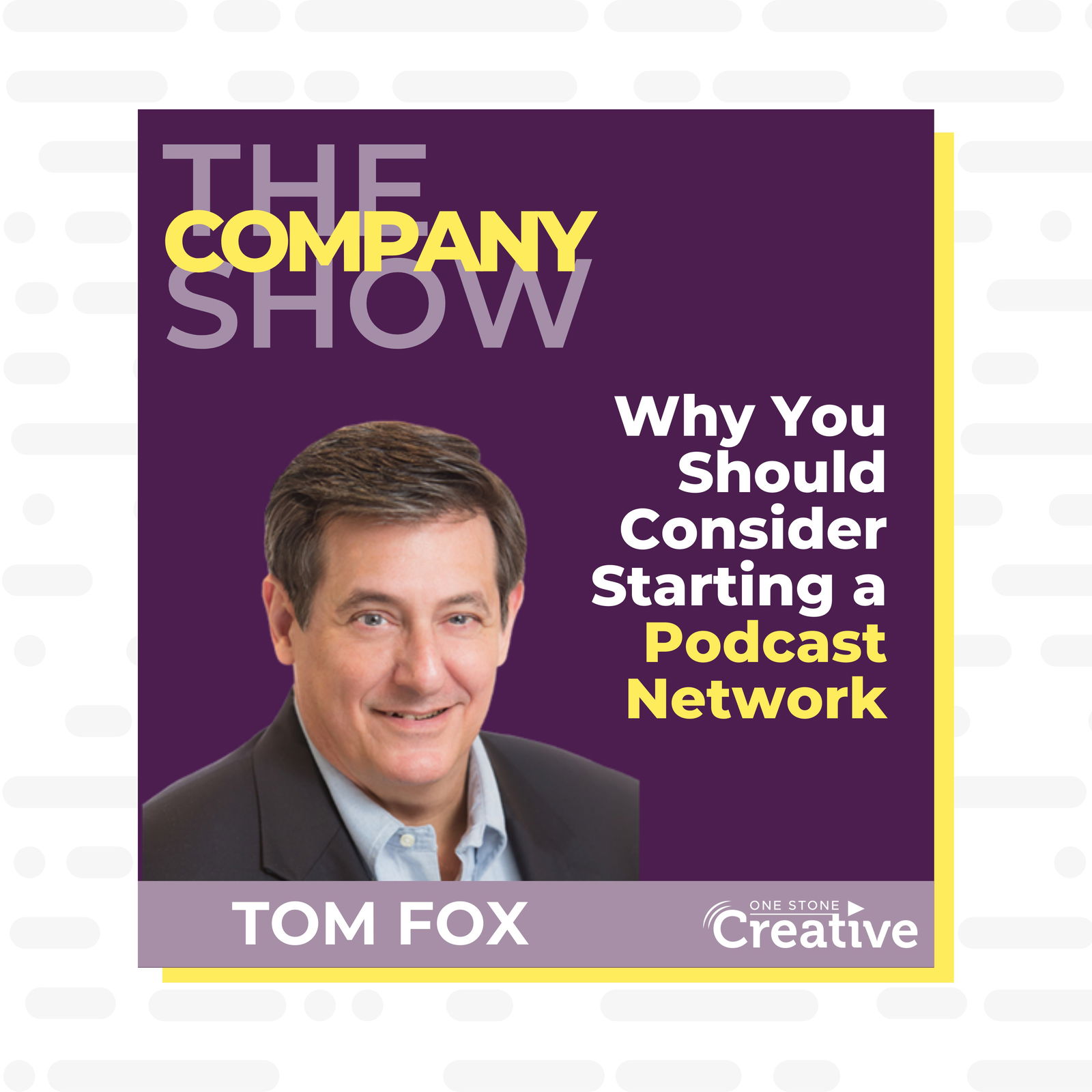
Why You Should Consider Starting a Podcast Network
Why You Should Consider Starting a Podcast NetworkThere are many strategies you can employ to increase the reach of your show—cross promotions, episode swaps, paid traffic and ads, guest posting, being a podcast guest etc. But if you’re serious about growth and up for the challenge, going from a single show to a network can dramatically expand your reach.On this week’s episode, The Compliance Evangelist, Tom Fox returns to answer the question: “Should you start your own podcast network?”We cover all the benefits, strategies, and technicalities you should know. As the founder of the Compliance Podcast Network and the Texas Hill Country Podcast Network, Tom brings exciting insights into the challenges he faced and the successes he achieved.If you’re considering creating your own network (or joining one), this is an episode that you shouldn’t miss!Tune in to learn about:The benefits of having a podcast networkThe strategy and considerations for topic-based and geographically-based networksThe importance of choosing the right type of network based on the type of business the podcast supportsMaximizing local business success through niche marketingThe origin story and growth of the Compliance Podcast Network and the Rural Podcasters NetworkChallenges faced in the early days of starting the networkMonetization methods for podcast networksThank you for joining us on this episode of The Company Show. Stay tuned for the next one with Kristy Yoder, the founder and CEO of Smart VAs. We’re talking about delegating to an external third-party service provider to help you grow your show. Don’t forget to join us for our monthly strategy calls on the third Thursday of every month at OneStoneCreative.net/strategy-calls.
20:2808/06/2023

Learning From Experts
There are a lot of really, really smart people in this industry and I rarely have an interview that I don’t learn something from. The single biggest benefit of having a podcast, in my opinion, is getting to know more of them.Join me in the first official episode of the newly rebranded The Company Show (formerly The Business Podcast Blueprint Show), as I reflect on valuable lessons learned from industry experts from our previous season and our monthly strategy and networking calls.Tune in to hear insights on:The importance of having a process to connect and engage with guests between interviews.The power of video SEO and why it should be prioritized alongside on-page SEO.How social audio can have a significant impact on business.Planning and conceiving effective podcast ads before recording is crucial.The value of collaborating with others, and guesting on other shows within the podcasting community.The importance of investing in top-quality audio and sending guests gifts like headsets to help improve audio quality and build relationships.Creating a great podcast as a marketing activity, going beyond just getting the show out there.Tips on optimizing social media reach by mastering algorithms with consistency, engagement, and relevant keywords.Networking calls and one-on-one networking opportunities can provide valuable insights and connections in the podcasting industry.Thank you for joining me on the very first episode of The Company Show. Stay tuned for the next episode with longtime friend, Tom Fox, where we’ll answer the question: should you have a podcast network? Don’t forget to join us for our monthly strategy calls on the third Thursday of every month at OneStoneCreative.net/strategy-calls.
13:1625/05/2023

Introducing The Company Show
Welcome to a new phase in the life of this podcast. Up until now, we’ve been the "Business Podcast Blueprint Show." And the business podcast blueprints are an important part of how we think about and help people achieve, effective podcasting. They represent the key high level archetypes for company podcasts - the prime directives that inform all of the other strategic decisions: Thought Leadership, Audience Engagement, Relationship Building and Content.Those are still very important, and we’re still going to be talking about them a lot.What the business podcast blueprints lack in terms of a name is being sticky, and immediately comprehensible. Sticky, when it comes to podcast names, means easy to remember and to say. Immediately comprehensible, pretty obviously, means it doesn’t need to be explained. To try and bridge these gaps a little, I’m delighted to introduce our new name: "The Company Show".The name, and the art, are changing, and we’re going to continue experimenting and exploring different formats - more case studies, more instruction, more commentary, and at least for the next season, more regular releases, with an every-other week schedule.I welcome you to this new iteration of our podcast, and encourage you to listen and to share it!
05:2619/05/2023
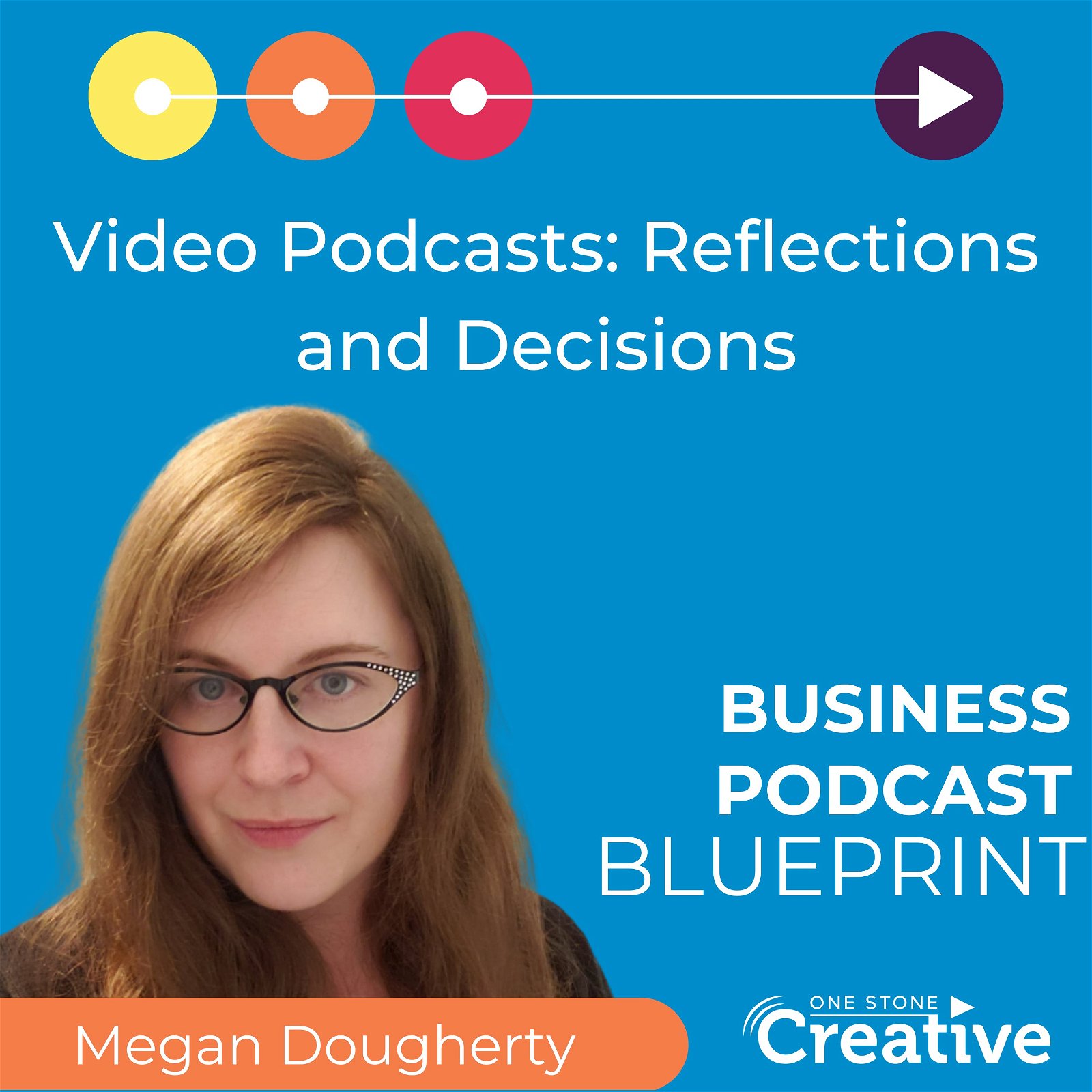
Video Podcasts: Reflections and Decisions
As I reflect on the first-ever video season of the Business Podcast Blueprint Show, I'm convinced that video really is the future of podcasting. This season, we've explored the value and importance of video with the foremost experts in the field. After experiencing the mental and time burden that video production adds to the process, however, I've come to the realization that video podcasting may not be for me. In this season finale episode, I'd like to share my insights on the pros and cons of video podcasting and why I won't be doing another video season.
Tune in to hear me discuss:
While video podcasts are on the rise, it's important to consider your personal circumstances and preferences when deciding whether to make one.
Hosting a video podcast adds a mental burden to the production process, as you have to pay attention to details like lighting, clothing, and makeup.
Video is great for promotional content.
96% of the top 100 podcasts have YouTube channels. 69% upload full episodes on YouTube.
The investment you can make in video production is an important consideration, especially since many of us don't have access to studios or videographers.
The time investment required for post-production, repurposing content into clips, and promoting it on multiple platforms should not be underestimated.
Hosting live podcasts adds a different dynamic and energy, but it's not always favorable to the listener.
Bi-weekly shows can provide a more consistent and manageable workload for busy business owners.
Thanks for joining me on this season of the Business Podcast Blueprint Show. Stay tuned for the next season in early May, where we'll explore new directions and strategies for podcasting success.
Don't forget to join us for our monthly strategy calls on the third Thursday of every month at OneStoneCreative.net/strategy-calls.
KEY QUOTES
"...data isn’t everything! When you’re creating your own content for your company, you get to choose what makes the most sense for you…" - Megan Dougherty
“With podcasting, it’s enough consistent, similar work, that you really have to at least not hate it. And when it’s going to be on video - I hate it. It adds too much friction to my internal process” - Megan Dougherty
“Repurposing and reusing [video content] are all well and good on paper, but they don’t mean much if you can’t make or prioritize the time to actually do it.” - Megan Dougherty
Resources
One Stone Creative | LinkedIn | Twitter | Facebook | Instagram | Website | Monthly Strategy Calls
00:0030/03/2023
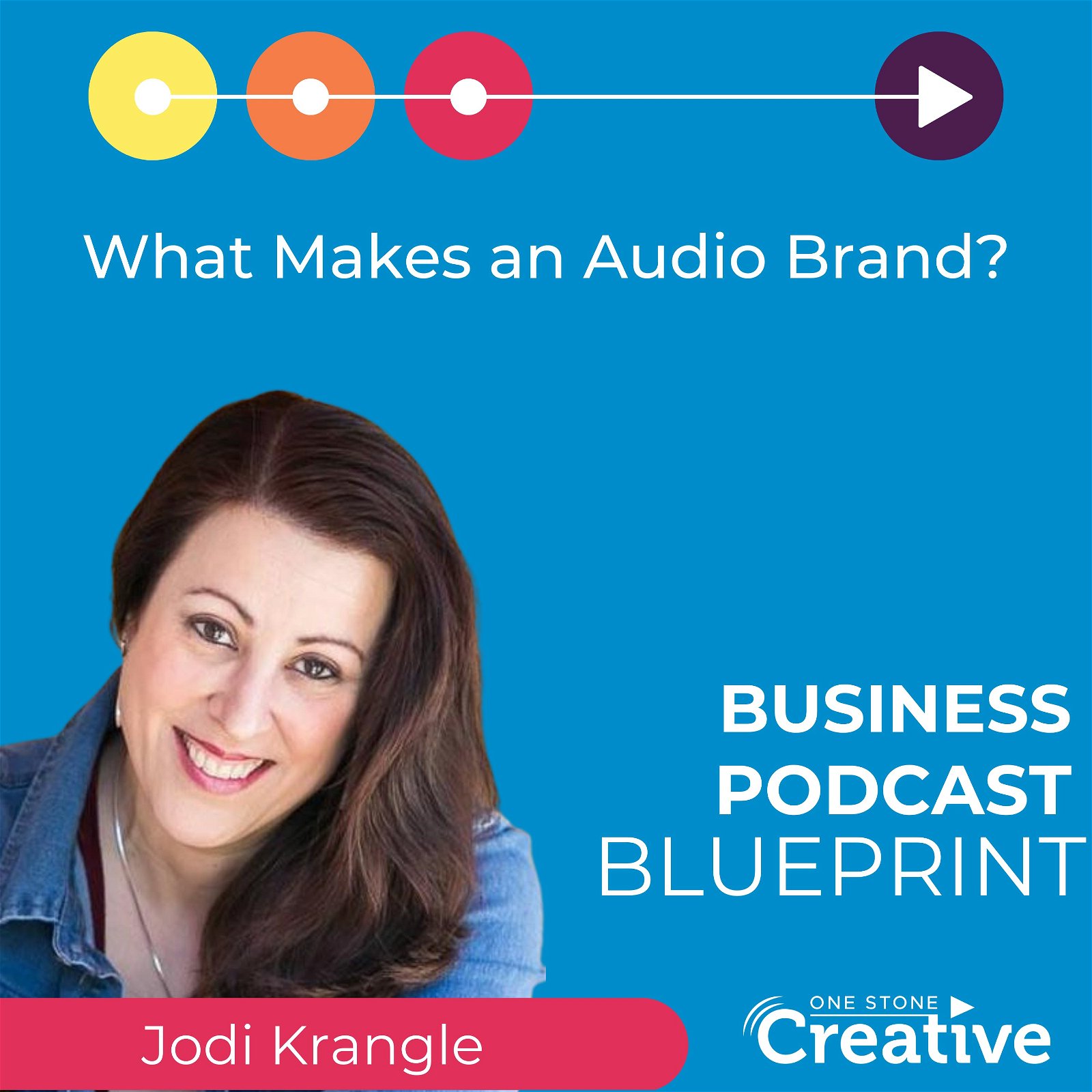
What Makes an Audio Brand? with Jodi Krangle
Are you ready to unlock the true potential of audio in your business? In this episode of the Business Podcast Blueprint Show, I sit down with voice actress and audio branding expert, Jodi Krangle, to discuss the importance of audio branding and how it can enhance your podcast's overall impact. From creating music to understanding the power of voice and sound, Jodi shares her insights on making a memorable audio brand. You'll also learn about her experiences in voice acting, her love for technology, and her thoughts on social audio platforms like Twitter Spaces and Clubhouse.Don't miss this episode, where we reveal the hidden power of sound to engage and captivate your audience!
Jodi Krangle is a talented voice actress and audio branding expert with a passion for sound and technology. She began her career in voice acting in the mid-90s, volunteering at the Canadian National Institute for the Blind. Jodi's background in music and her love for computers made her a natural fit for the world of voice acting and audio engineering. Her experience in internet marketing and SEO also led her to create a successful songwriting resource online called The Muse's Muse, which ran from 1995 to 2016. Jodi's unique blend of creativity and technical expertise have made her a sought-after voice in the industry, and she continues to share her knowledge and insights to help others elevate their audio brands.
You’ll hear Jodi and I discuss:
A well-crafted audio brand can not only enhance the overall perception of your brand, but also create more profound emotional connections with your target audience, leading to increased brand loyalty and recall.
Jodi shares her expertise on using various sound components, such as music, voiceovers, and soundscapes, to create a unique and memorable audio identity that sets a brand apart from its competitors.
Her fascination with technology and her interest in learning about the technical aspects of sound recording and editing has enabled Jodi to become her own audio engineer, offering her more control over the quality of her work.
The tremendous progress that has been made in the field of sound technology over the years.
To hone your voice acting skills and to succeed in the competitive voiceover industry, you need to continuously invest in coaching, education, and you need to learn from your mistakes.
Sonic branding and audio logos have been around for a long time and are effective mnemonics that listeners recognize and associate with specific brands.
Recent studies have shown that sonic branding can boost audio ad recall by double digits, increasing recall by 17% in radio ads and 14% in podcasts.
The intro and outro are key elements of audio branding, and choosing the right voice for them is important. A professional voice talent can be used if the host's voice does not match the desired tone.
Consistency in audio branding is essential, as it helps build recognition and memory among listeners.
KEY QUOTES
“Audio branding is a brand sound that represents the identity and values of a brand in a distinctive manner.” - International Sound Awards
"You want to be remembered. That's the whole point of advertising really." - Jodi Krangle
Resources
One Stone Creative | LinkedIn | Twitter | Facebook | Instagram | Website
Jodi Krangle on LinkedIn | Twitter | Facebook | YouTube | Voiceovers and Vocals
Audio Branding Podcast | The Power of Sound
Clubhouse | Clubdeck
Audacy-Veritonic study | International Sound Awards
00:0023/03/2023
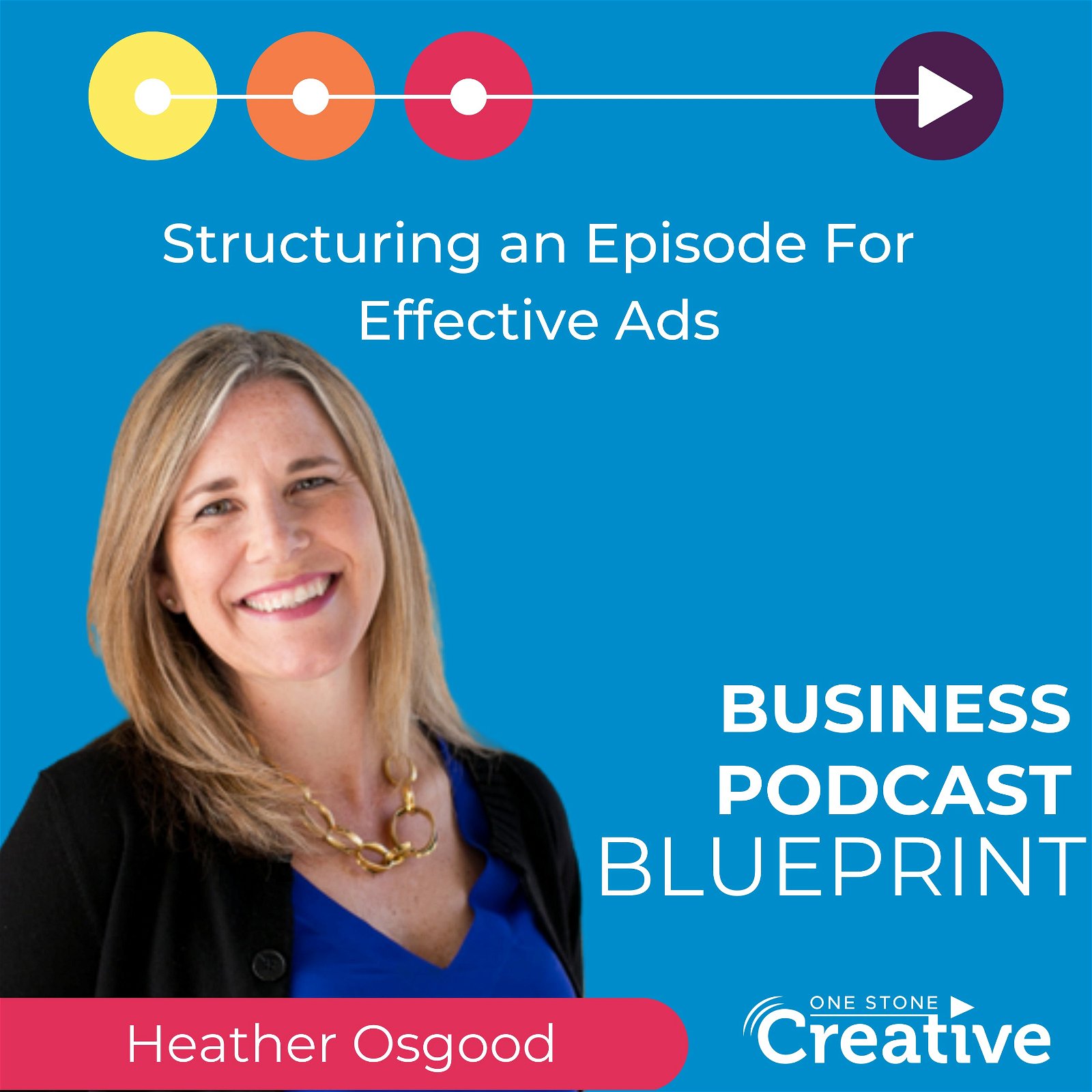
Structuring an Episode For Effective Ads with Heather Osgood
Are you considering advertising on your podcast? If so, you're not alone. Many podcasters are interested in monetizing their content through ads, but how do you do it effectively? On this episode of the Business Podcast Blueprint Show, I interview Heather Osgood, founder of True Native Media, about how to structure podcast episodes for effective ads. Heather explains why podcasting is such an effective medium for advertisers, due to the high engagement and intentionality of podcast listeners. She also discusses the different types of advertisers and industries that are interested in podcast ads, as well as the technology behind dynamic ad insertion. If you're interested in monetizing your podcast through ads, don't miss this insightful episode.
Heather Osgood is an expert in podcast advertising and the founder of True Native Media, a podcast representation agency that connects podcasters with advertisers. With over seven years of experience in the industry, Heather has helped countless podcasters monetize their content and has worked with a wide range of advertisers, from direct response companies to those targeting niche audiences. Heather is passionate about the engagement and intentionality of podcast listening and believes that podcasts provide a unique opportunity for advertisers to reach their target market.
You’ll hear us talk about:
Many podcasters consider advertising at some point for monetization and sustainability.
“The reason that advertisers have a tendency of gravitating toward podcasts and having a lot of success is because of the engagement that happens with the podcast audience,” Heather says.
People are very intentional about the podcasts they listen to, so the audience is usually highly engaged. “The other thing that is really fascinating about podcasts,” Heather tells me, “is time spent listening. So the average podcast is really about 40 minutes long. The average listener listens to about 80% of the podcast.”
This makes podcasts an excellent choice for advertisers to get in front of their target market.
There are several types of advertisers that succeed in the podcast space. Direct-to-consumer and financial products are popular. Software does particularly well. Heather says, “I would say software works exceptionally well in podcasts because the other thing to think about with podcasts is that they are global… Somebody can listen to a podcast anywhere in the world. And one of the things that's great about software is in most cases people can buy software anywhere on the planet.”
Podcasts are a global platform and can offer localized ad placements. Dynamic ad insertion technology allows for better targeting of ads to specific listeners.
Announcer-read ads are typically programmatically inserted into a podcast, while host-read ads are advertised by the host of the show. Announcer-read ads are usually placed by large advertising agencies to reach specific targets.
An effective transition in a podcast will avoid the listener feeling there are too many ads. I like the cliffhanger method as an effective way to keep listeners engaged during ad breaks. Heather also recommends using music to create powerful transitions.
If your podcast gets 30,000 to 50,000 downloads per month or more, Heather would love to represent you. You can fill out the podcast questionnaire on the True Native Media website for more information.
KEY QUOTE
"With podcasts, people are...there because they want to hear the content. And that creates this engagement, which then allows this advertiser to really align themselves well with that content and reach the target market that they're looking to reach." - Heather Osgood
Resources
One Stone Creative | LinkedIn | Twitter | Facebook | Instagram | Website
Heather Osgood on LinkedIn | Twitter | Facebook | Instagram | Website
True Native Media
Remarkable People | Terrestrial Radio | Vox Media | Sawbones: A Marital Tour of Misguided Medicine
Edison Research
00:0016/03/2023
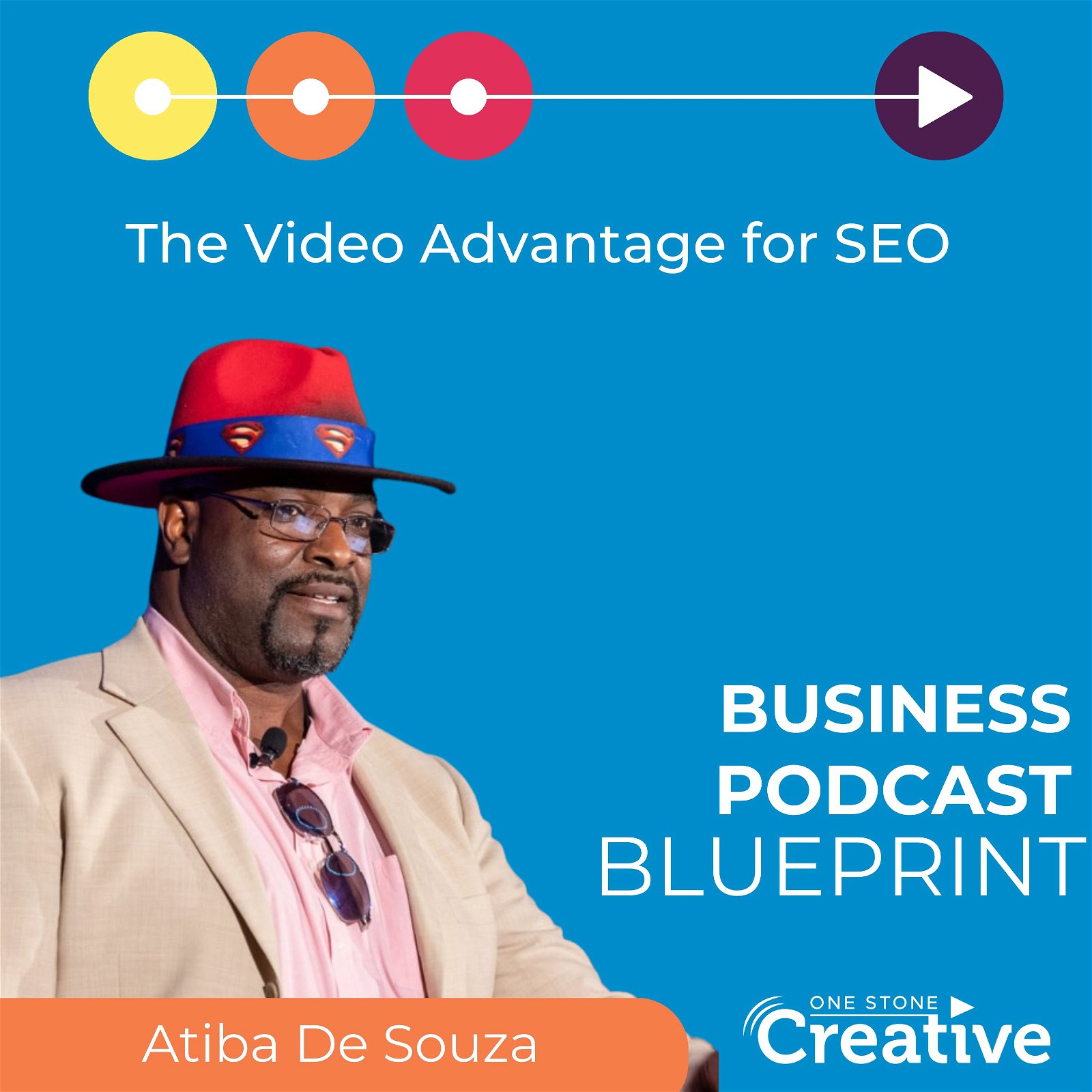
The Video Advantage for SEO with Atiba De Souza
Have you ever thought about how to take your podcasting strategy to the next level? With video becoming increasingly important in podcasting, it's essential to understand how to make your content stand out in a sea of information. That's why I'm thrilled to have Atiba de Souza as this week's guest on the Business Podcast Blueprint Show. Atiba has been working in search and SEO since the 90s and has applied his extensive knowledge to help content creators build their audience and shorten their sales cycle. Today, we're discussing the different ways podcasters can use video and how to create valuable content that ranks on page one of Google. We'll also dive into the benefits of using video to build relationships and connect with your audience on a deeper level.
Atiba de Souza is a seasoned expert in the world of search and SEO, with over two decades of experience in the industry. He co-founded a computer consulting firm in 1996 and wrote one of the first search engines, starting his journey in search technology. Atiba has worked with numerous government agencies, including the DoD, Army, and DLA, building search systems and consulting on various projects. In 2019, he began focusing on video and YouTube, realizing the potential to create valuable content that ranks on page one of Google. Atiba is passionate about helping content creators shorten their sales cycle and build relationships with their audiences through the power of video and valuable content.
Here are some key ideas you’ll hear us discuss:
Video is becoming increasingly important as part of a comprehensive podcasting strategy, according to reports.
Video can help shorten the sales cycle and help people connect with who you are, understand why they should trust you, and take them through the process of getting to know you, learning to like you, and then trusting you.
Google is starting to reclassify a big chunk of its database to be video-first content. They want to show video first because people want to consume video before they consume written content. Video fills the void that Google created for itself, and if Google loves your video, they will place it at the top of search.
Podcasters can use video in different ways and should keep in mind the different things when they are creating video for distribution across different channels.
Videos can be splintered into short snippets to answer questions that Google users may ask.
Podcast episodes can be converted into videos and chopped up for snippets that can rank in Google searches.
The decision of who answers the questions in the videos depends on the goal of the video. If the goal is to rank on Google, it could be either the guest or the host. But if the goal is to generate business, it would be better to shine the spotlight on the guest.
YouTube Shorts is YouTube's second newest thing, which is still really big for them. YouTube Shorts can help rank both long and short form videos.
Community is YouTube's newest thing. It's been around longer than Facebook and Twitter and was originally about creating a platform where a creator can bring people together in a group and make money.
YouTube has Feedburner, which can be connected to a YouTube channel to produce an RSS feed that can be used for a newsletter that goes out every time a new video is published.
KEY QUOTE
“The beauty of podcasting, the beauty of video is it completely revolutionizes your ability to connect with someone and take them through that process of getting to know you, learning to like you, and then more importantly, get into that place where they trust you.” - Atiba de Souza
Resources
One Stone Creative | LinkedIn | Twitter | Facebook | Instagram | Website
Atiba de Souza on LinkedIn | Twitter
Sean Cannell: YouTube Secrets
00:0009/03/2023
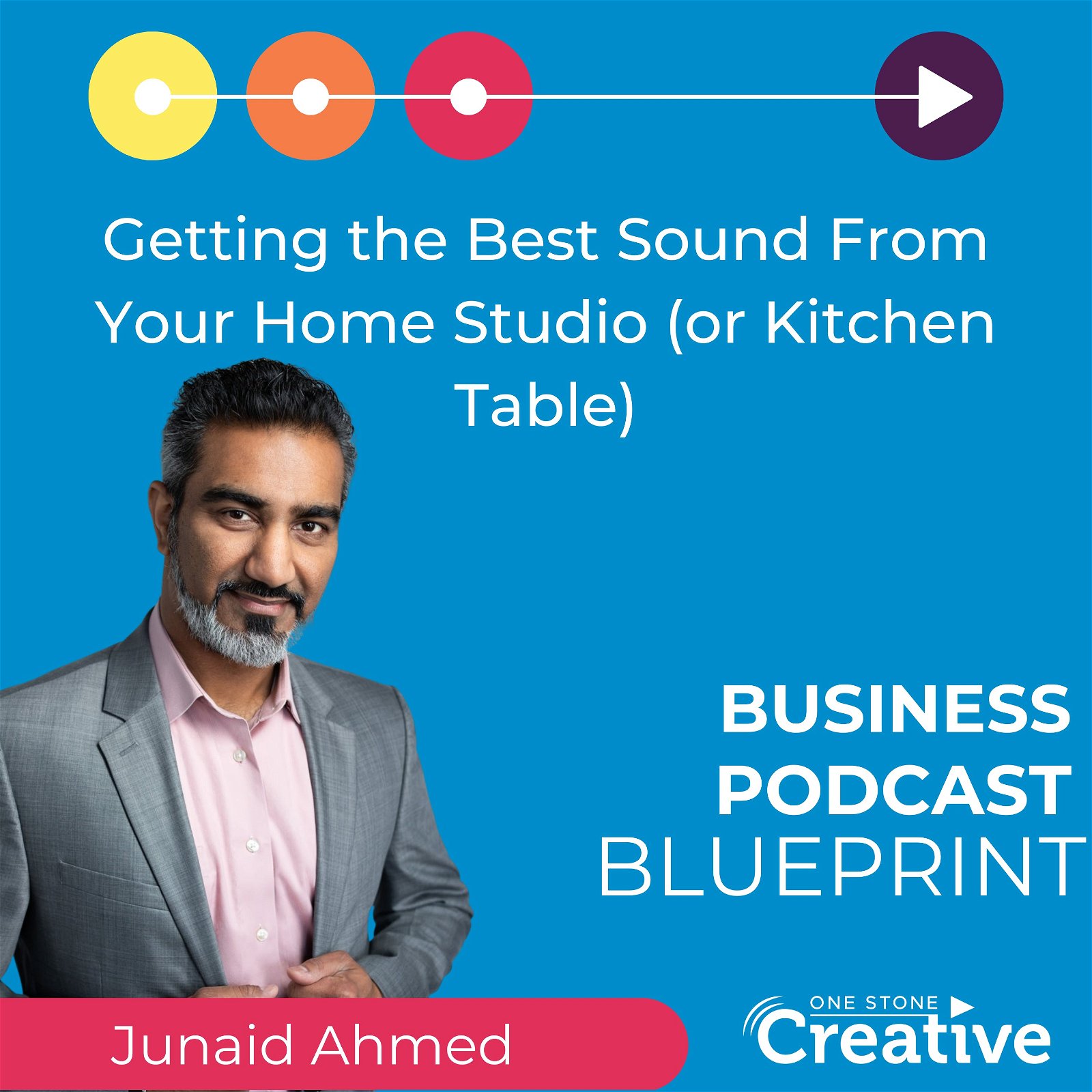
Getting the Best Sound From Your Home Studio (or Kitchen Table) with Junaid Ahmed
Are you struggling with optimizing your audio setup for your podcast? If so, you're not alone. On this episode of the Business Podcast Blueprint Show, I talk to Junaid Ahmed, an expert in home audio and video setup. Junaid shares his tips on how to optimize your recording space, troubleshoot audio issues, and pick the right microphone for your needs.
Junaid Ahmed is an expert in podcasting, voice acting, and audio engineering, with over 15 years of experience in the industry. He has a strong background in photography and video cameras, dating back to 1989, and stumbled upon podcasting in 2012. In 2018, he began documenting his beekeeping journey and interviewing guests on his podcast. With over 400 interviews under his belt, Junaid is an authority in audio and video setup for home studios. He has worked with a diverse range of clients, from small businesses to Fortune 500 companies, to create high-quality audio content that engages their audience. Junaid is passionate about technology and how it can enhance storytelling, keeping himself up-to-date with the latest developments in the field. He shares his expertise on several podcasts and blogs, and he hosts his own podcast, Hacks & Hobbies, where he interviews experts in different fields and shares insights on how to turn hobbies into successful businesses.
To optimize and troubleshoot your own podcast setup, you need to get all the variables right, which includes analyzing the space you're recording in, picking the right microphone, and using the right equipment to capture high-quality audio and video.
The ideal home studio removes all friction to creating content and is designed for permanent installation, but in reality, many people don't have a dedicated space for recording and have to make do with what they have.
To optimize a closed office or multi-use space for podcast recording, you need to analyze the space and add personality to it, pick the right microphone for the space, and use acoustic treatments like rugs, paintings, and curtains to absorb sound and reduce echo.
To optimize a temporary space like a hotel room, use a lapel mic to capture high-quality audio and pay attention to lighting. “What you want to do in those kind of spaces, especially if you're doing video, is to have a lapel mic on you,” Junaid says. “It's close to you and it only has a very small distance of capturing your video and your audio.” You can also use a small closet or portable sound treatments to absorb sound and reduce noise.
Lapel mics or headsets with microphones are recommended for capturing good audio in conference rooms with flat walls and wide empty spaces.
Recording platforms like Riverside, Zencastr, and StreamYard can save recordings in high quality wav files, whereas Zoom compresses recordings into mp3 files.
It's possible to start podcasting with a few hundred dollars, and mid $2,000 can get you a good set of gear, including a microphone, camera, headphones, and lighting equipment.
It's better to start with minimal investment and upgrade as you go.
KEY QUOTES:
"The idea behind setting up a home studio is to remove any and all friction to creating content." - Junaid Ahmed
“You’ve got to know the type of microphone you're using, where the driver is capturing the audio and you're talking into that space as opposed to the offside. That can help improve the audio by miles.” - Junaid Ahmed
"All of this has enabled us to not only connect with each other but also grow as a person and grow as a human being." - Junaid Ahmed
Resources:
One Stone Creative | LinkedIn | Twitter | Facebook | Instagram | Website
Junaid Ahmed | Home Studio Mastery | LinkedIn | Twitter | Hacks & Hobbies podcast
Adobe Character Animator | Apple | Skype | Zoom | Zencastr | Blue Yeti | Nvidia | Riverside | StreamYard
00:0002/03/2023
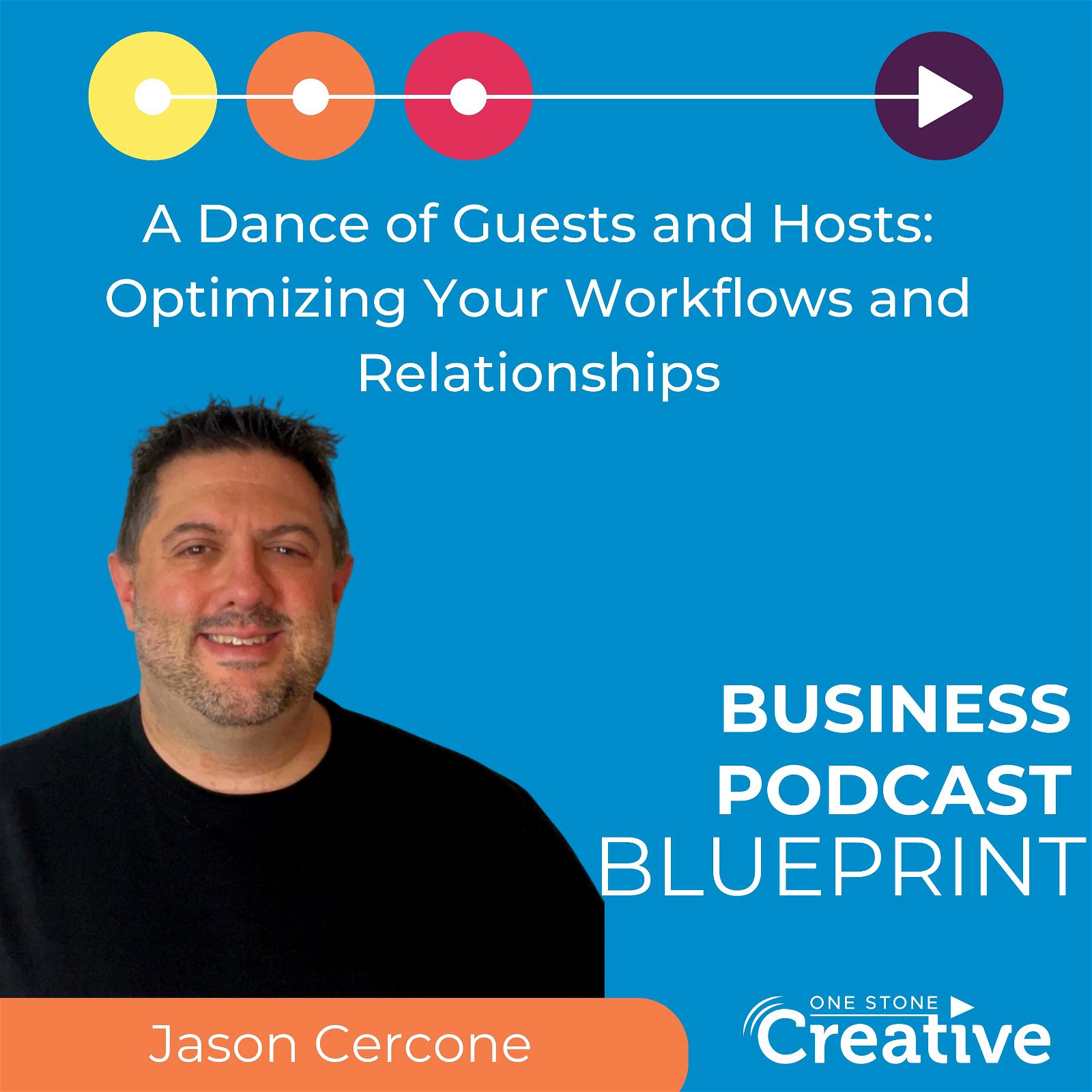
A Dance of Guests and Hosts: Optimizing Your Workflows and Relationships with Jason Cercone
Are you a podcaster looking to take your interview game to the next level? Look no further! In today's episode, we're diving deep into the world of guest management with podcasting expert, Jason Cercone. From booking guests to creating a comfortable environment for them, Jason shares his top tips for conducting engaging and informative interviews in this episode of the Business Podcast Blueprint Show.
Jason Cercone is an expert in guest management, pitching, and building authority through podcast guesting. He started podcasting in 2015, took a break to study the art of communication, and came back to podcasting to help others launch their podcasts. He now helps people maximize the guesting side of things to build their brand and establish thought leadership in their niche.
You’ll hear Jason and I talk about:
The initial outreach to guests should be simple and not overly salesy. Contact them by phone if it’s their preferred method of communication.
Hosts should create a warm and welcoming environment and ensure that the guest has a good microphone for high audio quality.
Provide your guests with clear expectations, topics, and questions before the recording. That way you’ll avoid surprises and ensure that everyone is on the same page.
During the call, actively listen and engage with your guest, show appreciation for their expertise, and encourage them to speak freely and openly.
After the call, follow up with your guest, share the episode's publication schedule, and thank them for their time and contribution to the podcast.
A pre-call before recording a podcast episode can help establish a good rapport with the guest and ensure that they have the necessary equipment for recording.
Most podcasters benefit from some preparation for a show with a guest, such as looking at the guest's social media profile or listening to them on other shows.
Sending a list of questions to the guest before recording can be helpful, don’t feed them questions that are too limiting or contrived.
A good host should be able to create compelling content that goes beyond surface-level questions and elicits an engaging response from the guest. This can help keep listeners invested in the show and lead to more engagement and growth.
The type of preparation and approach to hosting a podcast depends on your podcast's main goal, whether it is relationship-building, audience engagement, or thought leadership.
Jason likes to gauge his guests' level of show prep before the recording. He strives to have engaging conversations with his guests and gets them to the value as quickly as possible.
It's important to have good audio quality during recordings. Turn off devices and notifications to prevent distractions.
Don’t neglect common courtesy items like arriving early, testing your mic, and ensuring a quiet recording environment.
Hosts should feel comfortable giving direction to guests on tech issues, such as adjusting their mic volume, to ensure the highest quality production.
Life happens, and sometimes unexpected issues arise during the recording process. It's best to deal with it creatively and constructively.
KEY QUOTES:
“It's all about the relationship with the person in front of you, not this audience they've built. That's all something that can come into play down the road. But if you're building that relationship with the person in front of you, that can lead to a number of opportunities before the interview even goes live.” - Jason Cercone
“...[make] sure that you're asking those engaging questions and letting that organic conversation flow.” - Jason Cercone
Resources:
One Stone Creative | LinkedIn | Twitter | Facebook | Instagram | Website
Jason Cercone Website | Twitter | Instagram | Facebook | YouTube
The Absolute Guide to Authority Enhancement
00:0023/02/2023
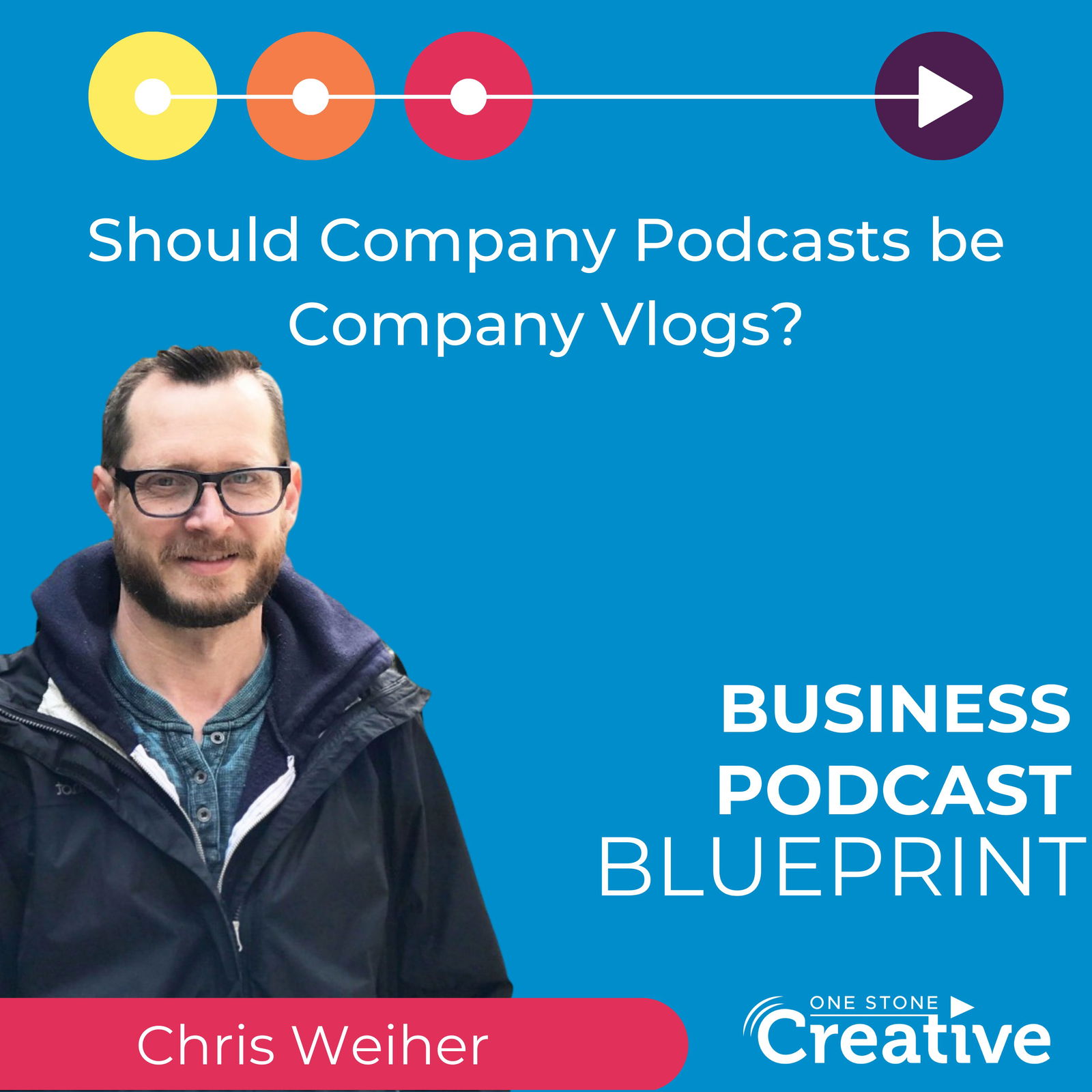
Should Company Podcasts be Company Vlogs? An Audio vs. Video Showdown
Chris Weiher, an experienced video producer, joins Megan Dougherty to lay out the pros and cons of podcasting and vlogging to settle once and for all - should your podcasts be on video? They're digging into all of the different ways multi-media content can impact your business and seeing which platform comes out on top.
"If you're going to spend an hour recording your voice, talking about something passionately, interviewing somebody passionately, you should record the video as well because it's fascinating to us and obviously to people like consuming media in different ways."
Chris Weiher is a video producer with over 20 years of experience in the industry. Chris’s company, CLEAVER Creative has created B2B animations, sales presentations, and commercials seen by millions and now works with business owners to help them create their own videos and he only cares about results.
There is something biologically wired in us that draws us to watch faces, and that is what Chris is working to take advantage of to help build relationships. If we're all recording with video on, why not capture and make use of the video? Taking it a step further, Chris started exploring how vlogging on Linked int creating an opportunity to connect directly with clients and community – he was convinced.
Listen to this episode to find out how vlogging and podcasting can each contribute to your overarching business goal with your show, with details about Thought Leadership, Relationship Building and Audience Engagement.
In this episode, you will learn the following:
1. Exploring the Benefits of Recording a Video Podcast: What are the advantages of recording a video podcast over an audio podcast, and how can this help you engage your audience more effectively?
2. Learning How to Build a Community Through Social Networking: What strategies can you use to network with other professionals and build a strong community on LinkedIn?
3. Leveraging Your Content Across Different Platforms: How can you repurpose your content to maximize engagement on different platforms?
RESOURCES
One Stone Creative | LinkedIn | Twitter | Facebook | Instagram | Website
Chris Weiher | Cleaver Creates | LinkedIn
00:0016/02/2023
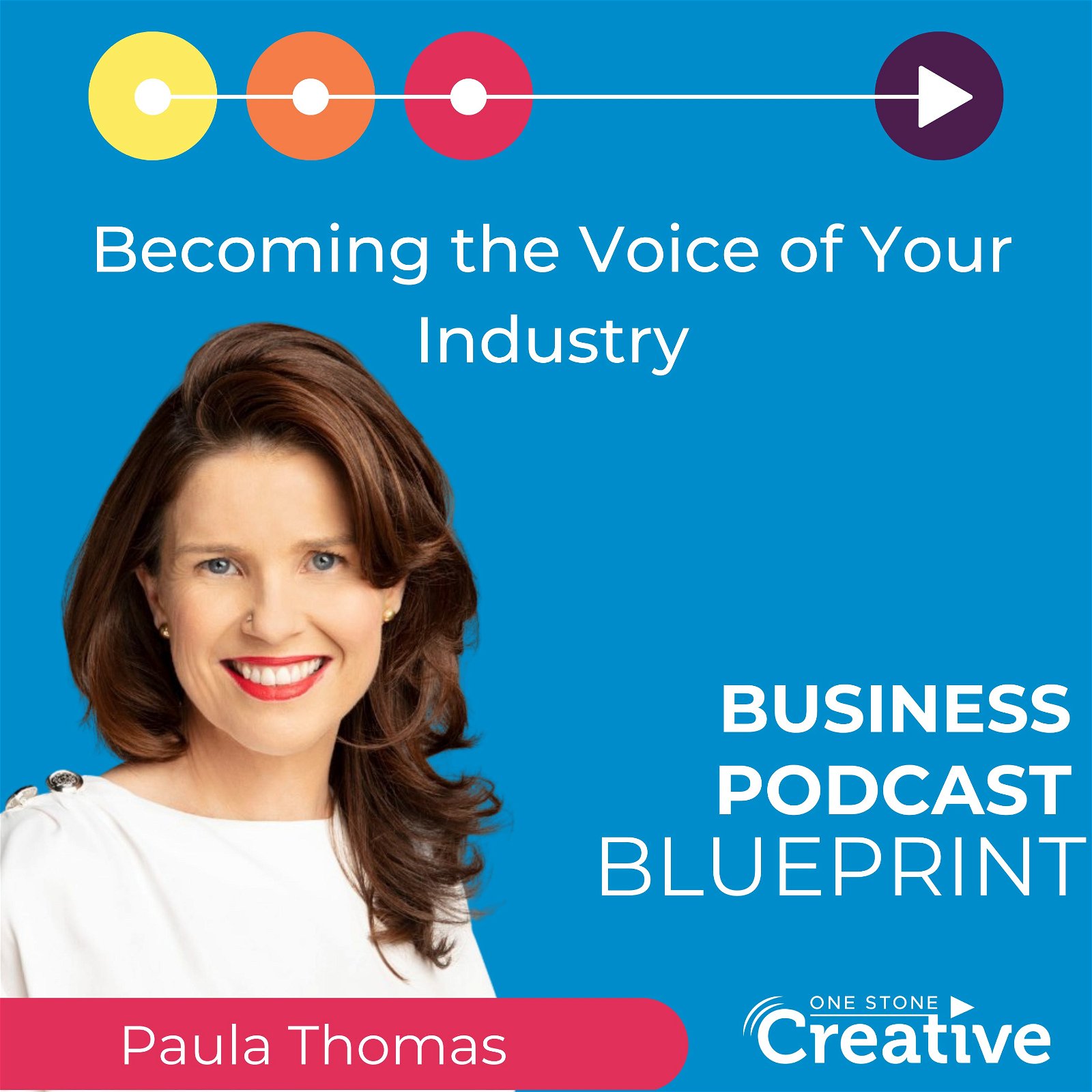
Becoming the Voice of Your Industry with Paula Thomas
Our goal at One Stone Creative and the Business Podcast Blueprint Show is to help companies harness the power of podcasting. In this episode, I sit down with the amazing Paula Thomas, host of Let's Talk Loyalty. We chat about sponsorship and partnerships and the importance of beginning with the end in mind.
Paula Thomas is the mastermind behind Let's Talk Loyalty, a top 5% podcast globally according to Listen Notes. Paula has built a thriving podcast empire from the ground up. Her creative approach to podcasting and clever marketing moves, as well as her expertise in sponsorship and partnerships has made her a go-to expert in the field.
Tune in to hear Paula and me chat about:
Her background in digital marketing and her passion for loyalty marketing inspired Paula to start a podcast.
Consistency was key to building the success of Let's Talk Loyalty.
Paula's focus on interviewing compelling brands attracted her target audience. “What I learned by doing is probably one of the most important early things, was [that] I really wanted to interview brands that were compelling to my audience,” she tells me.
Paula went all-in on building the podcast as a business. This was crucial to her success.
The sponsorship model she adopted is simple and effective:
30-second host-read ads, with one sponsor per show;
3 shows a week, 156 read-out slots to sell;
She also offers executive interviews, 2-3 per sponsor per year. These interviews focus on thought leadership and are clearly labeled as sponsored content;
Content is appealing to both sponsors and audience.
Limit advertising to 1 minute per show to avoid content overload and appeal to both sponsors and audience, Paula advises.
Partnering with loyalty industry associations helped Paula promote her show.
Paula has a full-time team for production and publishing, including a client success manager to manage sponsors.
Paula considers her podcast as a product and is proud of its commercial success.
KEY QUOTE:
“Our whole distribution strategy for the show is to be the default audio content creator for every loyalty industry association in the world.” - Paula Thomas
RESOURCES
One Stone Creative | LinkedIn | Twitter | Facebook | Instagram | Website
Paula Thomas | LinkedIn | Let's Talk Loyalty
00:0009/02/2023

Digging into Episode Structure
We’re back for season 3 of the Business Podcast Blueprint Show! My first guest this season is my business partner, Audra Casino, and we’re going to dive into the crucial aspect of podcasting that often goes overlooked - show structure. Audra and I are going to talk about the structure of a podcast episode and how it affects the listener's experience and the success of the podcast. Audra is an expert in this area, so we'll be discussing topics such as mic problems, show structure, episode segments, and the best way to improve your podcast performance consistently.
You’ll hear us chat about:
Recording the first ever episode of Business Podcast Blueprint Show with the wrong microphone. We now use this mishap to illustrate the importance of having the right mic selected to ensure good sound quality in a podcast recording.
Banter is a way for podcast hosts and guests to bond and create a relaxed and friendly atmosphere, but it can also be harmful if it crosses the line into inappropriate or insensitive territory.
You can view the structure of your podcast episode as the bones of your show, and as a template that you can use for every episode. A basic structure can be modeled after an essay with an introduction, body, and conclusion.
Recording each segment separately gives more control over the content, making it easier to write a better intro, deliver on promises made in the intro, and create cohesive episodes.
Repurposing content is a power tip. When recording video content, little segments can be treated as repurposing content and can be used in various ways.
Three types of business podcast blueprints:
A Thought Leadership podcast is focused on promoting the speaker's reputation and intellectual property. Thought-provoking, informative, and educational content that is relevant to their industry is the best for a thought leadership podcast. Segments on current events, trends, and hot topics within the industry are ideal for this type of podcast.
The Audience Engagement style: answer listener questions to make the audience feel seen and heard. Engage directly with the audience and incorporate listener questions, either written or recorded. You can also have a segment where listeners can introduce themselves and talk about why they like the podcast. Other tips include encouraging participation on social media.
Relationship Building style: This is about creating a "flywheel of new connections" through guest appearances and hosting others on their own podcast. Relationship building is a common goal for businesses podcasting as a marketing channel. Serve the audience with good content while also giving guests a chance to shine. A speed round or personal anecdotes can be a great way to build relationships. Allowing guests to think about questions beforehand also helps them put their best foot forward.
Solo episodes can be used to create content that can be easily repurposed on social media platforms.
Frontload planning for easier execution. Also, listen to finished episodes and write down observations about what works and what doesn't, to improve your show.
The Business Podcast Blueprint Show team at One Stone Creative invites you to their monthly strategy and networking sessions on the first Thursday of every month. These free sessions include trainings, Q&A, hot seats, and opportunities for networking. To learn more and register, visit OneStoneCreative.net/strategy.
00:0002/02/2023
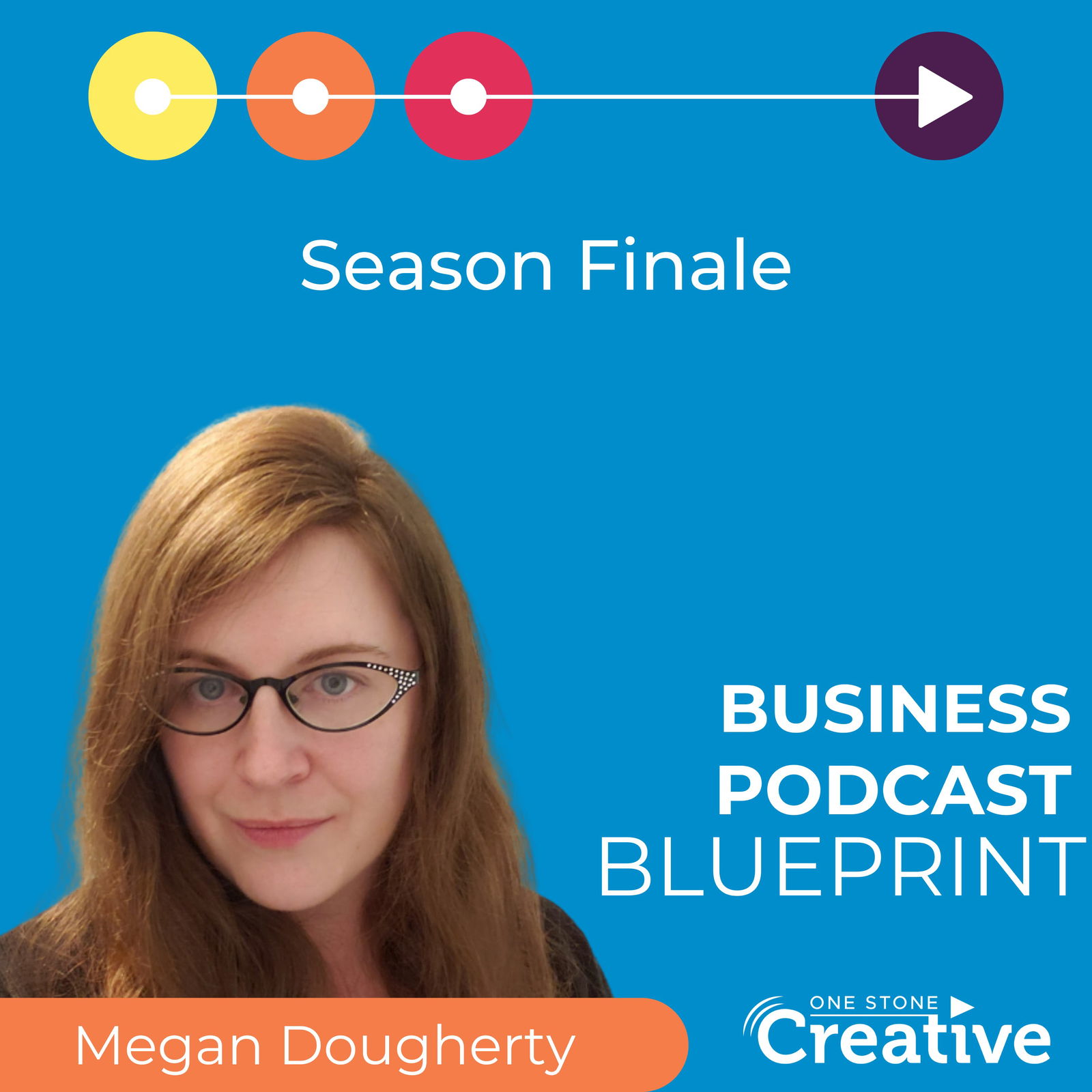
Season Finale
I quite frequently swear that when this project is finished, I'm going to take a nice break and spend some time resting and reflecting. I'm generally a dirty liar, but not this year. This December, I'm doing my best to make an honest woman out of myself and spend more time reflecting and gently planning the next year. It's not what I'd call easy, but I do suspect it's going to be worthwhile. This is the last Business Podcast Blueprint episode of the season and the year, and I’m talking about how it's gone and what's going to happen next.
Tune in to hear me talk about:
One of the best ways to improve the quality of an interview is to restrict the length. This forces you to get more good content out in a shorter amount of time. The same thing applies to seasons as well!
I plan to make changes to my podcast workflow and cadence next year. The biggest change involves switching from an all interview format to weekly interviews or shorter seasons focused on specific topics.
The Podcasting for Business Conference was a huge success! The content was amazing, brought by absolute experts in their spaces who brought their A-game. It nearly makes me burst with pride that we were able to assemble and put everything together for the attendees.
Investing more in the grassroots style of marketing rather than the traditional affiliate-based advertising methods is something I'm going to be looking at doing next year.
RESOURCES
One Stone Creative | LinkedIn | Twitter | Facebook | Instagram | Website
Head to PfBCon.com to grab a copy of the recordings!
Get the State of Business Podcasting report here!
Cedar & Sage Media | Website
00:0009/12/2022
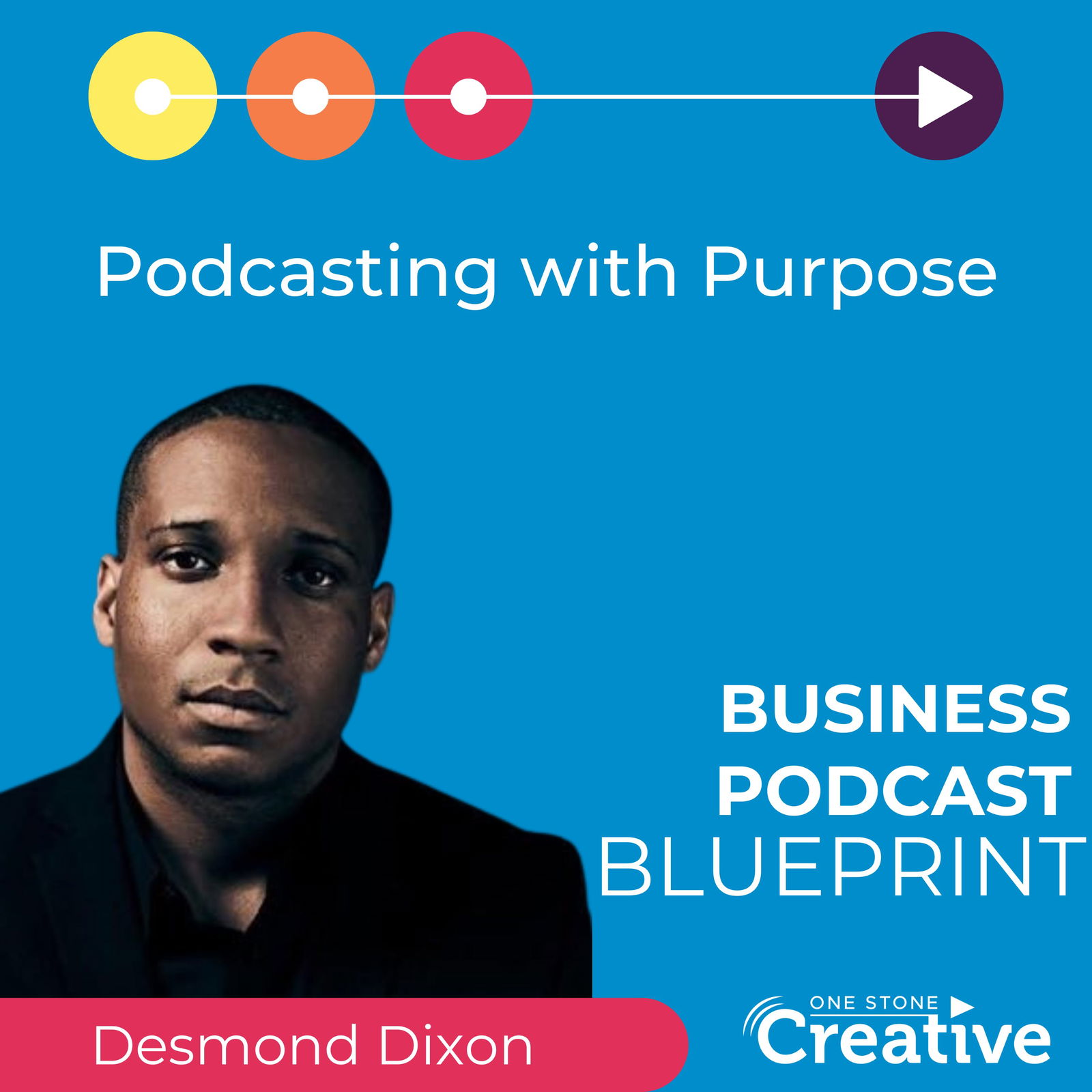
Creating Lasting Links with Desmond Dixon
This week’s guest, Desmond Dixon, is CEO of Remote Sales Manager, co-founder of Hubalz, and host of the Campfire Capitalism Podcast. Desmond is a world-traveling, sales team-building entrepreneur who loves connecting like-minded people together. Today, Desmond shares his story as we discuss how podcasting can help you network and build relationships and his strategy for having valuable conversations.
Tune in to hear Desmond and I explore:
Desmond created an internal team to help him with his podcast from the get-go. This experience taught him the true value of expertise: even though his team was effective, they could only do as well as he directed them to.
Desmond let go of perfection and focused on going all in, he shares. Podcasting while traveling was difficult at first, but when he remembered that at its core podcasting is simply talking to people, the hardest part was easy to overcome. That hardest part, according to him, was getting guests.
The secret to talking to people is being curious, Desmond claims. Being more curious about another person than you are about your inner world will allow you to have real conversations.
One sure way to deepen and maintain relationships with your guests is to “be obsessed with them outside of the podcast,” according to Desmond. This involves getting them on other shows, introducing them to potential clients, and engaging with their content.
Question of the Week:
Q: How do you follow up with your podcast guests?
A: One of the main reasons most businesses run podcasts is to establish and develop professional relationships. That means talking to people, of course, but that's only the first step to make your podcast a really meaningful networking tool. The first follow up is easy: thank your guest for coming on your show, and share the podcast details. After that, it can be a little more difficult to decide how to continue building the relationship in a way that feels natural.
Connect with them on all social media platforms and engage with their content. Be the kind of connection you want to have. Keep a running list of the people you're building relationships with and periodically reach out with something they might find interesting or update them on something that you've talked about in the past or the episode that you recorded together.
RESOURCES
One Stone Creative | LinkedIn | Twitter | Facebook | Instagram | Website
Desmond Dixon | LinkedIn | Twitter | Website
00:0002/12/2022

Deep Dive into the State of Business Podcasting Report 2022
Since 2020 we've been looking at the top 100 business podcasts to find out what they're doing with their shows and what we can learn from them. We discussed this year's results during last week's Podcasting for Business Conference, and are sharing that examination today on the Business Podcast Blueprint Show.
Tune in to hear Tom and I explore:
The State of Business Podcasting report is a collection of data points about the top 100 business podcasts. It’s an overview of the trends in B2B or business podcasting for companies.
For the third year in a row, the average podcast length is 43 minutes, and the most popular type of content is networks focused on a single topic.
If you are building a business and a brand around being a public original thinker, your name should be in the podcast title because that's the foundation of your brand. If you're not looking to create a named brand like that, use a name that is more topical or relevant to your audience rather than about yourself.
Assets like show notes really add to the overall SEO; that is the cheapest, most cost effective way to get more information on your show out, Tom shares.
For More Information:
Head to PfBCon.com to grab a copy of the recordings!
RESOURCES
One Stone Creative | LinkedIn | Twitter | Facebook | Instagram | Website
Tom Fox | LinkedIn | Twitter | Website | Blog
00:0025/11/2022
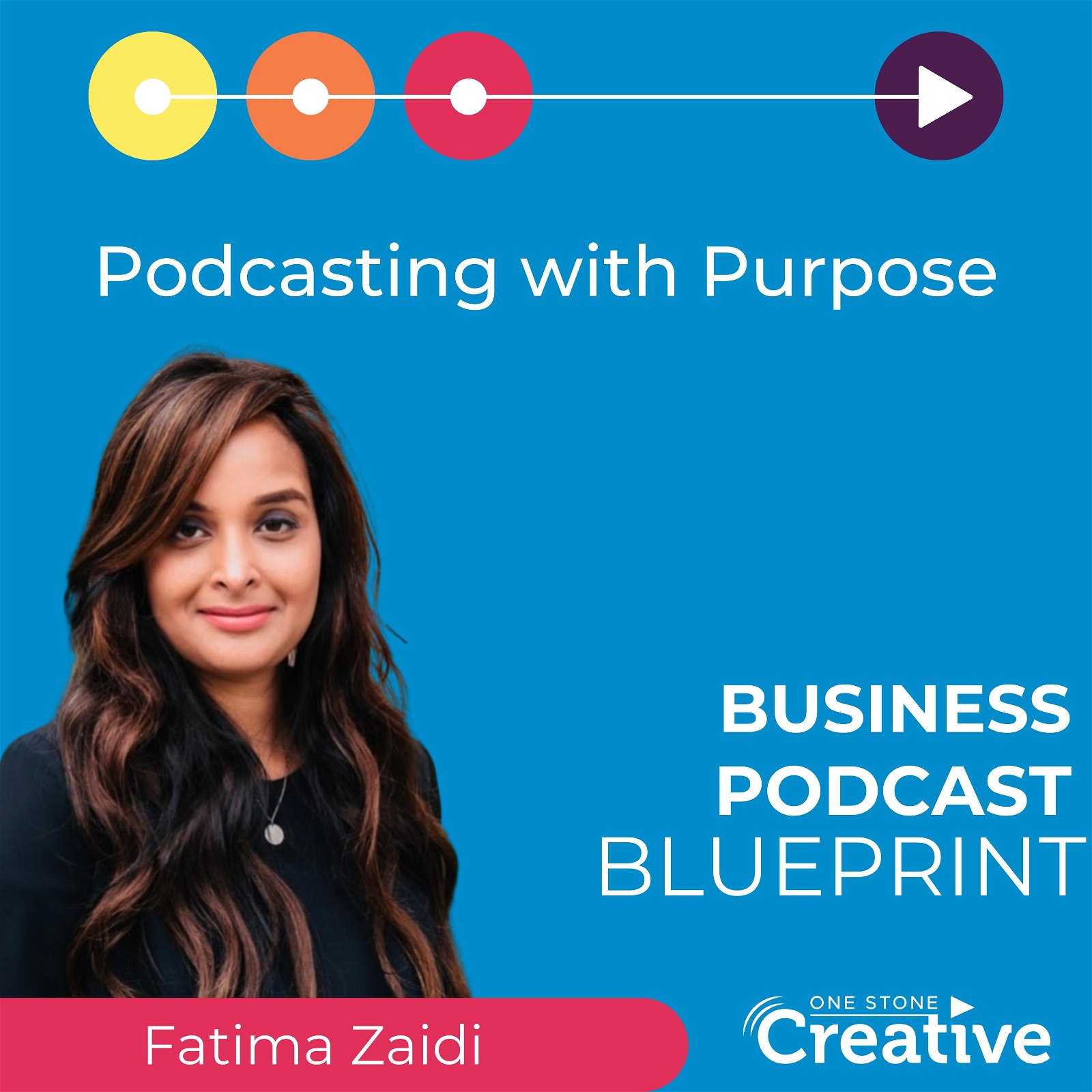
Podcasting with Purpose with Fatima Zaidi
This week’s guest, Fatima Zaidi, is CEO and founder of Quill Inc, a full-service podcasting hosting platform and production agency. Fatima supports brands in launching their podcast and helps global brands and pro-podcasters distribute, grow, and measure their audio as founder and CEO of CoHost. Today, we’re discussing how podcasts can be used to serve business objectives, the importance of diversity in podcasting, and why having an external host can benefit you.
Tune in to hear Fatima and I explore:
Audio can reach people where other forms of media can’t. You can’t watch Netflix while driving to work, or read an article while walking your dog, but you can do these things and more while listening to a podcast, Fatima shares.
Fatima describes how podcasts help business objectives. Corporate podcasts typically serve to educate or entertain consumers; they often center around brand awareness, thought leadership, lead and sales generation, or telling their brand story.
In being intentional about representation and diversity, you have to unapologetically stick to your guns. It’s a challenge to straddle the line between running a business and supporting positive change where DEI is concerned, but sometimes you have to be “willing to say no to a lot of the powerful people in podcasting who always have the stage,” Fatima explains.
Understanding listener behavior is one of the biggest challenges in podcasting and discoverability metrics.
Question of the Week
Q: How do I become a better storyteller in interviews?
A: Like every other skill, the answer is in practicing. Within business or professional podcasts, there are two high-level types of story that you can use. The first is the bigger, overarching narrative of an episode. People understand and connect with stories and narrative tension caused by not knowing how to solve a problem. As you're planning episodes, think about that gap in knowledge that your listener has, whether it's a solo episode or an interview.
The other type of story is the kind that you tell to illustrate ideas and create connection with the audience, known as anecdotes. It might feel like a genuine anecdote has to be fresh off the cuff, but the truth is, you can practice them, and a lot of people do. Curate a little library of stories that amuse, delight, and explain. Practice them in front of the mirror, transitioning to and from them in different ways, so that when an appropriate opening comes up in the future, you are ready to go.
RESOURCES
One Stone Creative | LinkedIn | Twitter | Facebook | Instagram | Website
Fatima Zaidi | LinkedIn
00:0018/11/2022
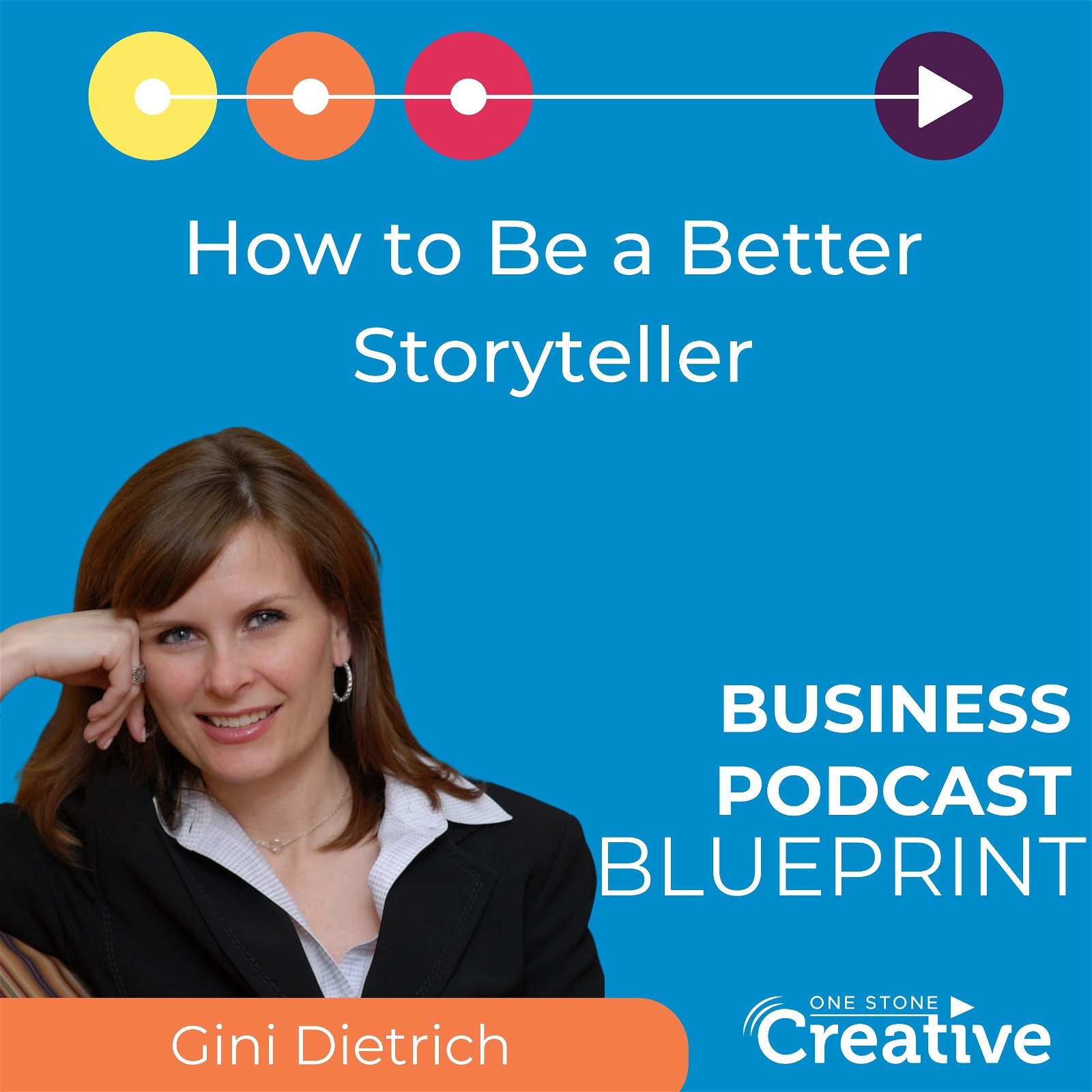
How to Be a Better Storyteller with Gini Dietrich
Humans think and understand the world through stories and narratives. Creating those stories is one of the best ways to get our messages across effectively as podcasters. A few weeks ago, our client and long-time friend, Gini Dietrich of the Spin Sucks Podcast, released an episode about how to become a better storyteller. Spin Sucks is your one-stop shop for modern communications - an independent communications agency and a community for professional communicators. Gini shares compelling ways we can use storytelling in a professional context.
She also explores:
Some communicators paint a bad image for the PR industry as a whole. “[Most] of us don’t lie for a living,” Gini affirms. “There are some who [do]... and that’s what movies and media focus on. The rest of us are doing the real work.”
Bruce Harrison and his team were interviewed and said that they regret the work that they did, and had they not been young and naive, they never would have participated in the disinformation campaign against climate change.
When telling a story, experts carry great weight.
RESOURCES
One Stone Creative | LinkedIn | Twitter | Facebook | Instagram | Website
Spin Sucks | Website | Podcast | Twitter | Instagram
Gini Dietrich | LinkedIn | Twitter
00:0011/11/2022
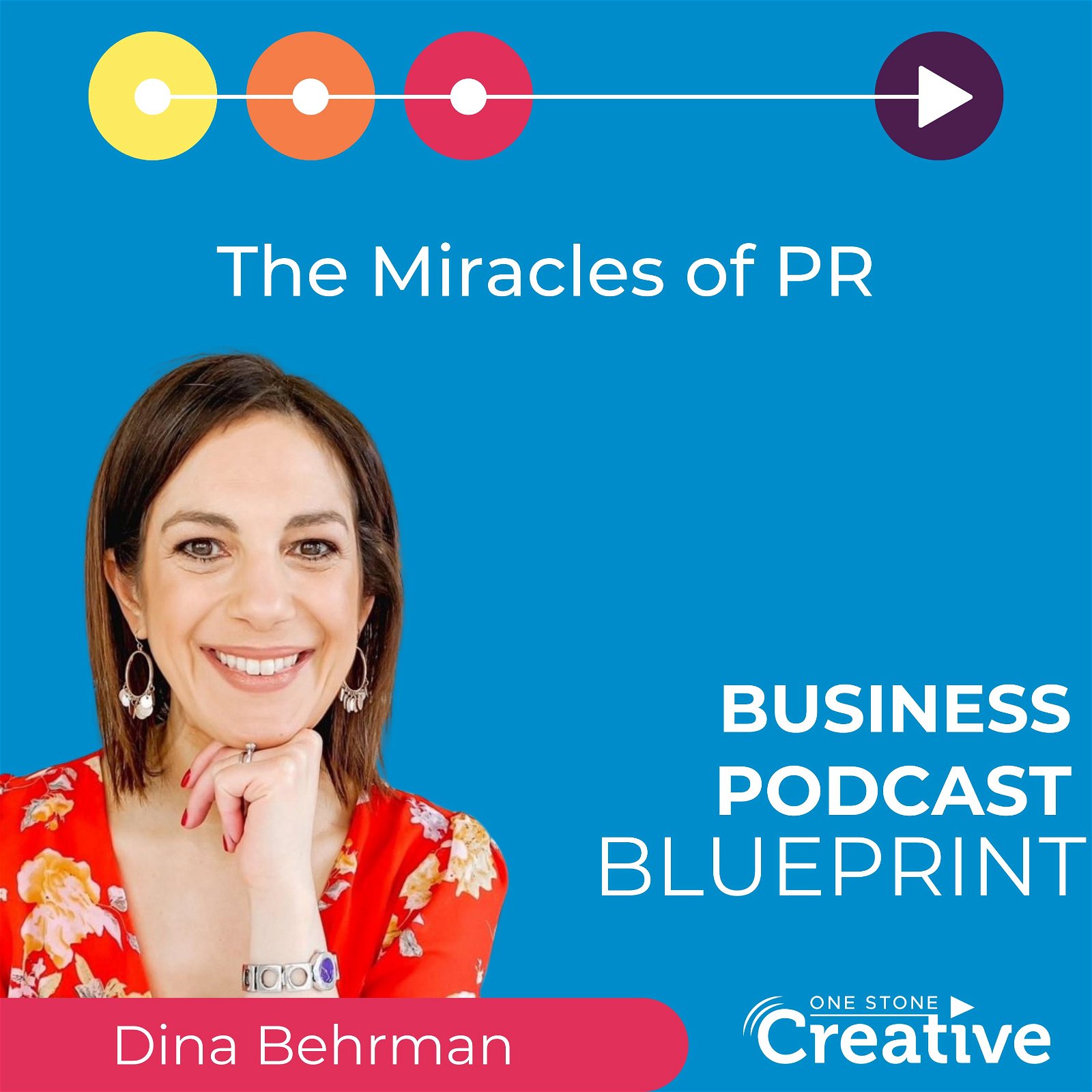
The Miracles of PR with Dina Behrman
This week’s guest, Dina Behrman, is a former journalist turned PR strategist and publisher. Dina works with entrepreneurs who want to inspire millions, skyrocket their visibility and attract more clients. Today we’re talking about her publishing company and the collaborative books that she creates with entrepreneurs and experts from around the world, as well as how to feel comfortable putting yourself out there, being visible, and engaging in awkward PR activities.
Tune in to hear Dina and I explore:
As the face of your brand, you have to put yourself out there so people can see you as an expert in your field. Actively seek out media opportunities to showcase your expertise and to share what motivates you and your journey.
Being a podcast guest is an excellent way to promote your own story. Dina says that the best way to maximize your appearance is to share your story and expertise from the human interest angle. Your message will resonate with the audience.
Once you find your story that attracts your niche audience, use it on all your social media, such as the about page on your website or pinned posts on social media platforms.
Repeating your content can save time, but it can also be harmful. You may be pitching the same story to different media outlets, but tailor your pitch to each platform.
Question of the Week
Q: How should I name my podcast?
A: Naming your podcast is one of the first big decisions that you have to make right after you decide to launch your show. It feels more high stakes than it actually is for most company shows. It's not unimportant: of course, you want a name that communicates what the show is going to be about and who it's for. But it's not the be all and end all: the success or failure of your show doesn’t hang on the name you choose.
There is a quality you should try to capture with your podcast name and that is stickiness. Stickiness means that it's easy to remember and to say. It's great if you can have it, but not the end of the world if you don't. Easy to remember happens when you're using words, phrases, or names that have meaning for your audience.
RESOURCES
One Stone Creative | LinkedIn | Twitter | Facebook | Instagram | Website
Dina Behrman | LinkedIn | Twitter | Instagram | Facebook | Website
00:0004/11/2022
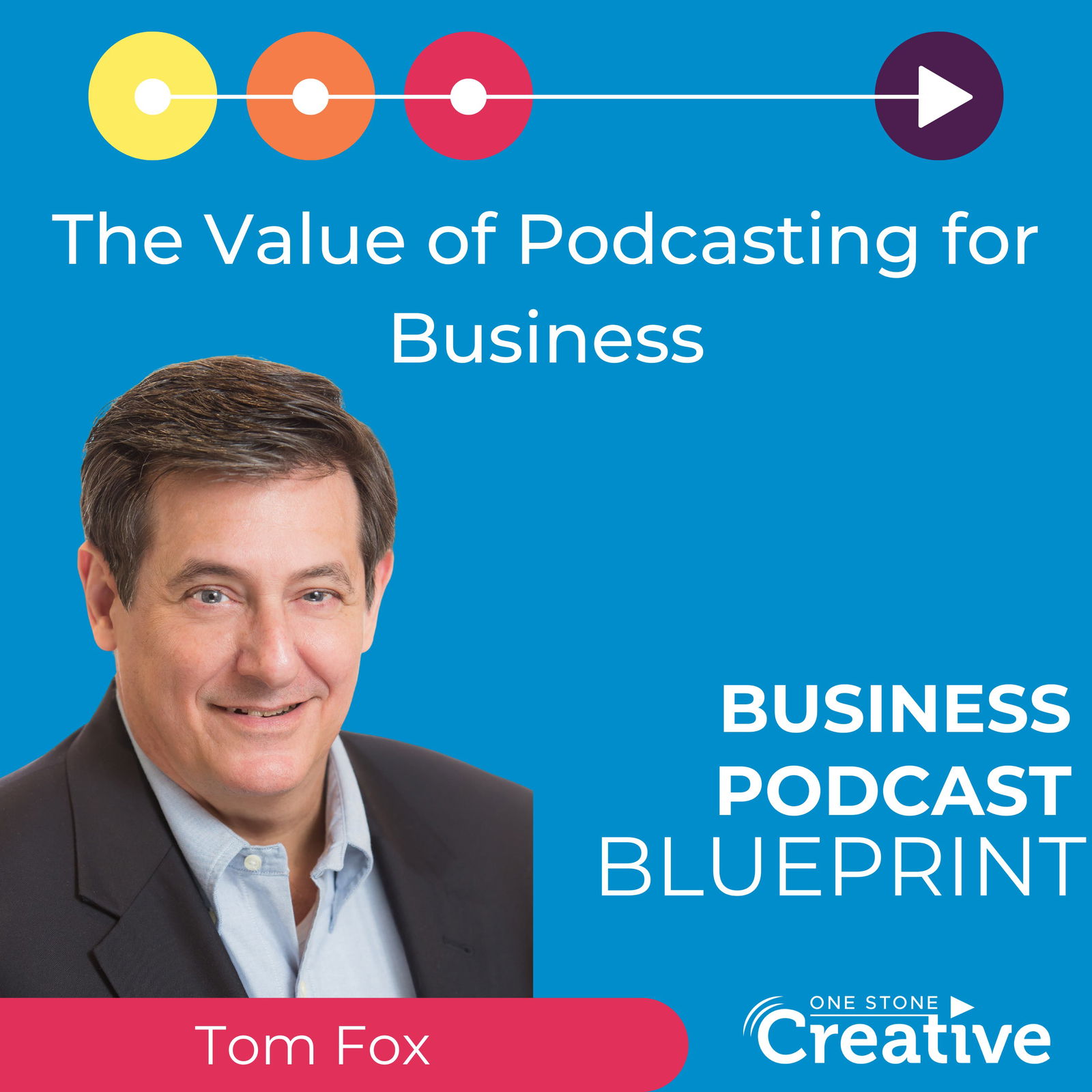
The Value of Podcasting for Business with Tom Fox
One of the things I love most about podcasting is the way you can use it as a vehicle to make connections - something that is very important in the world of business. This week’s guest, Tom Fox, is my partner-in-crime for our upcoming Podcasting for Business Conference. Tom is hailed as the Voice of Compliance, serving and evangelizing for the compliance community for over 15 years. He is the founder and creator of the Compliance Podcast Network. We talk about the value of podcasts for business, how we came up with the idea for the conference, and where you can learn more about the event.
Tune in to hear Tom and I explore:
The Podfest Global Summit is an amazing event, but it wasn’t easy for our clients to attend because of time, money, and resource constraints. Tom and I figured we could host our own conference, but virtually. We started reaching out to people and before long, we had a great line of speakers to join us in November.
A hallmark of the conference is its accessibility. The action-packed, easily digestible presentations are relevant to many parts of your business.
Podcasting allows you to use a variety of strategies to get your message out; for example, repurposing content on various platforms.
Authenticity is fabulous, and that’s how you’ll find your voice: by being you.
Building relationships with guests is one of the benefits of podcasting. If you invite someone to share their story, you will get a response.
Get the full notes at: https://onestonecreative.net/35
For More Information:
Head to PfBCon.com to register or learn more about the conference.
RESOURCES
One Stone Creative | LinkedIn | Twitter | Facebook | Instagram | Website
Tom Fox | LinkedIn | Twitter | Website | Blog
00:0028/10/2022
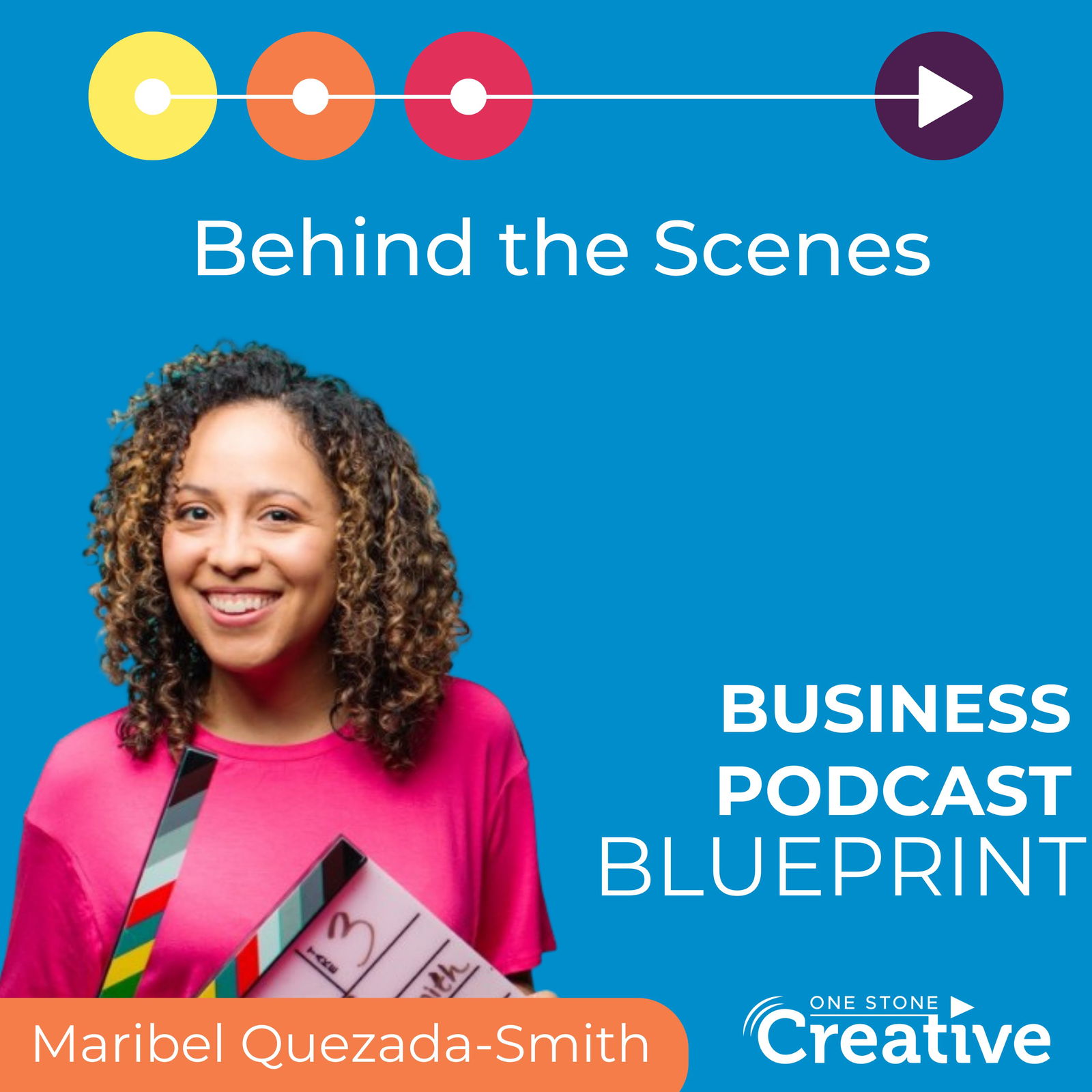
Behind the Scenes with Maribel Quezada-Smith
We’ve all heard the old adage “communication is key,” but did you know it also applies to podcasting? This week’s guest Maribel Quezeda-Smith is an expert in all things podcast production, with a demonstrated history working in television, documentary, and social media. She is co-founder of BIPOC Podcast Creators and co-host of the Pulso Podcast. We talk about editing, scripting, recording, and using different mediums for different types of communication. Maribel also shares insider knowledge she has gained from 16 years of experience.
Tune in to hear Maribel and I explore:
Working in podcast production has made Maribel an “audio snob,” she claims. Now that she knows what works and what doesn’t, she’s more sensitive to errors or mistakes in audio. One pet peeve of hers is upspeak; this is when a person's intonation rises at the end of a statement. Done too often, it can give the impression that the speaker isn’t sure of what they’re saying.
Production is all about process and thought. Everything you see on television in a show was predetermined - somebody put it there for a reason. When you're producing a show, you're trying to control the outcome because you know the audience is looking for specific types of outcomes.
You don’t have to deliver every single line perfectly. Even if the conversation doesn’t flow in the way you want, or it’s not synced up right, you can always edit it to improve the quality.
Having an intro in every episode is important! New listeners are just now chiming in - they need to know who you are and what your podcast is about, and they’re more likely to click the most recent episode. They’re not going to dig through your episode list for an introduction.
Successful productions and content creators all have one thing in common that significantly contributes to their success: consistent creating.
Question of the Week:
Q: What day of the week should I release my podcast episodes?
A: Almost as soon as you decide to podcast, you need to decide when you want your episodes to be released and if you want to go really high level. The day or time you release doesn't matter as long as you pick a particular schedule and you stick to it. The most important thing is a schedule you and your team can keep to over time.
RESOURCES
One Stone Creative | LinkedIn | Twitter | Facebook | Instagram | Website
Maribel Quezada-Smith | LinkedIn | Twitter
00:0021/10/2022
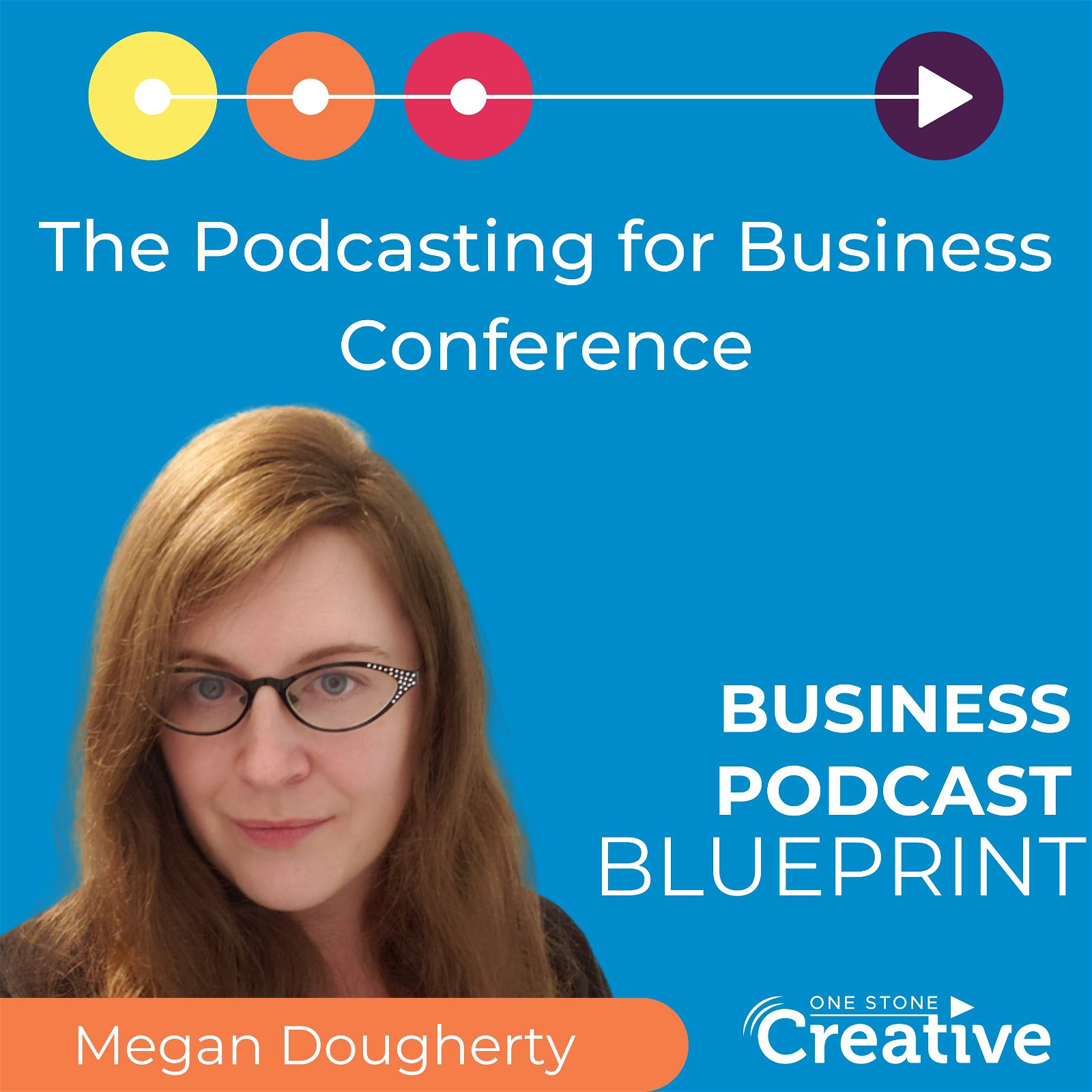
The Podcasting for Business Conference
I’ve been to a fair number of podcast conferences over the past few years. I really like them. They are filled with people who are passionate and knowledgeable about the art and craft and business of podcasting. If you ever have a chance to travel to one of the events, it can be a fantastic experience, and you can meet interesting people, learn important skills and strategies, and generally be a part of the scene.
But there is a problem with in-person and big “everyone’s welcome” events, with scores of presentations dealing with all elements of podcasting.
They can be a little hard to work into a schedule when you have a whole business or department to run, and because there are so many people podcasts for different reasons- a lot of the content is going to be great - but not for you.
That’s why I’m pleased to announce that in about a month from the airing of this episode, we’ll be running the first Podcasting For Business Conference - all virtual and all recorded, in collaboration with Tom Fox of the Compliance Podcast Network.
Meet the Speakers!
Get the full notes at: https://onestonecreative.net/33
RESOURCES
One Stone Creative | LinkedIn | Twitter | Facebook | Instagram | Website
00:0015/10/2022
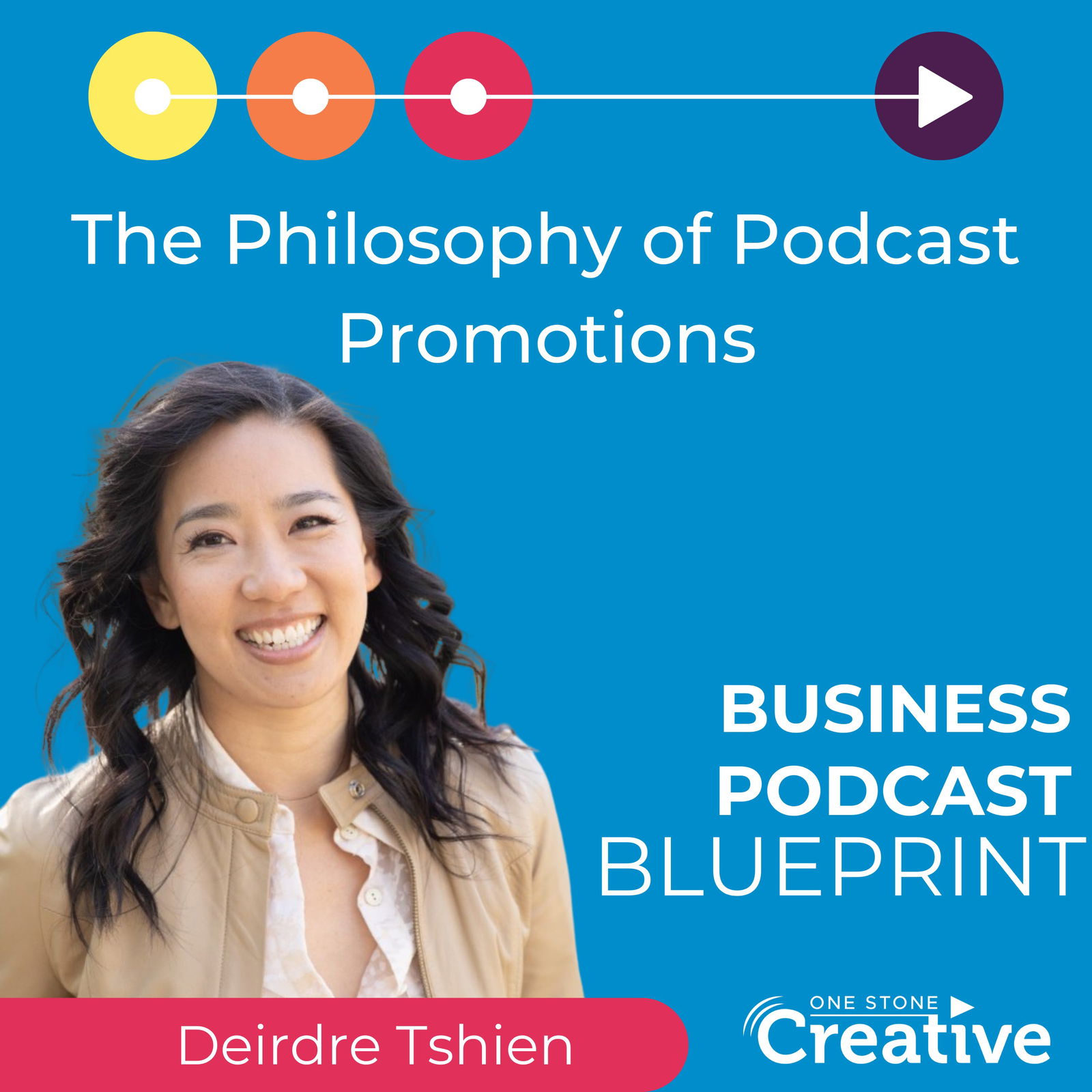
The Philosophy of Podcast Promotions with Deirdre Tshien
This week’s guest, Deirdre Tshien, is the host of the Grow My Show podcast and the CEO and co-founder of Capsho, a revolutionary AI-powered podcast copywriting tool. She is an influential, recognized authority on growing companies and building communities on the internet. In this week's show, she and I are talking about creating social content, principles of content, and her approach to building an audience.
Tune in to hear Deirdre and I explore:
Capsho is an AI-powered software that makes promoting your own podcast easy, so that hosts can focus on interviewing, networking, and growing. It helps experts create their episode title, description, show notes, social media posts, and promo emails – by just using the audio file.
Deirdre doesn't believe in repurposing content when promoting her shows. She urges creators to look at what works for successful accounts in their field and apply it to their own work. Otherwise known as content hacking.
Megan asks Deirdre how she plans her podcast episodes and social content. She explains that she has a virtual assistant, who helps her with content creation, recording and editing, publishing, and content hacking.
What indicates the success of a podcast? Deirdre explains that podcast traffic is a good indicator of success. You have to look at the details of your post itself – its engagement levels and reach. The number of clicks you have on your content is a key performance indicator.
Question of the Week
Q: What if an interview didn't go well?
A: Maybe they said some things that you would really not be comfortable airing. Or maybe the discussion just fell flat for any of a dozen possible reasons. Sometimes two people can just fail to have an interesting conversation, despite the best efforts of all. As a podcast host, you're faced with a decision. Can you air it? Should you? Here are some guidelines to help you make that decision. If the content was just not good, scrap it. Not every episode needs to see the light of day, and it's your show. You're responsible for the quality of what goes out there. Explaining that to the guests can be a bit of a challenge, especially if you're trying to build a relationship with them. If you do want to give the interview another shot, try to have another conversation that's going to sound better.
RESOURCES
One Stone Creative | LinkedIn | Twitter | Facebook | Instagram | Website
Deirdre Tshien | LinkedIn | Instagram | Capsho
00:0007/10/2022
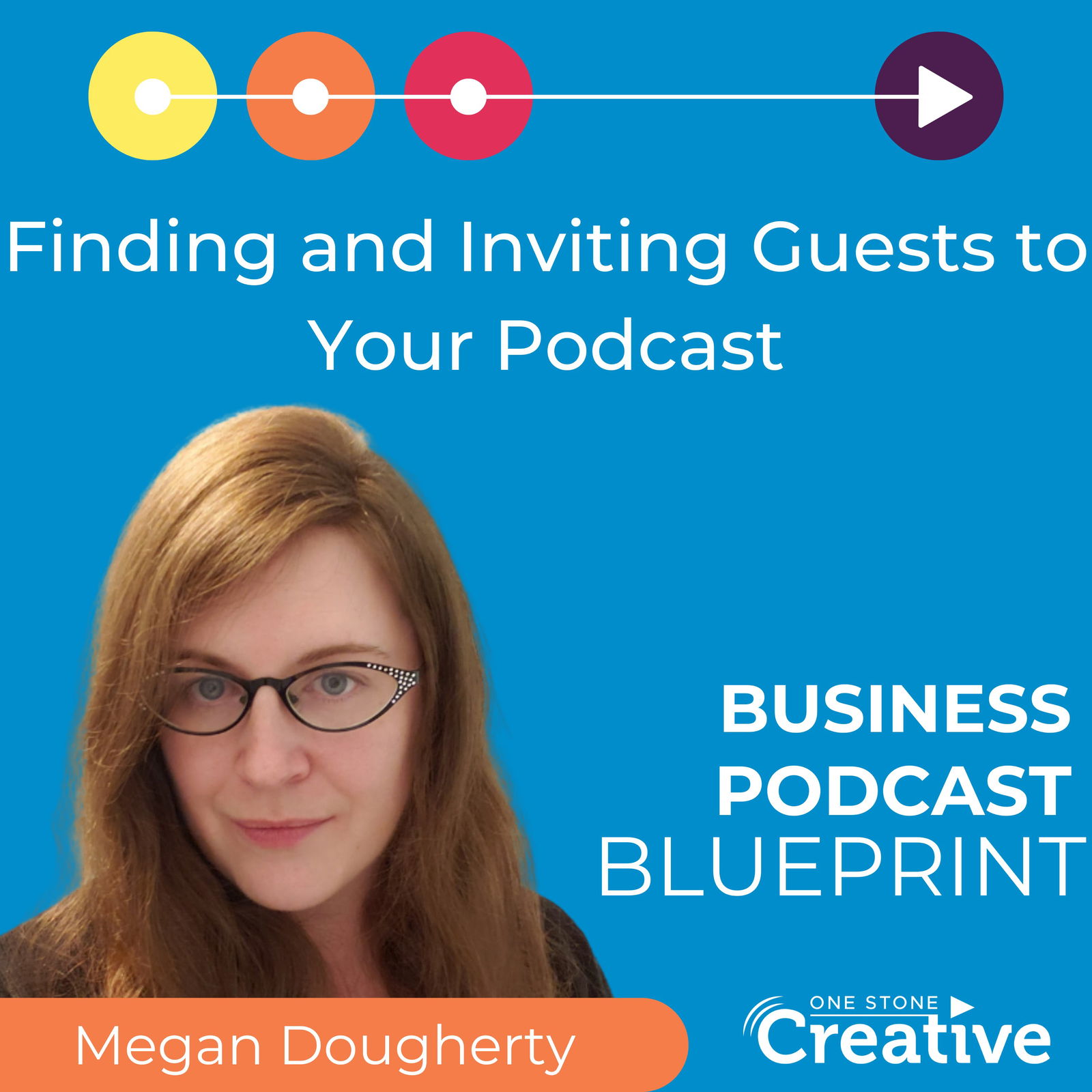
Finding and Inviting Guests to Your Podcast
Asking a stranger, especially one that is well-regarded in the industry, to join you on your podcast can be a little nerve-wracking. Imposter syndrome is real, and especially if you haven’t been podcasting very long, it can feel like a big, high-risk ask.
Most people, most of the time, however, are perfectly willing to join you for a podcast episode, and it’s always flattering to be asked, as long as a little research has been done, and the ask is well-constructed. That’s exactly what we’re talking about today on the Business Podcast Blueprints Show.
Get the full notes at: https://onestonecreative.net/31
00:0030/09/2022
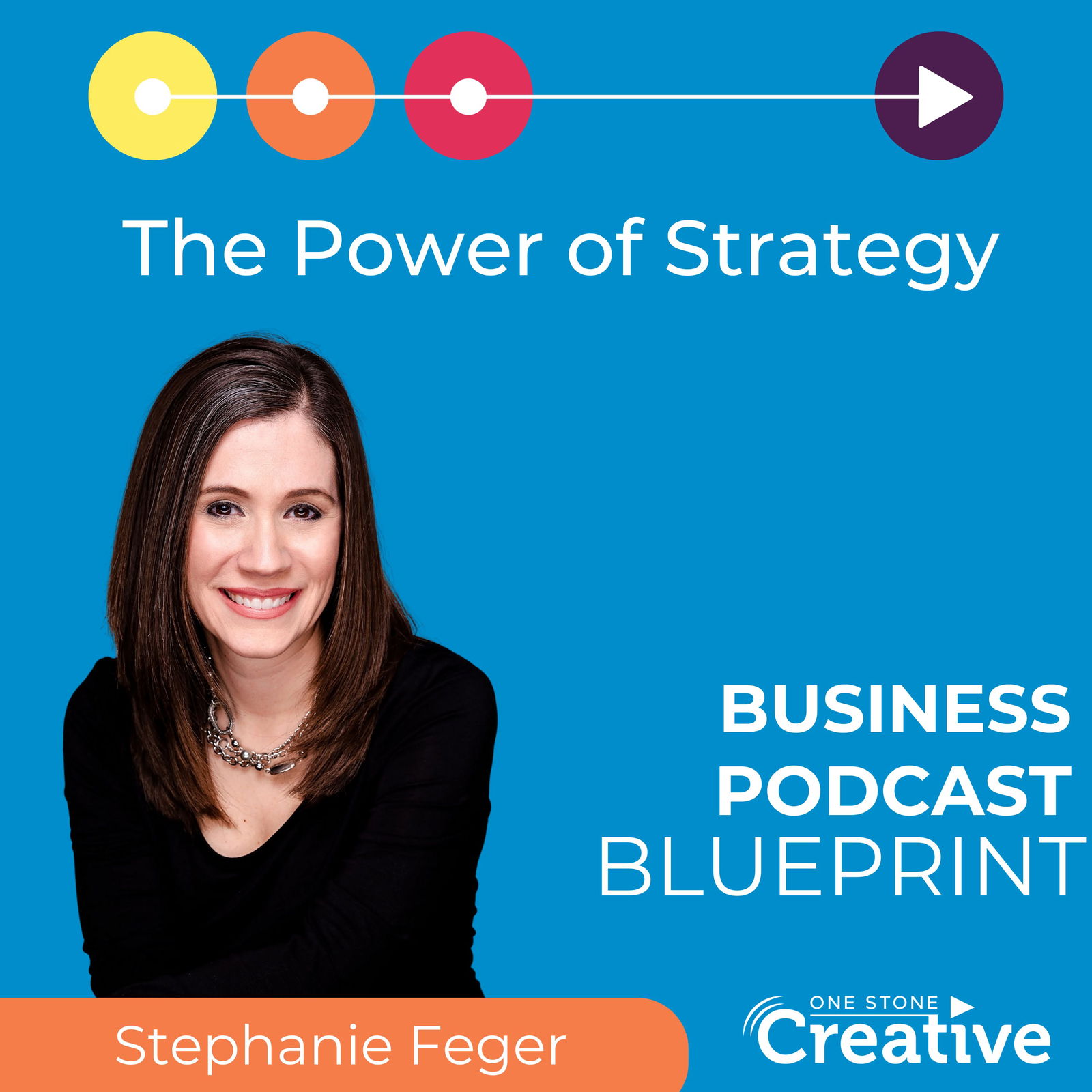
The Power of Strategy with Stephanie Feger
This week’s guest Stephanie Feger uses a capsule podcast strategy, and it’s working like a charm! Stephanie’s approach of hyper-specific and thoroughly planned out episodes and seasons to teach and engage current and future clients is exactly the kind of use case we want to see for audience engagement podcasts. Stephanie is also a book marketing strategist and coach for nonfiction authors; she is an author herself, and a keynote speaker. She hosts “The emPowered Author: A Marketing Podcast for Nonfiction Authors” that empowers authors to take their important message and share it with those who desperately need it. We’re also talking about content planning strategies and the value of presentation and speaking skills.
Tune in to hear Stephanie and I explore:
When you come across a hurdle or don’t know what you’re doing, just try something. Too many times we get caught up on the outcome, when we should be focusing on the action. The outcome will come! But the action will help you get there.
The emPower PR Group is a marketing, coaching and support business for nonfiction authors, and its supporting podcast is a part of the business strategy. Each season is based on the type of marketing work they do, and is in alignment with an element that an author may or may not need. It’s meant to add value to the people who are thinking about working with emPower PR.
Stephanie uses the emPower Podcast in the onboarding process. If a client shows interest in a specific tool or strategy, she refers them to the season of the podcast that covers that strategy. That way, the client grasps an idea of the technical side of things that Stephanie and her team handles, and they can talk about the client’s work.
Stephanie doesn’t get hung up on metrics like downloads. The way she sees it, the success of her show shows itself in her business, which has almost tripled in growth over the year. Those numbers are much more meaningful than downloads, especially for a business podcast.
If you don’t enjoy it, don’t do it, Stephanie advises. People will hear it in your voice, in the content you put out. Even if you have a great message, people won’t want to listen if they can hear that you’re not into it. The best podcasts are relational, not transactional.
Question of the Week:
Q: How do ads work in podcasts?
A: Lots of podcasts have ads. They can be for your own products and services. For sponsors, they can be ad swaps or promotional exchanges with other podcasters. Whatever the content of your ad, you have to make a few decisions about it. Do you want ads to be baked in as a permanent part of the episode? Or do you want them to be dynamically inserted and subject to change at a later date? Dynamic ads that can be changed later are more popular and, on balance, better for you as a podcast owner. Your podcast host should let you know if you have that capability. For both permanent and dynamic ads, you can have them either be pre-produced and ready to go and be inserted, or host read.
RESOURCES
One Stone Creative | LinkedIn | Twitter | Facebook | Instagram | Website
Stephanie Feger | Website | LinkedIn | Twitter | EmPowerPR Group
00:0023/09/2022
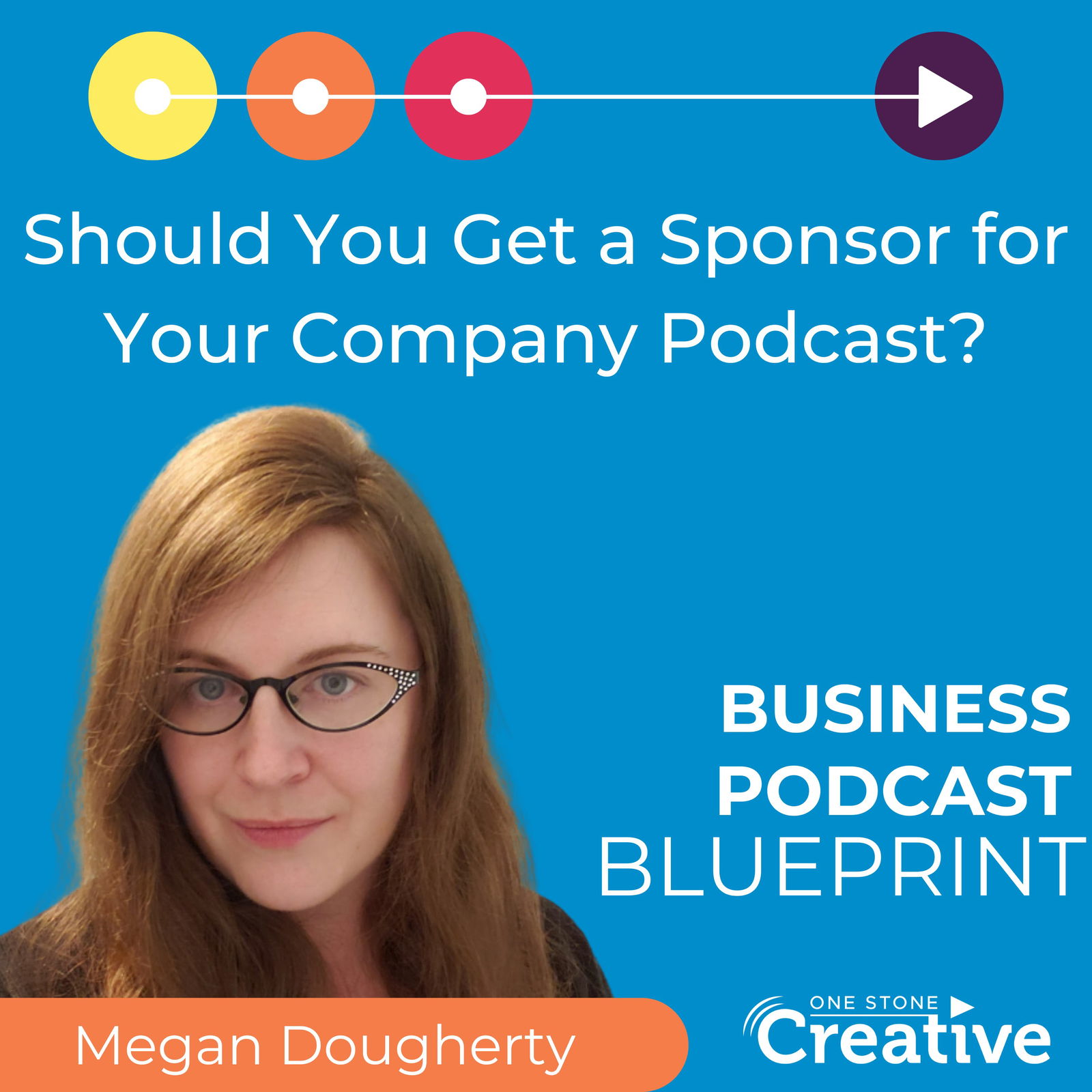
Should You Get a Sponsor for Your Company Podcast?
There comes a time in many podcaster’s lives when they look at their show and their audience and their expense line items and think: I should get a sponsor.
Running ads and having sponsors for your show can be a good move - but it isn’t in every case, especially for a podcast you’re running in support of your business. While ads are very common in podcasts, audiences don’t *love* hearing them, and that airspace could possibly be used more effectively for your company. Tune into today’s episode to learn about the different kinds of podcast ads and sponsorships, and how to decide what, if any, are right for you.
Get the full notes (and some handy resources!) at: OnestoneCreative.net/29
00:0016/09/2022
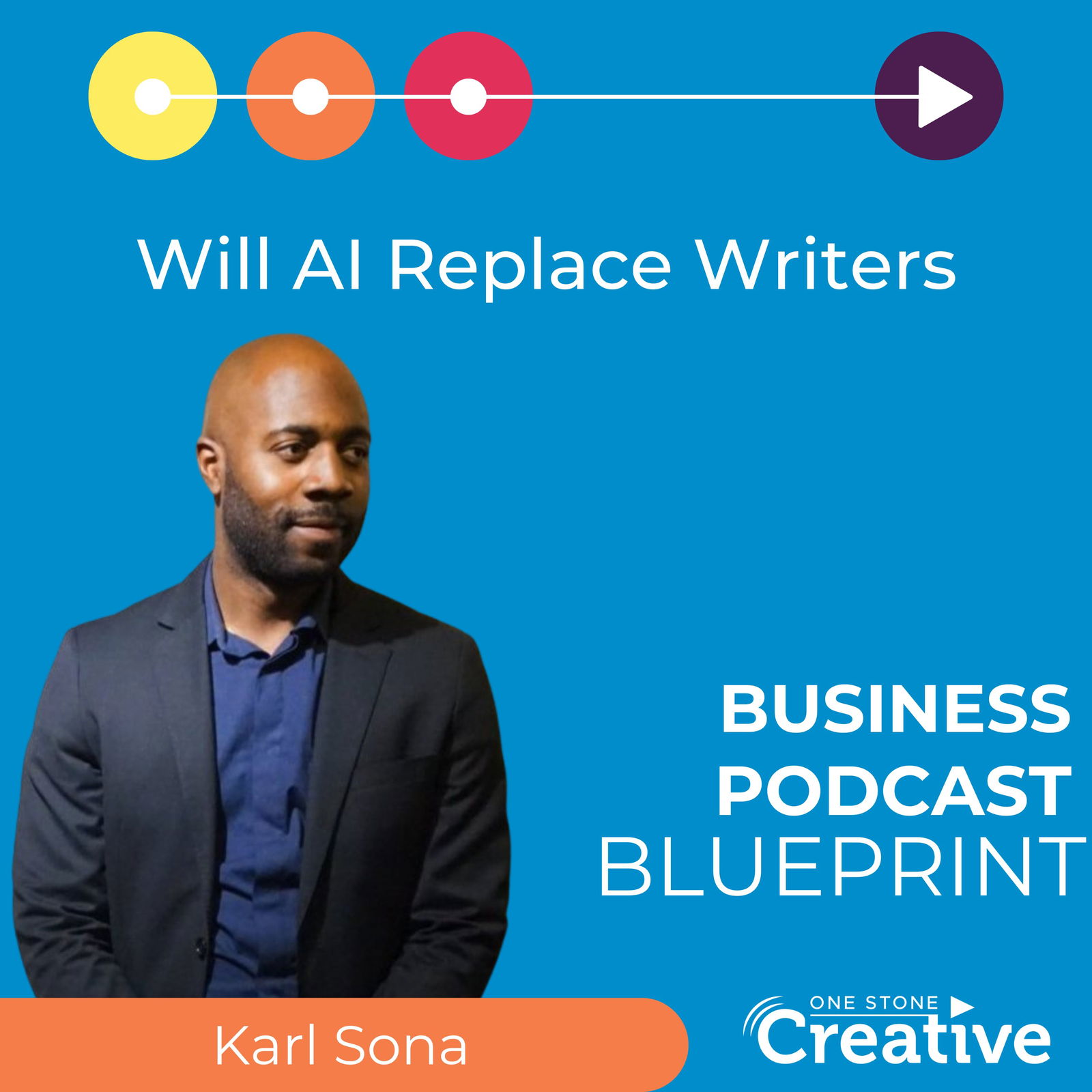
Will AI Replace Writers with Karl Sona
Imagine the possibilities if we could produce podcasts on demand with AI. There’s no doubt that human creativity will always play an important role when it comes to crafting engaging content, but new tools are helping podcasters overcome one major bottleneck: show notes and social copy from episodes themselves! This week's guest, Karl Sona, has been working hard creating AI tools for podcasters - his company Streamlined Podcasts creates professional quality audio programs using AI. Karl is also the creator of the PodNotes service and hosts the Dear BLK CEO podcast which highlights underrepresented business owners who are scaling their companies by getting access to corporate contracts. We're also talking about how you can measure your ROI from podcasts as well as the future of podcast technology.
Tune in to hear Karl and I explore:
The aim of a podcast is to provide useful information that is interesting and relevant. Many creators forget this crucial element in their content, which leads audiences away from their show quickly after listening!
Creating a podcast is an economical way to attract your ideal clients. “One out of 10 of those podcasts leads to business getting done,” Karl remarks. Furthermore, the content you produce is evergreen and can be used as a way to attract more clients or create positive referrals for your business.
PodNotes is a tool that helps podcasters generate show notes for their finished audio in minutes. With the click of your mouse, you can upload your podcast into PodNotes and get blog posts and social media captions on autopilot. If you’re not happy with the initial results, then just regenerate them yourself!
Karl believes that AI is an exceptional tool for content creators and writers who are looking to create quality work that is on time, and that meets the needs of their clients. It can also help us build better relationships with our audience members.
Karl sees that soon AI will help us make our content more personalized and relevant. By analyzing other content that our ideal customers are creating online as well as their demographic information, we will be able to create new marketing strategies that will be precisely targeted to them.
Question of the Week
Q: What’s the best way to improve my recording space with no budget?
A: There is a lot we can do to prevent sound from bouncing around in our recording studio, but one of the best solutions comes down largely to how you plan out your space. Make sure there’s plenty of soft furnishings including rugs or blankets placed strategically across flooring surfaces and propped up against furniture at corners where wall treatments may not be possible - this will help absorb vibrations when necessary! Another idea is to record in your closet - clothes make effective dampeners. If you can, get a package of base traps from Amazon or an acoustic treatment retailer: this one-time investment will pay off for years and increase your sound quality. Be sure to check out our episode, Getting Good Sound, for more advice.
RESOURCES
One Stone Creative | LinkedIn | Twitter | Facebook | Instagram | Website
Karl Sona | Website | Instagram | LinkedIn | Streamlined Podcasts | Dear BLK CEO podcast
00:0009/09/2022
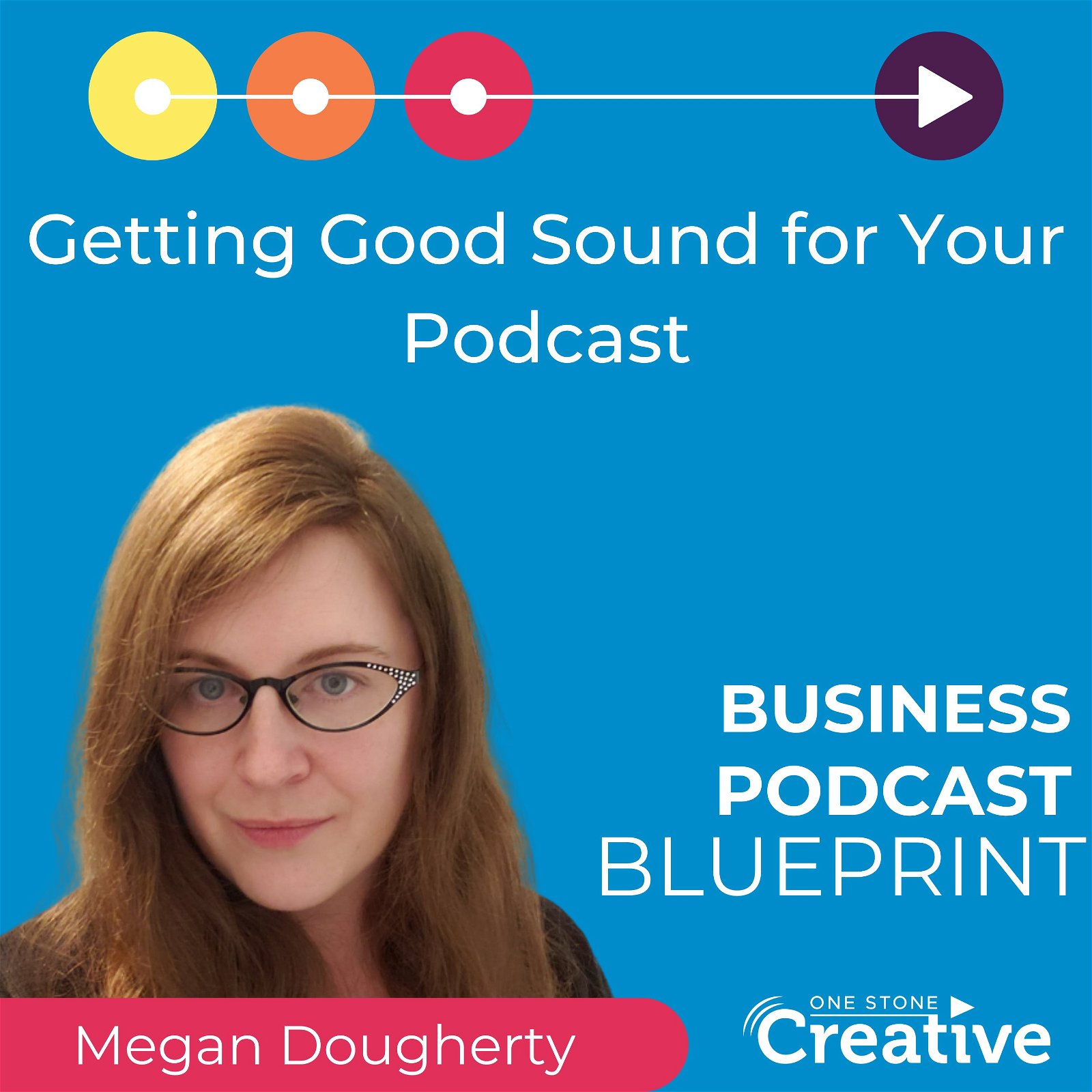
Getting Good Sound for Your Podcast
Having good sound is table stakes for your podcast - there is an expectation among audiences and guests that you’re going to sound professional. Getting good quality sound isn’t the easiest task in the world however - you need to optimize your recording setup, and the room you’re recording in as much as possible. On this episode of the Business Podcast Blueprint, Megan Dougherty is sharing how to choose a good mic, record the most effectively, and prepare your recording room so you sound as good as possible.
Get the full notes (and some handy resources!) at: OneStoneCreative.net/27
00:0002/09/2022
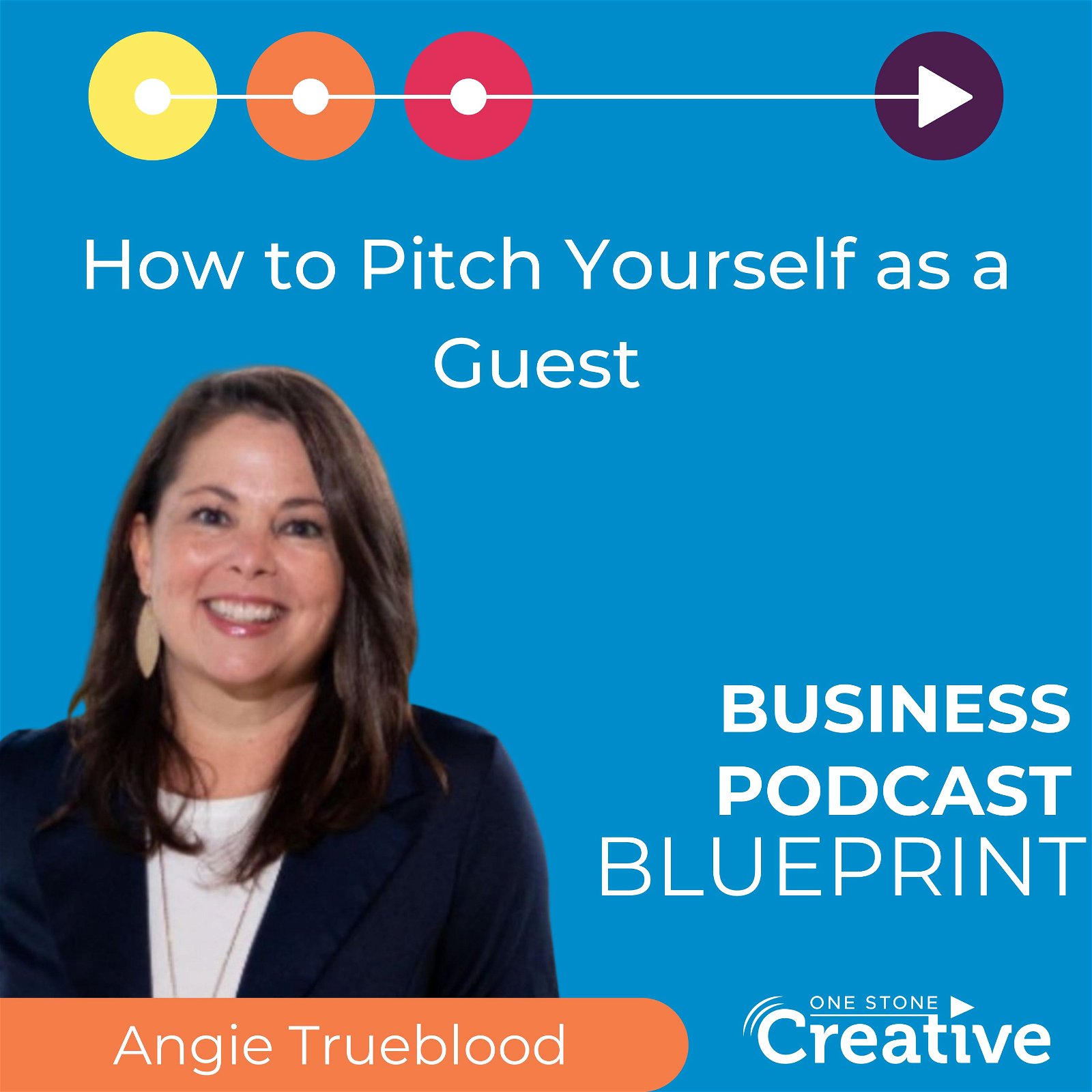
How to Pitch Yourself as a Guest
Growing your audience and your professional network is always a hot topic in the business podcast community. A great way to do this is by being a guest on other people’s podcasts. But how do you pitch yourself to a host of a complementary podcast? Today’s guest is a master in the art of guest pitching and using those relationships to grow your business. Angie Trueblood joins me today, on the Business Podcast Blueprint show!
You’ll hear us talk about:
What is the ideal way to pitch yourself for a podcast? Angie says that the most basic piece of advice she can offer is to pitch yourself for guest positions on complementary podcasts that are relevant to your field. In your pitch email, provide a relevant topic suggestion and a description of yourself that includes your intent. For bonus points, include a sample of your audio - how do you sound recorded? That is valuable information for a host.
Your pitch should present your idea that you believe can serve the host’s audience. The host you’re pitching should feel like they're missing out if they don't cast you. Be sincere because most people respond to a genuine pitch.
Angie suggests a maximum of 2 hours per week to plan two strong pitches. The Podwize Group has a “four-to-four” approach. “After consistently getting acceptances for your pitches, roughly calculate how many pitches you need to send out to land four guest opportunities a month,” she tells listeners. This builds your visibility and exposure, as well as your professional network consistently and sustainably.
Advice on how to be a good guest on a show.
Question of the Week
Q: How do I prepare to conduct an interview with someone I don’t know well?
A: Interviews sound better when they are planned and prepared for with specific goals in mind. Take advantage of your guest’s expertise, and set them (as well as yourself!) up to sound great by thinking about what you want to communicate.
Here are some things to consider:
What does this person know that I don’t?
How did they learn, or develop that skill or knowledge?
What do they recommend people do to be successful at their area of expertise? What are mistakes people should avoid?
What has this person done that I admire?
What might my audience want to know about their area of expertise?
What situations or events brought them to their current place?
Action Step From This Episode
Make a list of 20 different shows you might want to appear on and give yourself a “budget” of 2-3 pitches a week.
Also - sign up for the Podwize 5-in-5 Challenge! This is a free 5 day challenge, hosted by Angie and her team. It’s going to be a lot of fun.
RESOURCES
One Stone Creative | LinkedIn | Twitter | Facebook | Instagram | Website
Angie Trueblood Instagram | LinkedIn | Twitter | The Podwize Group | Go Pitch Yourself Podcast
00:0026/08/2022
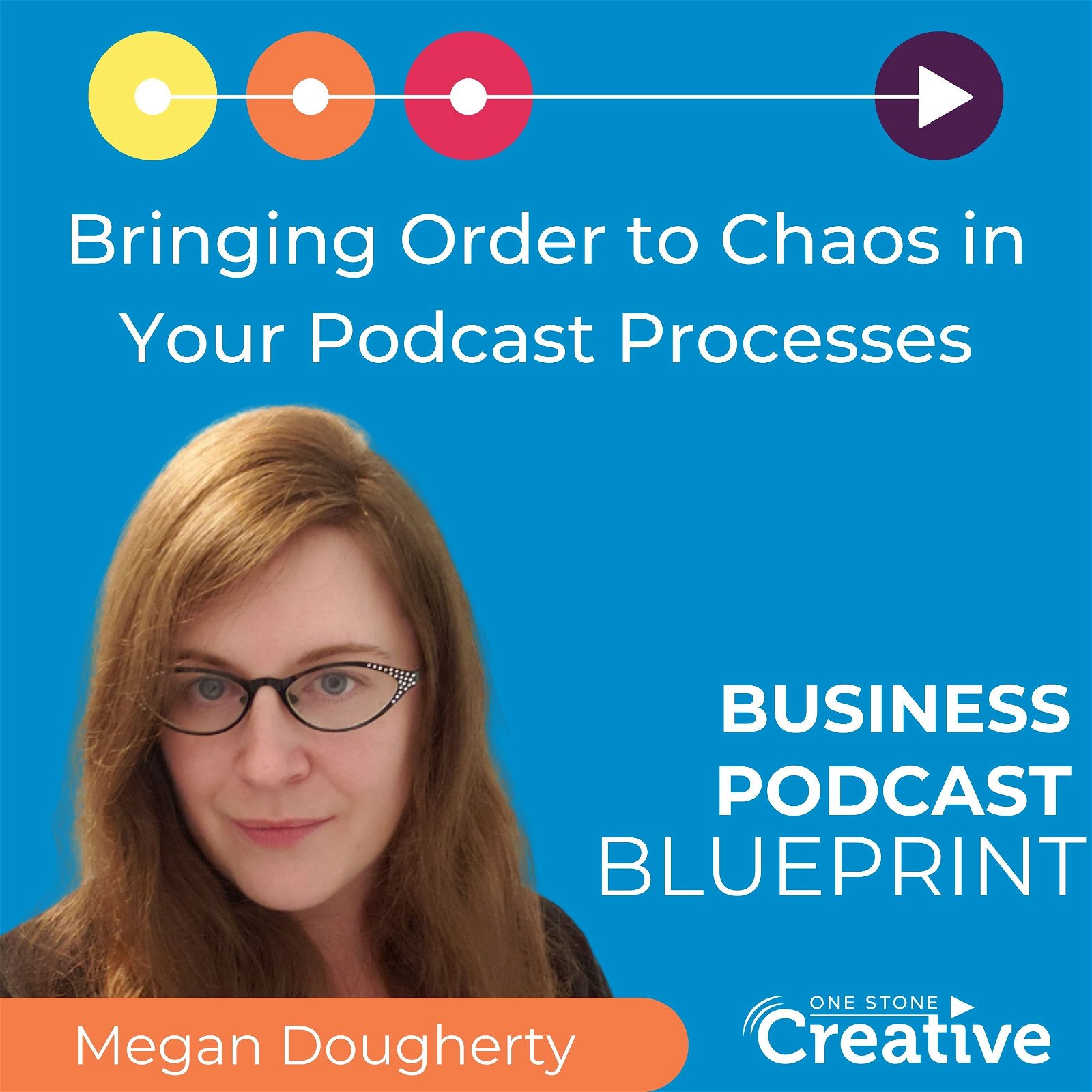
Bringing Order to Chaos in Your Podcast Processes
Today Megan Dougherty is talking about why you want to optimize and then automate your podcast workflow: so you’re getting the most work done with the least effort, and setting yourself up for smooth operations when unexpected events or vacations inevitably occur. You do this by identifying the steps in your current workflow, creating a single point of truth about your podcast called an episode guide, saving time with templates, creating clarity with project management systems, adding safety and redundancy with Standard Operating Procedures, wrapping up with automating steps in the process.
Learn more at OneStoneCreative.net/25
00:0019/08/2022
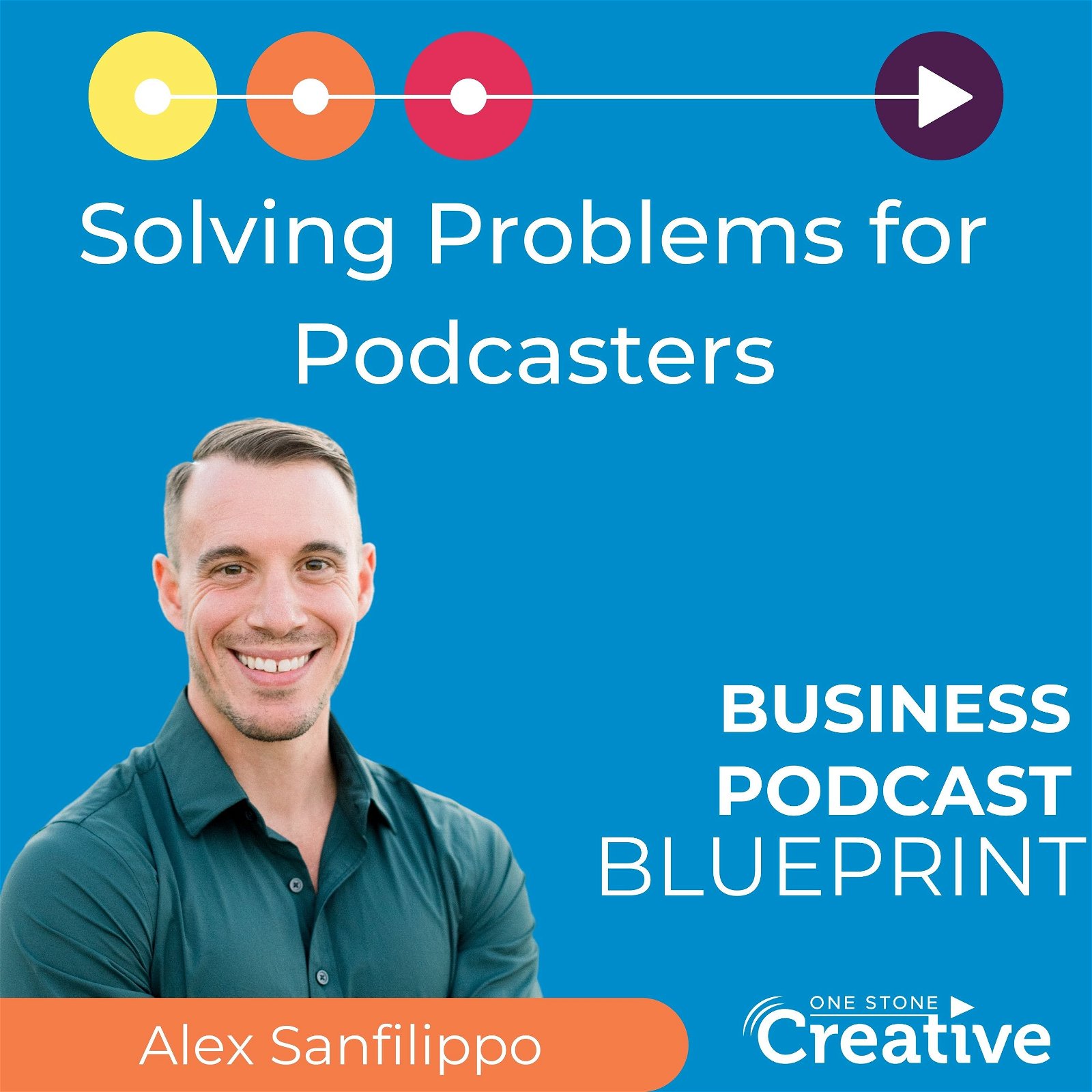
Solving Problems for Podcasters
For some people, like today’s guest Alex Sanfilippo, finding a recurring problem in business means fixing the problem permanently. In Alex’s case that meant building a software empire from the ground up. He is the host of the Podcasting Made Simple podcast and founder of the PodPros suite of tools which includes podmatch and podcastSOP. We chat about how he approaches solving common podcasting challenges, including how to manage the myriad tasks in your podcast as it grows. He also shares a bit about his next (Very Exiting!) project.
One Stone Creative | LinkedIn | Twitter | Facebook | Instagram | Website
Alex Sanfilippo Website | LinkedIn | Instagram
PodPros | Podcasting Made Simple | PodMatch | Podcast SOP
00:0012/08/2022

An Exhaustive List of Different Podcast Episode Formats - and When To Use Them.
Welcome to season 2 of the Business Podcast Blueprint Show! In the solo episodes this season, I’ll dive deeper into the theory of podcasting as a company and address various decisions a company podcaster must make. Today we’ll be discussing the different types of podcast show formats, how to create them, and which benefits your business the most.
Read a full transcript of the Episode, and find links to examples of each type of show at OneStoneCreative.net/23
00:0005/08/2022

Might as Well Get the Good One...
We're closing out season one of the Business Podcast Blueprint show. Today, Megan Dougherty is talking about the tools and tech we've used to create the show, what we've leanred, what we've bought, and what we'll do next.
00:0024/06/2022

Branding that Feels Great with Sabrina Chevannes
What makes a podcast truly stand out? Many people believe that being as close to your authentic self as possible, without feeling phony, is the way to grow your business. Today’s guest has extensive experience in creative branding and marketing and is here to offer advice on how to authentically be yourself in your podcast, social accounts, and business. Sabrina Chevannes joins me today, on the Business Podcast Blueprint show.
We’re discussing:
What makes the No Bullshit Talks podcast so unique? Sabrina explains that she was tired of hearing podcasters ask the same ten questions over and over, so she decided to create a series of interviews where she asks her guests questions other hosts won't dare to ask. The show is targeted to up and coming entrepreneurs and small business owners.
What branding means in digital marketing. Over the years, branding has become a diluted version of its original self and most clients underestimate what it really is. Sabrina says that branding is not just the visual element of your business – it's how people perceive your brand on an emotional level. It’s about making your customers loyal to your brand because they believe in the superiority of your product and your ideals as a company.
How to have successful branding as a small business? Sabrina advises that when you’re just starting out, creating a brand means knowing who you are as a company and an individual. You have to determine your passion, mission, and vision, and what makes you stand out from your competitors.
RESOURCES
One Stone Creative | LinkedIn | Website
Sabrina Chevannes | LinkedIn | Twitter | Instagram | Complex Creative
00:0017/06/2022

Metrics that Matter for Company Podcasts
If you ever wonder how to evaluate your success at podcasting for your business - this episode will help. Learn how to choose metrics that give you real, actionable information about the performance of your show.
00:0010/06/2022

How to Become the Recognized Authority with Alastair McDermott
To derive something valuable from your business podcast you must have a solid reason why you started. Today’s guest has extensive experience in marketing and is here to explain how he helps clients utilize podcasts to build their brand online and become the recognized authority in their field. Alastair McDermott joins me today, on the Business Podcast Blueprint show!
We’re discussing:
What does it mean to be the recognized authority? Alastair’s business and podcast are about guiding experts and consultants to become the recognized authority in their field. He explains that authority in your field is “recognition from people that you're the go-to person on something - you're an authority”.
What are the benefits of being an authority in your field? When you are seen as an authority, you can demand higher fees and choose your clients based on compatibility. Also, you have the liberty to change your business model and your clients will comply.
How can you establish yourself as a recognized authority in your field? Alastair has some pillars that he recommends to people to build this authority:
Start a podcast. He explains that it is more about formulating ideas on the topic and sharing it with a wider audience. That allows you to have recognition in your field.
Choose the topic you want to be known for wisely; do extensive research on that topic and become specialized in it, to dominate that area.
To become the recognized authority, you must do constant research through interviews, surveys, observation, and reading – you must be continuously learning about your field.
Authority marketing allows the sales process to be much smoother as clients will already be interested in your product or service because they trust you, since they listen to your podcast or watch your YouTube videos.
RESOURCES
One Stone Creative | LinkedIn | Twitter | Facebook | Instagram | Website
Alastair McDermott | LinkedIn | Twitter | Instagram | The Recognized Authority | The Recognized Authority Podcast
00:0003/06/2022

Introducing the Podcast Social Club
Creating a podcast and promoting a podcast are two entierly different beasts. Many of us find the former considerably more pleasant than the latter. But if we want people to listen, we need to tell people about our shows. So the team at One Stone Creative has come up with a way to make the promotional part of podcasting a little more fun. It's called the Podcast Social Club - and you are warmly invited. OneStoneCreative.net/PodcastSocialClub Use the code PSCLUB for 50% off for your first three months.
00:0027/05/2022

Giving Your Sales Team Superpowers with Rob Stevenson
Starting a company podcast can be a solid strategy for improving brand awareness, but it shouldn’t be the only way you derive value from your show. Today’s guest has extensive experience in B2B marketing, and is here to offer his advice on making a podcast an integral part of your marketing strategy. Rob Stevenson joins me today, on the Business Podcast Blueprint show!
We're discussing:
What makes B2B podcasts different? Rob responds that funding is the main difference. Because B2B shows are funded, they can contribute to a holistic content marketing strategy in a way that most other shows cannot.
What you should know before starting a company show. Identifying your show’s purpose should be your first priority, because you can’t fix it if you don’t get it right early on. Also, your company CEO should not necessarily host the podcast. Rob clarifies that while it can work in some situations, the biggest thing to consider is your CEO’s availability to record.
How sales teams can utilize podcast content. Due to the relationships that are created between hosts and featured guests, a podcaster can access an enterprise VP with greater ease than a salesperson. “You can succeed as a podcaster where sales can’t,” Rob says. However, it is crucial for the sales department to be on board with this strategy so they can follow up with these individuals.
RESOURCES
One Stone Creative | LinkedIn | Twitter | Facebook | Instagram | Website
Rob Stevenson | LinkedIn | Twitter
00:0020/05/2022

How to Choose Your Podcast Content (And Format, and Assets and Marketing)
In our show’s debut, I discussed how having high-level podcast goals can help you make decisions about your show. Now, in this episode, I’d like to dive a little deeper and explain how you can factor in the overarching purpose for your podcast when designing episodes, to offer maximum value to your business. That’s that we’re talking about today on the Business Podcast Blueprint Show!
We're discussing:
Thought leadership shows: The aim here is to increase your reputation in your industry by presenting both your podcast and host as an authority. For a thought leadership show, your conversation with your guest should demonstrate that you are equals. Show notes should include the most important things that your host and company has to say about your topic area - information that you want to be associated with your brand and podcast. Generally, avoid ads and sponsors, unless it’s a company you have a great relationship with, and one that won’t deplete the value of your show. If you include ads, make sure that they are host-read. Promotion assets should be key quotations and insights that illustrate your perspective. Lastly, it’s important that you invest in both production quality and repurposing.
Business development/Relationship-building shows: This type of podcast is used to get to know other people in your space, and nurture those relationships. The format is almost exclusively interviewing, where you direct the spotlight to your guest and focus on what they bring to the table. The same principle applies to show notes: include guest links, key points that they made, and quotations where they shine. Use ads and sponsors mainly for promoting your guests’ or your own products and services. Promotion-wise, showcase the guest - their content, company, and what else they’ve done that makes them worth listening to.
Audience engagement shows: These podcasts are about connecting with an audience that you already have. You can produce any kind of content, as long as it is engaging your audience. This type of show requires careful attention to your metrics and traction, to ensure you’re reaching your goals. Consider ways to involve your audience in the show, such as an audience question segment or reading comments. Show notes should be similar to thought leadership podcasts: focus on what your audience needs, like the action steps and key points that you've covered. For audience engagement shows, guests are optional and any type of ads or sponsors are fine. Promotional energy should be directed to disseminating your content, including through paid traffic.
Content shows: If your main goal is creating content, your show can take any format as long as it is reasonably repurposable and connected to your work. Show notes are a strong pillar of content shows, so make them as detailed and expansive as you can. Guests can be useful to expand the range of topics you create content on, but are totally optional. Any type of ads or sponsorships are fine. Invest in your assets and social content, such as your audio quality and repurposing.
RESOURCES
One Stone Creative | LinkedIn | Twitter | Facebook | Instagram | Website
The White Coat Investor | Blog (Check out the amazing show notes!)
Why Even Podcast?
Turning Business Goals into Content Metrics
00:0013/05/2022

Maximizing your Creative Energy to Serve Your Audience
In a business where it’s important for people to know, like and trust you to get the job done, a podcast goes a long way. Content that demonstrates your knowledge can be hugely valuable when seeking out new opportunities - not to mention the endless networking possibilities. My guest for this episode is Olivia Cook, a Transformational Success Coach and NLP Practitioner who runs a great podcast, The Empowered Woman - Badass & Unfiltered. She joins me on this episode of the Business Podcast Blueprint Show to talk about podcasting for your business, her experiences podcasting during the pandemic, and an interesting strategy for optimizing your content creation around the monthly cycles may of us have.
We're discussing:
A business-podcast relationship: Olivia reveals that her podcast helps her to expand her clientele, because of the kind of content she produces. Speaking with these high-level individuals provides an extra resource for learning about many different topics.
Two-part booking: “I like to build relationships with people,” she says. Olivia prefers to give her audience authentic conversation, and enjoys getting to really know her guests in preparation for the podcast episode.
How podcasts affect public speaking: Olivia does her own editing, allowing her to recognise her weaknesses and work on them quickly. Having all of these insightful conversations with guests also helps her to further expand her market, equipping her with the ability to have something to say in post-pandemic interactions.
Creating content around your menstrual cycle: Olivia batch-films content on her ovulation day, because that’s when you’re scientifically more attractive and possess greater creative energy. Tracking your cycle can help you out when running your business, allowing you to identify your best and worst days and schedule around them.
Maintaining consistency with your releases: As a podcaster, knowing your why is crucial. It’s a big commitment that requires time investment, and you must allocate the necessary time to ensure that you are able to execute your ideas the way that you want to. Be honest with both yourself and your listeners, and find what works for you.
RESOURCES
One Stone Creative | LinkedIn | Twitter | Facebook | Instagram | Website
Olivia Cook | Website | LinkedIn | Youtube | Instagram | Facebook
Your Parenting Mojo
00:0003/05/2022

Your Podcast Lexicon: First Edition
Podcast Lexicon
Understanding highly specific industry terms can not only provide a fun insider feeling, but can also be handy when facilitating conversations in your career. On the other hand, not knowing industry jargon can make you feel alienated and excluded. It can be difficult to get a sense of what all of the words and phrases mean, especially in an industry like podcasting where new terms are continuously being added and used. No need to fear, that’s what we’re discussing today on the Business Podcast Blueprint.
We're talking about:
Host: One word with two separate and distinct meanings. The first is the main talent of a show, while the second meaning is the place online where you upload your finished episodes to be distributed to different podcast players.
RSS/RSS feed: The mechanism by which the host is able to communicate with podcast players.
Podcast player: These, also known as ‘podcatchers,’ are the services and companies that distribute and play podcasts, e.g. Spotify, Apple Podcasts.
Sponsor: Someone who pays for some kind of special mention on a podcast.
DIA (digitally inserted ad)/Dynamic ad: An advertisement that is created in advance and exists as a standalone piece of audio that is inserted into a podcast by way of the host.
DAW (digital audio workspace): Software like GarageBand and Adobe Audition.
Podcast levels: Measured in decibels, and essentially refers to how loud the audio is.
Hook/Sizzle clip/Cold open: Short piece of audio that opens the show and strives to grab the attention of listeners.
Cadence: Your frequency of release.
Audiogram: Piece of audio that is extracted from the episode and used to promote the show on social media platforms.
00:0026/04/2022

Podcast Promotion That Feels Good
Promotion is one of the most challenging aspects of running a podcast; but, if your show is worth creating, you should be letting people know about it. In this week’s show, I’m talking with Alexandra Cohl - a PR and marketing consultant for podcasters through her company POD.DRALAND - about how to successfully promote your podcast in a way that feels good. She has lots of insights into what makes for quality podcast marketing and PR, planning your strategy, and how to approach podcast promotion from a place of learning.
You’ll hear us discuss:
Podcasting as a space to connect and share free knowledge.
The difference between creating content for reading and content meant to be consumed by hearing.
It’s ok to self promote.
The difference between PR and marketing.
How earned media strategies, such as promo swaps and collaborations, help you build your audience and your reputation as a thought leader.
A big mistake podcasters can make is not being clear about their audience.
What do you have bandwidth for?
Why Alexandra is excited about Pinterest.
Resources
Alexandra Cohl on Website | LinkedIn | Twitter | Instagram | TikTok
Megan Dougherty | LinkedIn | Twitter | One Stone Creative
00:0019/04/2022

8 Questions to Ask a Podcast Producer (Before You Hire Them)
A podcast producer or editor is a really nice thing to have.
Editing a podcast episode, writing the assets for it, getting is scheduled, making sure it's promoted, managing guests, developing the show over time, improving your audio setup - it's all a lot of work and having help from experts can take a lot of the burden off.
But hiring a third party service provider can be such a THING. Especially if you're not overly familiar with the area you're hiring, and maybe aren't sure how to make the judgment between a great provider and a poor one - or picking a great one whose services just don't end up aligning with what you need.
So today on the business podcast blueprint show I'm sharing the 8 questions you should ask a podcast editor or producer, and how to evaluate the answers based on your own business needs.
00:0012/04/2022

Podcasting for Authority, Presence and Legacy
Not everyone needs to have a podcast – even those in businesses where it seems like everyone has one, or you find yourself advising others to go for it. But there is also something to be said for “eating your own dog food” – as stated by today’s guest Mike Ficara. Mike is the host of the Start Down podcast, and author of Like Socks on a Rooster, and he joins Megan Dougherty on the Business Podcast Blueprint Show to talk about how podcasting works in his business, why he treats social media like a content pillar, and the different ways use uses his show – and his appearances as a guest on other people’s shows, to support his client work and audience building efforts.
We talk about:
How podcasts (and books) can dramatically reduce your sales cycle.
The three content pillars you need to build authority as a content marketer.
When podcasting is leading example.
Your podcast is part of your digital legacy.
Mike’s totally open guest booking calendar - right there on his podcast page.
Being a regular podcast guest, and how it compares to hosting a show.
Resources
One Stone Creative | LinkedIn | Twitter
· Mike Ficara | LinkedIn | Instagram
· Start Down Podcast
· Like Socks on a Rooster (Use Code PODCAST to get the book for $.99)
00:0005/04/2022

The Anatomy of a Podcast Episode
A business podcast, or even one that you take seriously as a hobby, needs a thoughtful structure. A good podcast episode has anatomy, and understanding the different options for parts can help you to make the best possible choices. That’s what we’re discussing this week on the Business Podcast Blueprint.
We're talking about:
The hook, aka the sizzle clip: This plays before a produced intro, and can be a clip of the audio that comes later, or written and recorded to open the show. What listeners hear should be interesting and compelling without additional context, so they listen to the rest of the episode.
The produced intro and welcome: A piece of audio branding that’s the same in each episode. It usually includes theme music and a voice over, and should be concise and very clear. The welcome involves greeting your audience, providing news or updates relevant to your community, and can be used as an opportunity to introduce your guest.
The main body content: This is the meat of your show; it can be an interview, solo, panel discussion or whatever format you want. It takes up most of the time, and delivers the most value.
The closing and outro: The closing is optional, but if you ask for audience engagement or provide final thoughts, this is where they would go. The outro is the bookend to the produced intro, and with a standard goodbye where you might ask for shares and subscribes.
Incorporating ads: Ads should either be baked in with the main body content, or treated as a separate segment. Either way, you need to pivot to and from it with ad transitions, which indicate that an ad is about to happen, and when you’re back to continue the show.
Topical segments to include: These are segments that add some important strategic or aesthetic benefit to your show and allow you to showcase your creativity, such as news, QandA, action steps, and reviews and recommendations.
RESOURCES
One Stone Creative | LinkedIn | Twitter
Product Thinking with Melissa Perri
00:0029/03/2022





